
Leviticus
® christianstandard.com / $3.25 OUR REFUGEE MINISTRY Stories from 5 churches, p. 35 WHY LEADERS FAIL Dan Schantz, p. 44 AS RETAIL, SO CHURCHES Joe Boyd, p. 53 KEVIN
RESOURCING
LEADERS
2017
“When a foreigner lives with you in your land, don’t take advantage of him. Treat the foreigner the same as a native. Love him like one of your own.”
—
19:33, 34, The Message
LINES n GAYLA CONGDON n KEVIN DOOLEY n DOUG PRIEST
CHRISTIAN
MARCH

The Staff
Mark A. Taylor, Publisher and Editor
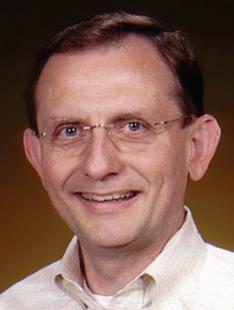 Jim Nieman, Managing Editor
Rosemary Mitchell, Editorial Assistant
Teresa Callahan, Marketing and Advertising Manager
Jim Nieman, Managing Editor
Rosemary Mitchell, Editorial Assistant
Teresa Callahan, Marketing and Advertising Manager
 Scott A. Ryan, Design Consultant
Scott A. Ryan, Design Consultant
Cover image ©Lightstock
For Customer Service, phone 1-800-543-1353
All Scripture quotations, unless otherwise indicated, are taken from the HOLY BIBLE, NEW INTERNATIONAL VERSION® NIV®. Copyright ©1973, 1978, 1984, 2011 by Biblica, Inc.™
Used by permission of Zondervan. All rights reserved.
Subscription Information
One year (includes postage): $37.99 (plus sales tax in FL and WA; additional postage/handling may apply for international subscriptions). Mail your order to Christian standard 8805 Governor’s Hill Drive, Suite 400, Cincinnati, OH 45249, or phone 1-800-543-1353. The following rates are for multiple copies of Christian standard mailed to one address:
2-10 copies: $24.99 per copy per year
(Example: 2 copies = $49.98 per year)
11-20 copies: $22.99 per copy per year
21-30 copies: $21.99 per copy per year
31+ copies: $20.99 per copy per year.
Our Permission Policy
Christian standard grants permission to reproduce up to 1,000 copies of articles in this issue (excluding Seen & Heard items) for ministry or educational purposes (church newsletters, classroom or workshop handouts, etc.) with the following provisions: (1) Copied material must be distributed free of charge. (2) The following credit line must appear on each copy: “This article first appeared in Christian standard on [date].”
Letters to the Editor
Letters regarding the contents of the magazine will be considered for publication in “Readers Write” unless specifically marked “not for publication.” Published letters may be shortened to meet editorial requirements. Letters must be signed, but names will be withheld upon request.
Freelance Submissions
We accept freelance submissions, double-spaced, typed on one side of the page only. Include a self-addressed stamped envelope (SASE) for return of unused manuscripts. E-mail Microsoft Word attachments to address below.
Volume CLII. Number 3. Christian standard (ISSN 0009-5656) is published monthly by Christian Standard Media at 8805 Governor’s Hill Drive, Suite 400, Cincinnati, OH 45249. Periodicals postage paid at Cincinnati, OH, and additional offices. Printed in U.S.A. Postmaster: Send address changes to Christian Standard Media, 8805 Governor’s Hill Drive, Suite 400, Cincinnati, OH 45249. Phone: 1-800-543-1301 or 1-513-931-4050. Subscribers: Send address changes to Christian standard, 8805 Governor’s Hill Drive, Suite 400, Cincinnati, OH 45249. Send old and new addresses, complete with zip numbers, at least six weeks before delivery date. This publication is available in microform from UMI; call 800-521-0600. Christian standard is published by Christian Standard Media, www.christianstandardmedia.com.
Copyright ©2017 by Christian Standard Media. E-mail: christianstandard@christianstandardmedia.com
Website: christianstandard.com

FROM THE EDITOR
Leonard Wymore
BY MARK A. TAYLOR
It’s fair to say the passing of Leonard Wymore represents another marker in the end of an era (see p. 9).
Known by many as Mr. North American, Leonard had his finger on the pulse of Christian churches and churches of Christ as perhaps no one else. He traveled widely. He heard and encouraged preachers in churches small and large across the heartland. He passionately promoted unity and church growth in a fellowship of churches characterized by fracture and stagnation during many of the years he served.
Everyone knew Leonard. And all of them loved him for his listening ear, ready smile, and unfailing energy. His influence among us was without equal.
I first met Leonard as he managed preparations for the 1976 NACC that would meet in Denver, Colorado. I was education minister at First Christian Church in Longmont, Colorado, and our senior minister, Dale McCann, was the convention’s local arrangements chairman.
I was young, without many accomplishments, unknown and unimportant. But, from Day One, Leonard treated me like an equal. When he learned I would move to Cincinnati to be editor of The Lookout, a position he himself had held, our bond grew closer.
Those were different days, to be sure. Institutional loyalty in every aspect of American life was only beginning to erode, and institutions among Christian churches and churches of Christ were strong. These congregations found their preachers solely among graduates of “loyal” Bible colleges. They went to “their publisher,” Standard Publishing, for every kind of “true to the Bible” resources. Those colleges and Standard and the NACC were the glue that held together our nondenominational fellowship.
Times are different now. A changing culture, a revolution in communications technology, and—perhaps most significant—the demise of denominationalism have combined to challenge leaders of institutions serving our group to rethink their methods if not their mission. All of that is fodder for discussion in another place.
But here we remember a hero of our fellowship, a friend and leader who helped keep us strong at a time different from today. Those who knew him, especially the Christian leaders fortunate to work beside him, will never forget Leonard Wymore.
About This Issue
We’re sending this issue to the printer on Wednesday, February 1, after a weekend of turmoil in the United States surrounding the issue of immigration.
As we do so, we want to make clear that this is not a reaction to that specific set of events. All of our 2017 cover themes were set more than a year ago. The content for this issue was assigned last October, before the November election.
Was God at work in that process, bringing this biblical teaching when American Christians needed it most? We make no claim on God’s providence. But we do stand by this content as a thoughtful examination of biblical precedent and an encouraging report of Christian ministry in a day when immigration is on the minds of many.
Mark Taylor posts every Tuesday at christianstandard.com.
MARCH 2017 1
Founded 1866 by Isaac Errett
Devoted to the restoration of New Testament Christianity, its doctrine, its ordinances, and its fruits.
PUBLISHING COMMITTEE
(Established 1956 by the National Christian Education Convention for liaison with the management and editorial department of Standard Publishing)

Steve Wyatt
Chairman, Phoenix, Arizona
Clark H. Tanner Vice Chairman, Wichita, Kansas
Marshall W. Hayden Secretary, Worthington, Ohio
Alan Ahlgrim Longmont, Colorado
Dennis Bratton Gallatin, Tennessee
Aaron Brockett
Indianapolis, Indiana
Ben Cachiaras Joppa, Maryland
T. C. Huxford
Savannah, Georgia
E. LeRoy Lawson Johnson City, Tennessee
Eddie Lowen Springfield, Illinois
CONTRIBUTING EDITORS
Pat Magness
Milligan College, Tennessee
Steve Moore Meridian, Idaho
Dudley Rutherford Porter Ranch, California
Dave Stone Louisville, Kentucky
Teresa Welch Joplin, Missouri
Contributing editors help define the focus of Christian standard, identify issues facing volunteer leaders and staff members in churches we serve, and suggest future themes. They periodically write for the magazine and regularly consult, advise, and react to the editors regarding past and future content in the magazine.
Becky Ahlberg Anaheim, California
Ben Cachiaras Joppa, Maryland
Arron Chambers Greeley, Colorado
Glen Elliott Tucson, Arizona
Jeff Faull Mooresville, Indiana
Phyllis Fox Milligan College, Tennessee
Randy Gariss Joplin, Missouri
Jennifer Johnson
Levittown, Pennsylvania
Doug Priest
Indianapolis, Indiana
Matt Proctor Joplin, Missouri
Jim Tune Toronto, Ontario
2 CHRISTIAN STANDARD
By Kevin Lines
Kevin Lines

 By Bethany Anderson
By Gayla Congdon
By Kevin Dooley
By Bethany Anderson
By Gayla Congdon
By Kevin Dooley
 Horey
Horey
12 What Does the Bible Say? Immigration and refugees in Scripture.
16 What You Can Do There are many opportunities to help immigrants. By
Lines 18 Questions and Answers about Refugees and Resettlement Laying out the facts—national and international.
21 Close to God’s Heart A Christian law practice helping immigrants.
23 Welcoming the Stranger “Love them as yourself. . . .”
THIS MONTH
Kevin
By
25 Taxi Drivers, Refugees, and Other Good Reasons to Pray Taxis are opening doors to a refugee population.
28 A Christian Perspective on Immigration A conversation with attorney Land Wayland. By Justin
30 My Refugee Friends Befriending an Iraqi couple in Louisville. By Kelsey
32 The New Diaspora Evangelistic opportunities are multiplying. By Doug Priest 35–43 Our Ministry to Refugees Leaders write about local church efforts in Indiana, Arizona, Maryland, Kentucky, and Illinois. Website : christianstandard.com E-mail: christianstandard @christianstandardmedia.com Subscriptions/Customer Service: 1-800-543-1353 16 25 35 EVERY MONTH Your Church 51 Ministry Today — Many women are feeling devalued. 60 Best Practices — How social media is hurting your ministry. Notable & Quotable 1 From the Editor — Remembering Leonard Wymore. 6 4C’s — Milligan, Stadia partner to promote church planting. 10 Seen and Heard — “Embracing” struggles = mental health. 48 At His Table — Surveying the wondrous cross. 50 From My Bookshelf — Good funerals, good neighbors. 53 Culture Watch — What struggling retail means for churches. 55 Preaching — Leaders tell about a sermon they can’t forget. 56 In Opinions, Liberty — Identifying with society’s outcasts. 64 A Different Tune — Job’s suffering is an example for Christians. RESOURCING CHRISTIAN LEADERS ® MARCH 2017 3 CONTENTS MARCH 2017 Volume 152 Number 3
McKain
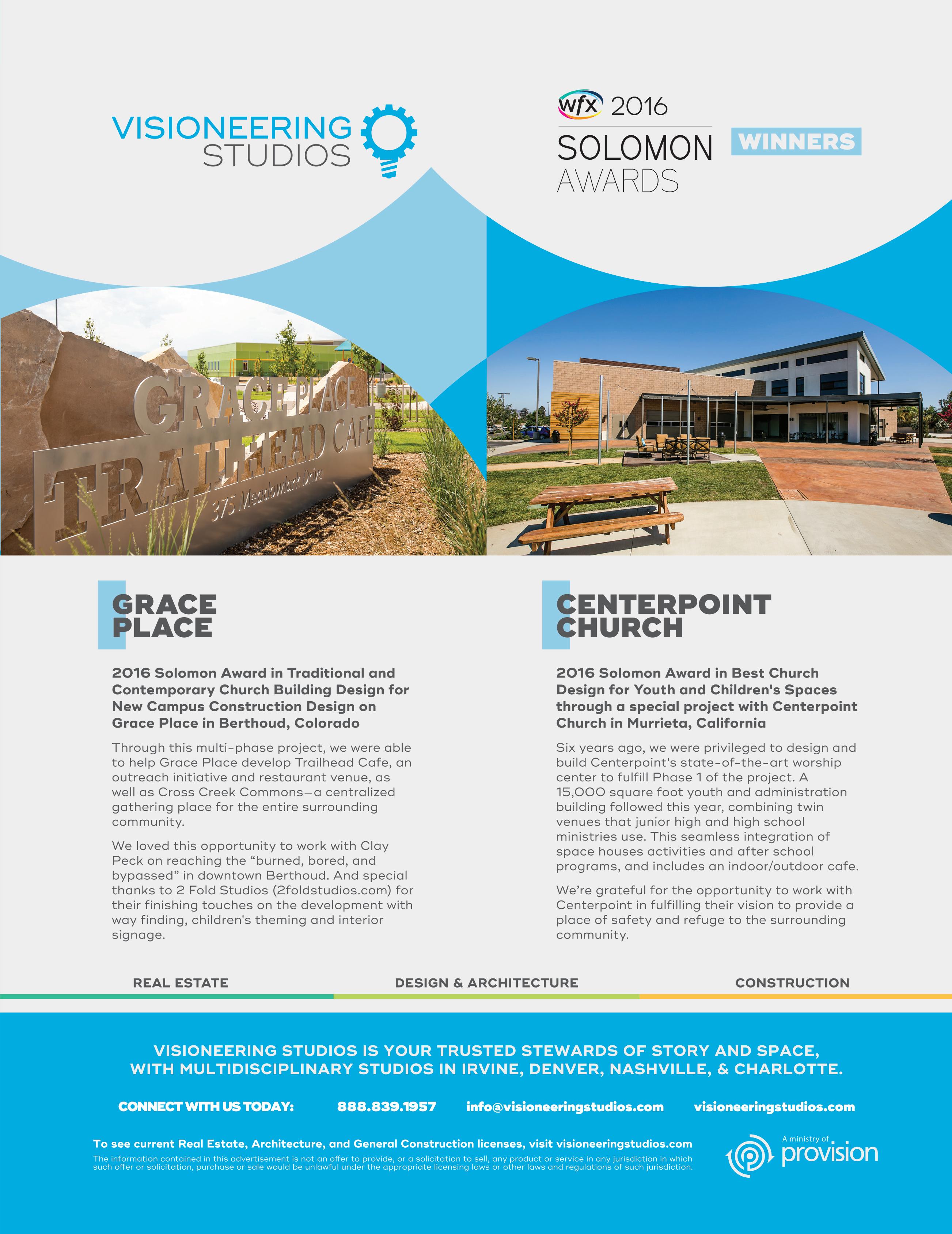

FOUR
C’s
Christian Churches & Churches of Christ
Milligan, Stadia Partner Together
Milligan College and Stadia recently announced they have partnered to raise awareness of church planting and further the mission of both institutions. The new partnership was announced in December during a “Church Planting Emphasis Week” at Milligan College and Emmanuel Christian Seminary in Tennessee. The partnership opens a variety of opportunities for both organizations, including theological training for church planters at Milligan/Emmanuel, Stadiadeveloped church planting courses for students, new internship
opportunities for Milligan and Emmanuel students at church plants, and Stadia speakers for Milligan’s Youth in Ministry Student Leadership Conference
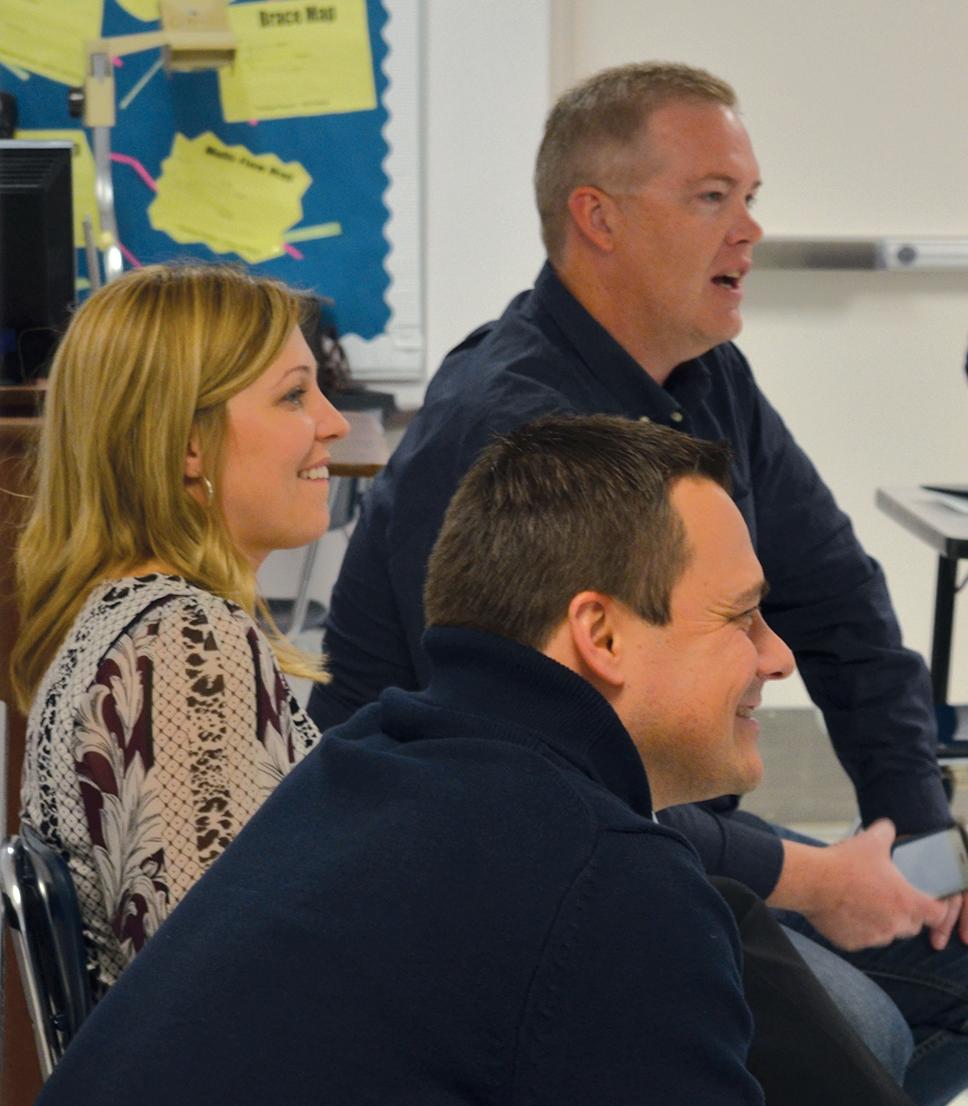
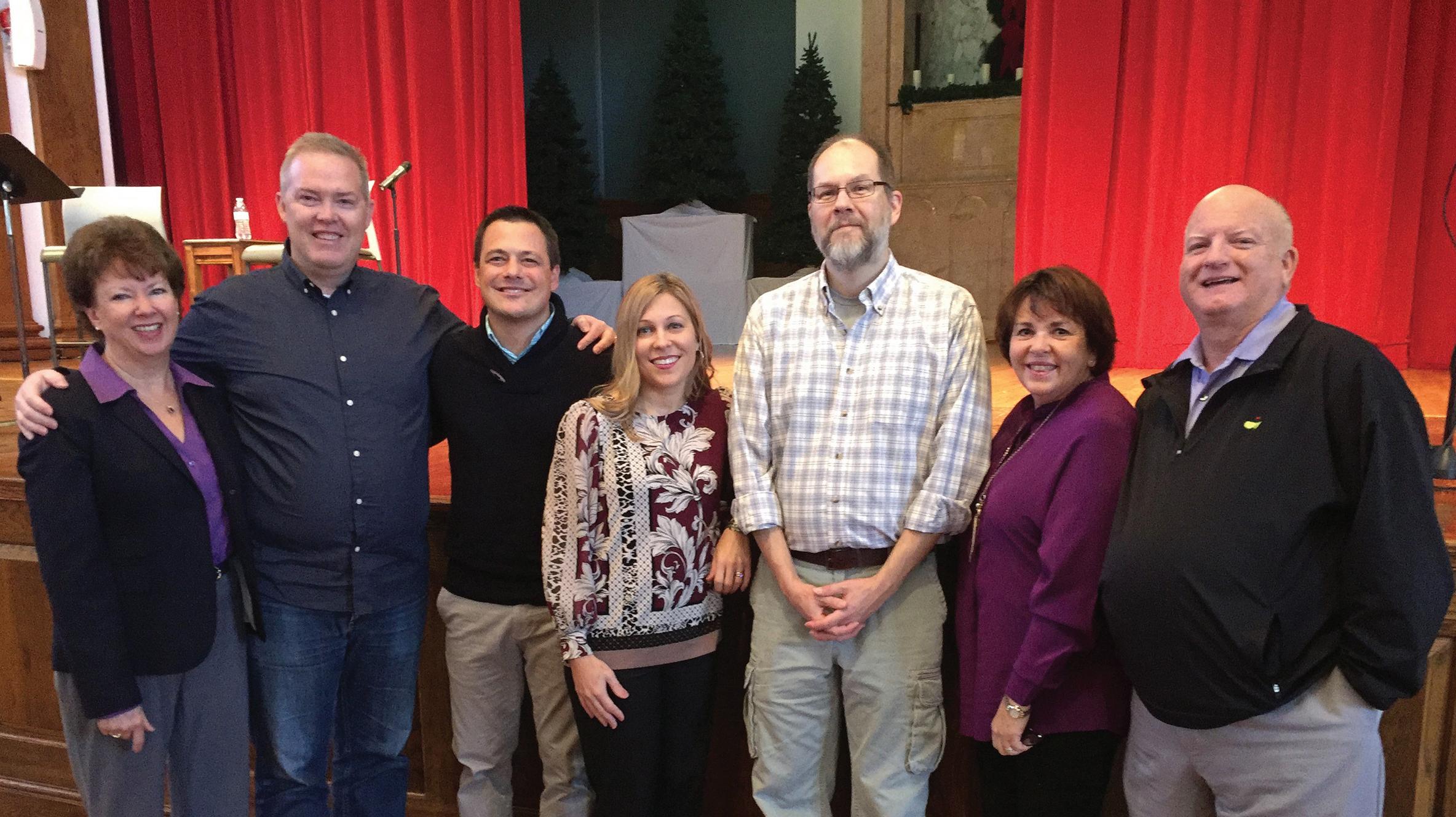
Phyllis Fox, who served as director of church relations and director of the Youth in Ministry program at Milligan, “pitched” the idea and now serves as director of marketing for Stadia.
“When I was at Milligan, I got to know so many high school and college students who were ready to do something for the kingdom and had the gifts to be effective church planters,” Fox says. “But
6 CHRISTIAN
STANDARD
Some of the principals participating in “Church Planting Emphasis Week” at Milligan College were (from left): Phyllis Fox, director of marketing, Stadia; Justin Moxley, planter development executive, Stadia; Jason Lantz, vision leader, RiverTree Christian Church, northeastern Ohio; Suzi Lantz, Jackson (OH) GoCommunity champion with RiverTree Christian Church; Brad Wallace, campus minister, Milligan College; Debbie Jones, director of Bloom, Stadia; and Tom Jones, executive director, Stadia.
Justin Moxley of Stadia (top), along with Jason and Suzi Lantz of RiverTree Christian Church answer questions during a youth ministry class at Milligan College.
they needed coaching and encouragement. At the same time, Stadia has the financial resources to plant churches, but they’re always looking for gifted planters and leaders. It made sense to work together.”
The partnership also offers planters the opportunity to get the biblical and theological education they need for effective ministry.
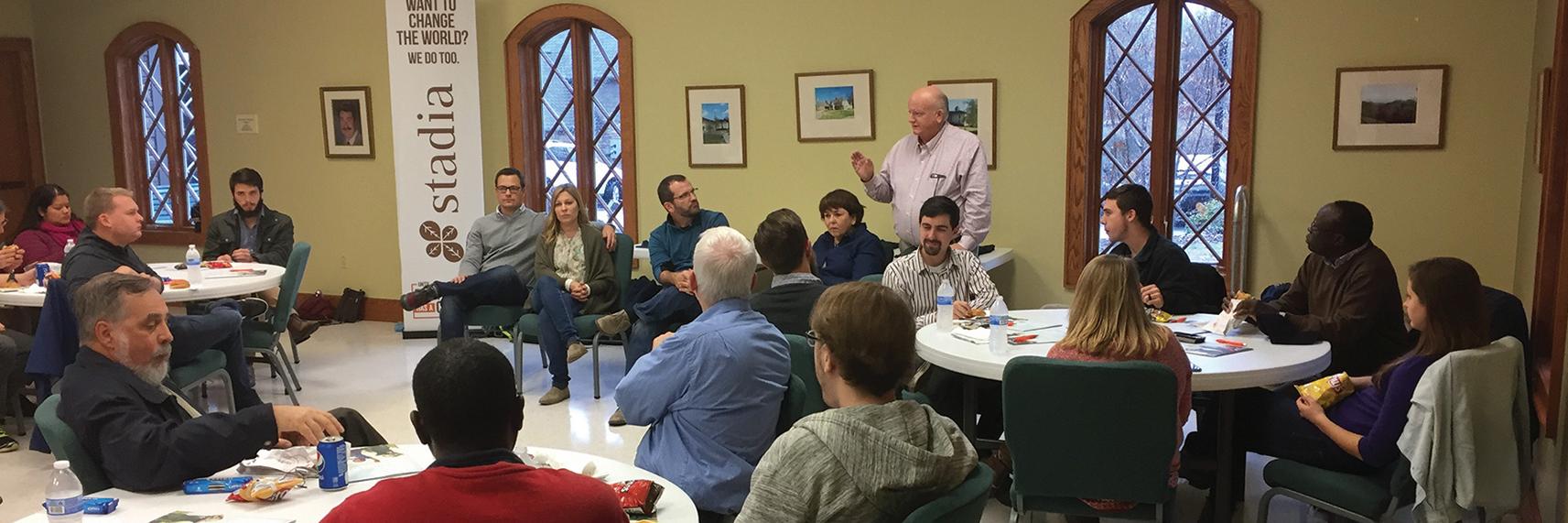
“Often when planters are trying to get the church going, they don’t have time for seminary, but once things are established, they’re ready and they’re hungry,” Fox says. “They begin to realize their well is not deep enough for the demands of weekly preaching and long-term ministry. Emmanuel’s programs, especially the online Master of Christian Ministries, is a great option.”
Future plans for the partnership include online affinity groups for both graduate and undergraduate students who are interested in church planting, and Tom Jones, executive director of Stadia, will offer classes in church planting. The organizations also plan to offer academic credit for students and potential planters who work through the Church Planting Assessment Center currently held on campus a few times a year.
www.milligan.edu
www.stadia.cc
—Jennifer Johnson
Basic Training My Take
A few years ago I wrote a proposal for an online initiative that would provide customizable resources for churches wanting to develop their pastors, worship leaders, campus ministers, church planters, elders, and key volunteers. I suggested an online portal with everything from 101 to seminary-level books, articles, podcasts, and videos, as well as suggested “tracks” with curated lists of resources for specific groups. I referred to research from the Barna Group and Ed Stetzer as well as insights from the leaders of Orchard Group, Stadia, and some of our megachurches to support my argument.
It was summarily dismissed. But I still believe the need exists.
For one thing, many denominations have created their own training programs not only for ministerial staff but for elders and other volunteer leaders. A friend of mine had to work through a five-year program of classes, research, and papers simply to be an elder in the United Methodist Church. I’m not saying all of our elders need five years of course work, but perhaps they do need some qualification besides running a business that makes seven figures.
to the impressionable among us that training is unnecessary. Combined with a growing anti-intellectualism, this degradation of training—whether by formal education or field experience—is becoming incredibly dangerous. Handling God’s Word in a church ministry context is something that requires some skill, skill that is conveyed through training.”

Not every church leader can go to seminary, but all of them can read, listen, and learn, especially when the very best resources are pulled together and presented to them online.
By Jennifer Johnson
And some of our largest ministries are already making strides in this area. I loved hearing that Stadia and Milligan’s partnership was driven not only by a desire to recruit new church planters, but to better equip the ones already serving. Several of our megachurches are also exploring new ways to train new leaders. Some, like Christ’s Church of the Valley’s Leadership Institute in Peoria, Arizona, are even working with colleges and universities to create programs that offer college credit.
I’m also not the only one talking about these issues. “In our country today, more than ever, we have people entering full-time ministry with absolutely no formal training,” says David Helm, executive director of The Simeon Trust, which provides a variety of classroom and residential learning opportunities for church leaders. “And while I think there is nothing magical about ‘formal’ training in the sense of a seminary degree, this trend often implies
Larger churches looking “in house” or to the marketplace for new pastors and planters need to make sure these emerging leaders know the fundamentals of theology, church history, Bible, and practical ministry. Smaller churches building an elder team or starting a new ministry need practical resources that are easy to share. All of us need ways to equip the faithful leaders we already have.
Perhaps it’s time to share my proposal with a few more people. Milligan? Stadia? Call me.
MARCH 2017 7
Stadia and Milligan College partnered to host the first “Church Planting Emphasis Week” Nov. 28—Dec. 2.
Focusing on Discipleship
You may know Exponential as the premier conference for church planting, but you may not know that a similar event exists for leaders focused on discipleship—and that some of the same people are behind both.
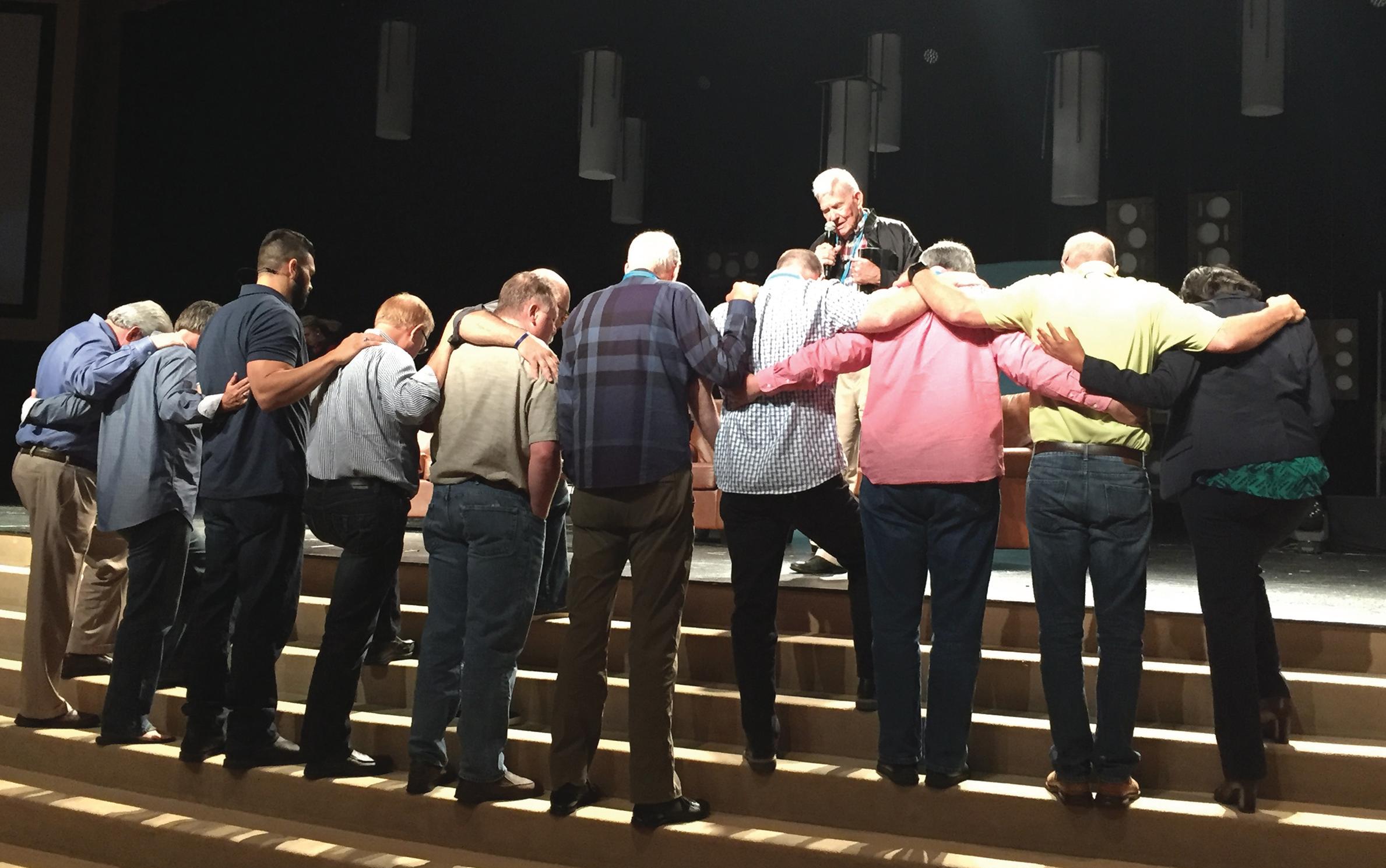
Todd Wilson, founder and director of Exponential, and Bobby Harrington, lead pastor at Harpeth Christian Church in Franklin, TN, launched the National Disciple Making Forum in 2014 at Saddleback Church in Southern California as a way for disciple-making leaders around the country to learn, pray, worship, and grow together.
“I wasn’t sure if I wanted to take this on, honestly,” Harrington says. “But when
Todd committed to help me, I said OK. We felt the time was right and we envisioned the event as more of a forum than a conference—we thought people would be more interested in a conversation than in just listening to speakers.”
Today, many of the key leaders, pastors, and authors who are thinking and writing about discipleship are part of the annual gathering. Last October’s event in Nashville, TN, included Jim Putman, Robby Gallaty, Randy Pope, Bill Hull, Robert Coleman, Dann Spader, and others. Wilson and Harrington also provide the discipleship tracks and discipleship pre-conference at the Exponential East and West conferences.
“We’re also creating books and other resources, because we see this as a movement, and movements need definitions, resources, and frameworks,” Harrington says. In addition to his books, DiscipleShift (written with Jim Putman), Dedicated: Training Your Children to Trust and Follow Jesus (written with Jason Houser and Chad Harrington), The Disciple-Maker’s Handbook (written with Josh Patrick), and Discipleship that Fits: The Five Kinds of Relationships God Uses to Help Us Grow (written with Alex Absalom), the Discipleship.org website also includes books from others as well as a blog, a podcast, and digital access to sessions from previous forums.
Harrington and his team are releasing an online assessment tool through Discipleship.org so people can determine where they are currently as a disciple maker and discover areas of potential growth.
“Although we intentionally involve many leaders from a variety of denominational backgrounds, the National Disciple Making Forum—like Exponential—is rooted in the Restoration Movement,” Harrington says. “After all, our movement at its best is a call to follow the lordship of Jesus according to Scripture, and that’s what being a disciple who makes disciples is all about.”
www.discipleship.org
—Jennifer Johnson
8 CHRISTIAN STANDARD
Robert Coleman of Gordon-Conwell Theological Seminary, South Hamilton, MA, prays for 11 leaders and their organizations at the National Disciple Making Forum.
Passages
n Leonard Ginther Wymore, 95, who served as director of the North American Christian Convention for 23 years (1963–86), died Jan. 19, 2017, in Johnson City, TN. He was born in Bartley, NE. After graduation from Manhattan (KS) Christian College and attending Butler University School of Religion in Indianapolis, IN, he served small congregations in Kansas and Indiana. He served with Standard Publishing from 1956–63 as editor of The Lookout magazine (October 1956—December 1957) and director of the National Christian Education Convention (starting in 1956). As NACC director, beginning in 1963, he sought to fulfill a vision for resounding preaching services and valuable training sessions for kingdom workers. In 1972, he led in the founding of the Religious Conference Management Association. He was honored with a Doctor of Laws from Kentucky Christian University in 1968 and the James A. Garfield Award from Emmanuel Christian Seminary in 1990 for recognition of his outstanding service and leadership to the Christian community. He continued to serve during “retirement,” directing Double Vision and
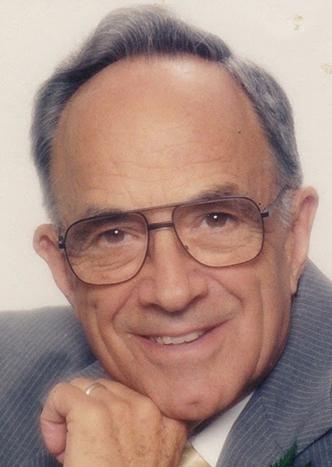
the Arizona Evangelizing Association, serving as an interim minister, writing, and consulting. He is survived by his wife of 71 years, Thelma (Haas); one daughter, Kathy Downs; two sons, Don and Fred; five grandchildren; and five greatgrandchildren. Condolences may be sent to Thelma Wymore, 2012 Sherwood Drive #512, Johnson City, TN 37601. A memorial service was held at Hopwood Christian Church at Milligan College. Memorial gifts may be made to the Leonard & Thelma Wymore Scholarship Fund at Emmanuel Christian Seminary at Milligan College.
n William Breckenridge Gulick, 86, of Mason, OH, died Dec. 21, 2016. He was abandoned as a baby in Covington, KY, on Sept. 15, 1930, and taken in by Fred and Betty Gulick. He lived in Covington until age 12. He lived with several families in Cincinnati, OH, until graduation from high school. He graduated from Cincinnati Bible Seminary in 1951. In 1949, he married Ethel. In 1951, they were called to serve God in India. Together they founded the Christ Nagar Institute (a hostel for boys) and started the Ennore Church of Christ, which subsequently helped start many more churches. Upon returning from India in 1973, he taught classes at Cincinnati Bible Seminary. He preached at
many Ohio and Kentucky churches. In 1983, the couple moved to Virginia, where he preached at Tri-City Church of Christ for 12 years. In 2015, the couple relocated to the Christian Village at Mason (OH).
n Reggie Hundley has been named the new chief executive officer/administrator for Christian Churches Pension Plan (CCPP), a nonprofit defined benefit retirement plan with 1,900 subscribers and $36 million in assets. His selection by CCPP’s Board of Governors will be effective June 30. Hundley will succeed Ray Stites, who has overseen the Kansas City, KS-based organization since 1999. Hundley has served on CCPP’s Board of Governors since 1998 and on the Executive Committee since 2002. Hundley has served as executive director of Mission Services, a global missions support organization based in Knoxville, TN, since 1996.
n Richard D. Robinson, 81, of Wyoming, MI, died Dec. 4, 2016, after a debilitating illness. He graduated from Nebraska Christian College and completed postgraduate work at Lincoln (IL) Christian College. He held ministries in Tampico, IL, and Greenview (IL) Christian Church, before serving with Woodview Christian Church, Wyoming, MI, for 34 years. He is survived by his wife of 60 years (and partner in ministry), Jeannette, as well as three sons, one brother, one sister, seven grandchildren, and three great-grandchildren. Services were held Dec. 10 at Woodview Christian Church.
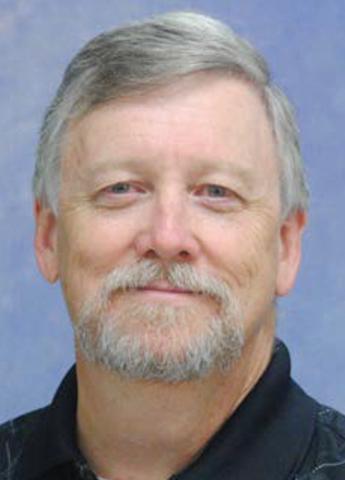
(Lengthier obituaries are available at christianstandard.com.)

Media Matters
n Arron Chambers’s new blog, Extraordinary Marriages for Ordinary People, features practical tools and helpful insights to grow your marriage. Go to https://arronc.wordpress.com/.
n Open Church is a new website full of free resources and a directory of causes to help Christians work together. Go to www.openchurch.com.
MARCH 2017 9
“So . . . you want me to do a search for the latest, cutting-edge Sunday school curriculum . . . that’s available on VHS.”
BY SIMON J. DAHLMAN
Professor of Communications Milligan College, Tennessee
Criminal Minds
“The most dangerous criminal may be the man gifted with reason, but with no morals.”
2015 Facts By the Numbers
“Each person must live their life as a model for others.”
Doubt for Your Mental Health
It’s tempting to think that confronting spiritual doubts or the “big questions” of life would lead to more fear or depression. In fact, a recent study found the opposite is true: People who “embrace” their struggles with fundamental beliefs and values report better mental health.
By contrast, avoiding or fearing those big questions were linked with poorer mental health, including higher levels of depression, anxiety and difficulty regulating emotions.


“Religious and spiritual struggles—conflicts with God or religious people, tough questions about faith, morality, and the meaning of life—these are often taboo topics, and the temptation to push them away is strong,” according to Julie Exline, a professor of psychological sciences at Case Western Reserve and a coauthor of the research.
“When people avoid these struggles, anxiety and depression tend to be more intense than
if they faced these struggles head-on.” Besides that, trying to push away doubts or questions will not keep them from continuing to intrude over time. “Continually being revisited by these thoughts can create strains on emotional health,” Exline says, “especially if a person sees this kind of questioning as morally unacceptable and dangerous.”
C.K.O. Dworsky, J.J. Exline, et al., “Suppressing spiritual struggles: The role of experiential avoidance in mental health,” Journal of Contextual Behavioral Science, October 2016
2 percent: Total charitable giving, as percentage of U.S. gross domestic product (GDP).
$265 billion: Charitable donations in the U.S. by individuals—about 71 percent of all charitable giving.
$2,974: Average annual household charitable donation.
9 percent: Increase of online giving in one year.
2 percent: Increase in overall giving in one year.
$119.3 billion: Donations in the U.S. given to religious organizations—about 33 percent of all donations.
U.S. Baby Boomers (born 1945–64) donated most often to places of worship; Generation Xers and Millennials (born 1965–97) donated most often to children and youth development.
2% 63M
62.8 million: Americans who volunteered. (They worked a total of 7.9 billion hours, worth about $184 billion. People who volunteer are almost twice as likely to donate money as nonvolunteers.)
Charity Navigator (www. charitynavigator.org; 2015 figures)
10 CHRISTIAN STANDARD
—Rosa Parks (1913–2005), American civil rights activist
Martin Luther King Jr. (1929–68), American minister and civil rights leader
Clarity
“I wonder how many people I’ve looked at all my life and never seen.”
Just Do It
Quick Quiz: “Beware the Ides of March!”
Julius Caesar was assassinated on March 15, 44 BC. Another ruler’s reign ended on that infamous date as well. Who was it?
A. King Henry VIII of England died on that day in 1547.
B. Mary, Queen of Scots, abdicated on that day in 1567.

C. Pope Alexander VII died on that day in 1667.
D. Nicholas II, the last czar of Russia, abdicated on that day in 1917.
Incivility Begets Incivility
Insulting coworkers, using sarcasm to belittle them, or otherwise putting them down: Such rudeness is contagious in the workplace.
Researchers in business and psychology found that experiencing uncivil behavior increased mental fatigue among employees, which reduced their sense of self-control and led them to act in a similar, uncivil manner later in the day. These “incivility spirals” occurred unintentionally and predominantly in workplaces that were perceived as “political”—that is, places where workers do what is best for them and not best for the organization.


“Basically, incivility begets incivility,” said researcher Chris Rosen, a professor of management at the University of Arkansas.

“And our findings verify that these contagion effects occur within very short, even daily cycles.”
While disrespect is less serious than harassment or bullying, it occurs more frequently and it may even have a greater long-term economic impact.
“It’s probably costing companies a lot more money,” says Rosen. “Estimates are that workplace incivility has doubled over the past two decades and on average costs companies about $14,000 per employee annually because of loss of production and work time.”
To reduce perceptions of politics at work, the researchers suggested that managers provide clear feedback, formally or informally, to employees regarding the types of behaviors that are desired.
C. Rosen, et al., “Who strikes back? A daily investigation of when and why incivility begets incivility,” Journal of Applied Psychology, November 2016
MARCH 2017 11
“One isn’t necessarily born with courage, but one is born with potential. Without courage, we cannot practice any other virtue with consistency. We can’t be kind, true, merciful, generous, or honest.”
—Maya Angelou (1928–2014), American poet and activist
John Steinbeck
(1902–68),
American author and Nobel Prize laureate, in The Winter of Our Discontent
“There may be times when we are powerless to prevent injustice, but there must never be a time when we fail to protest.”
Elie Wiesel
(1928–2016), Romanian-American author, Holocaust survivor, and Nobel Peace Prize laureate
Answer: D. Nicholas’s abdication a century ago made way for the Bolshevik Revolution and the creation of the USSR. (The years listed for the other rulers are correct, but not the date.)
Immigration, immigrants, and refugees
What Does the Bible Say?
BY KEVIN LINES
There are more international migrants today than at any other time in history— more than 240 million. While two out of three international migrants live in Asia and Europe, the United States hosts 19 percent of international migrants, the most in the world.
It should come as no surprise that our nation, founded by immigrants and often relying on waves of new immigrants as the labor force for our economic growth, would continue to host migrants. The United States is still seen by many in the world as a land of opportunity; a place where, no matter your background, hard work can lead a person to a level of prosperity unknown in many parts of the world.
The movement of people from one place to another is a constant theme in human history and is of increasing interest to social scientists who study the rapid flow of information, goods, and people in our globalized world. And now, immigration is once again at the top of the list of political debates in both Europe and the United States.
This is nothing new. The “stranger” has often been seen as a threat to our way of life, even for those of us with migrant ancestors who were once strangers in this land.
While immigration policies and prac-
tices are easy ways to motivate people to vote for one candidate or another, there has been no major immigration reform in the United States for more than 50 years. There is no question immigration reform is needed in the United States, but as a missional Christian, my focus here isn’t on that political debate.
My position is that Christians need to respond first as Christians participating in
The Bible is filled with migration stories; stories of people being pushed or pulled from one place to another, stories of scattering.
God’s mission in the world and that the Bible can be our fundamental resource for understanding how we should treat migrants.
What does the Bible have to say about aliens and strangers?
Why I Care
Before I get to this question, let me share a bit about who I am and why I care
about migration. My ancestors immigrated to the United States from Switzerland and Germany in the 1690s. They were Anabaptists seeking religious freedom; they settled in Pennsylvania, a colony William Penn founded in 1681, specifically with religious freedoms in mind.
I grew up in Lancaster, Pennsylvania, an area still heavily influenced by Anabaptist Mennonites and Amish. I attended a public high school that was, I was surprised to find, comprised of nearly 35 percent immigrants or children of immigrants from Puerto Rico.
While attending Milligan College in Tennessee, I spent some time on a large tomato farm with migrant workers, mostly

12 CHRISTIAN STANDARD
. . .
from Mexico. This was when I first learned about the large number of migrant laborers who travel around the United States harvesting the crops we eat.
Understanding my own family’s migration for religious freedom, having friends whose families had emigrated from Puerto Rico, and meeting migrant workers were all experiences in my early life that put a human face on who migrants were.
When my wife, Katy, and I moved to Kenya as missionaries in 1999 to serve with CMF International among the Turkana church, we became the migrants and strangers. I still remember the day the Kenyan government issued me my Alien Registration Card, an ID card with
my photo and the word ALIEN written in large print at the top.
But it wasn’t until returning to the United States that Katy and I began to realize all the missed mission opportunities in our own country. With increasing migration, the world has come to us!
During our years in Lexington, Kentucky, we became involved in assisting newly arrived refugees through Kentucky Refugee Ministries, and I began to wonder more about what the Bible says about aliens and strangers.

Stories of Scattering
I reread the Bible through the lens of aliens and strangers and recognized two
main themes. The first is that the Bible itself is filled with migration stories; stories of people being pushed or pulled from one place to another, stories of scattering. I found in these stories that God was working in and through the people being pushed, pulled, and scattered. The second theme is that God loves and watches over the “alien.”
The Bible is filled with migration stories of both push and pull. Even God is sometimes depicted as the actor in causing the migration:
• Adam and Eve were forced out of the Garden of Eden.
MARCH 2017 13 Continued on next page
©Lightstock
WHAT DOES THE BIBLE SAY?
Continued from previous page
• Cain was condemned to wander for murdering his brother Abel.
• The builders of the Tower of Babel were scattered.
• Abraham was pulled out of Ur and is described as a “wandering Aramean” (Deuteronomy 26:5).
• Because of lack of food, Abraham, Isaac, and Jacob, along with their families, left their homes to settle temporarily in different places, such as Egypt (Genesis 12; 42-46), the Negev (Genesis 20), and Philistia (Genesis 26).
• Jacob fled from Esau.
• Joseph was betrayed by his brothers and sold into slavery.
• Moses fled Egypt after committing murder.
• Naomi and her family left Bethlehem because of famine and emigrated across the Jordan River to Moab, then back to Bethlehem with Ruth.
• Israel was scattered by an empire.
• Israel was pushed into exile by another empire.
• Daniel and his friends were living in Babylon.
• Some people of Judah were allowed to return to their homeland by the ruler of an empire.
• Samaria developed a people with hybrid identity.
• The Greeks migrated for trade.
• The Romans migrated for conquest.
• The Jews were in diaspora.
• Through persecution, the early church was also in diaspora.
• Jesus lived his life as a subject of an empire.
• Jesus, as a child, escaped political oppression in Jerusalem and became a refugee to Egypt; later, he and his family emigrated back to his father’s home.
• Priscilla and Aquila emigrated from Rome to Corinth and then to Ephesus.
Just as we find today, there were various reasons for migration in the Bible. Many of these migrants would be classified as refugees today, escaping terrible situations and seeking safety, food, and shelter; others were involuntarily deported after Israel was defeated in war. Some of these migrations were the result of sin and rebellion; some were caused by war and famine. Some of these migrants were willing, while others were taken involuntarily.
Yet, through these movements of people, God was writing a story of redemption and reconciliation to be heard
throughout the world. What the people of God experienced in the Bible was similar to what migrants experience today, and can provide important lessons for us concerning migration.
Considering the Foreigner
The most common translations of the words used in the Bible related to migration include “alien,” “resident alien,” “foreigner,” “stranger,” and “sojourner.” In the Old Testament, these words are translations of the Hebrew nouns nekar and ger, and the adjectives nokri and zar. The most important of these terms is ger, used 92 times.
Dr. J. Blair Wilgus, associate professor of Old Testament at Hope International University, Fullerton, California, explains that generally, a ger is “a person who takes up residence in a country that is not their own; a foreigner.” A ger could be someone who settled down on either a short-term
and religious life of Israel (Exodus 20:811; 12:48, 49; Leviticus 16:29, 30; Deuteronomy 16:11, 14)
What could possibly be the motivation for laws that seek to protect the “alien” in the Old Testament? One motivation was explicit: God loves and watches over the ger (Deuteronomy 10:14-19; Psalm 146:69).
If that weren’t motivation enough, God repeatedly reminded the people of Israel that they themselves were once “aliens and strangers” in Egypt; that they should understand what it meant to live as despised foreigners. Because God had brought Israel out of Egypt, they were to be gracious to the ger in their midst. Some of these ger even came with them out of Egypt (Exodus 12:38).
The treatment of the ger would be a measure of their faith in God (Leviticus 19:34; Exodus 23:9). In fact, God reminded Israel that they themselves were “but aliens and tenants” living in God’s land (Leviticus 25:23, New Revised Standard Version).
We and Jesus Are Aliens
or permanent basis.
It fascinates me that the people of God are instructed to interact with the ger. These ger, the foreigners living among God’s people, were seen as vulnerable and are often listed in laws related to the ways widows and orphans were to be treated. The ger could easily be overworked, underpaid, or not paid at all. God’s law responded to this:
The ger qualified, along with the widow, orphan, and the poor, for gleaning privileges at harvest time (Leviticus 19:10; Deuteronomy 24:19-22; Ruth 2, 3) and the triennial tithe (Deuteronomy 14:28, 29).
The ger were to be granted rest on the Sabbath with everyone else (Exodus 20:10; Deuteronomy 5:14).
The ger were to be paid a fair wage on time (Deuteronomy 24:14, 15).
The ger were to receive equal treatment before the law (Deuteronomy 1:16, 17; 27:19).
Opposition and violence toward the ger were condemned by God through the prophets (Jeremiah 7:5-7; 22:2-5; Malachi 3:5).
The ger could take part in the rituals
In the New Testament we do not find direct teachings on the ways “aliens” should be treated when living among God’s people. Yet, what we do find in the life and teaching of Jesus and in the Epistles is relevant to the question of how we are to relate to the “strangers” living among us.
First, we note that Jesus and his family were refugees; they fled to Egypt so Jesus could escape Herod. Though Jesus never directly mentioned this later, being a migrant was part of his life from the very beginning. We also see the ways Jesus treated the outsider and the stranger during his ministry.
Jesus regularly spent time with those who were seen as strangers or were despised by others. Prime examples were his interactions with Samaritans, people who were hated by the Jews. Samaritans were not only seen as ethnically different, but were people with religious traditions that were unacceptable to Jewish law and tradition.
In John 4, Jesus spoke with a Samaritan woman. When she understood whom she was speaking with, Jesus sent her to town to be his witness.
In Luke 10, in response to the question, “Who is my neighbor?” Jesus made a Samaritan, the ethnic and religious for-
14 CHRISTIAN STANDARD
Jesus and his family were refugees; they fled to Egypt so Jesus could escape Herod.
eigner, the example of right action. Dr. Carl Toney, associate professor of New Testament at Hope International University, explained: “Jesus’ actions and teachings often followed this pattern of reaching out to aliens and strangers, whether women, Gentiles, lepers, or sinners, with the good news that they are part of the kingdom of God.”
The New Testament letters make it clear that all followers of Jesus are “aliens” and “strangers” in a spiritual sense (1 Peter 1:1; 2:11). Our true citizenship is found in the kingdom of God rather than this world (Philippians 3:20; Hebrews 13:14). Hospitality toward both fellow believers and those who are unknown is seen as virtuous (Romans 12:13; Hebrews 13:2; 1 Peter 4:9). In fact, hospitality is considered such an important Christian virtue that it is listed among the characteristics required for church leaders (1 Timothy 3:2; Titus 1:8).
Reading the Bible with an eye toward aliens and strangers reminds us that God loves all people—even migrants; that migration is a regular part of the human story—even in the Bible; and that the Old Testament law directed God’s people to welcome, protect, and assist those who were vulnerable. Jesus reminds us to reach out and minister to those who are at the margins of society, and the New Testament letters call us all to be hospitable toward strangers and aliens.
As we seek a biblical response to migrants in our communities, we must remember that not all immigrants are illegal, and that many undocumented immigrants are in need of compassion from Christians. Christians must resist tendencies to condemn migrants and their desire to relocate.
If being a missional Christian means reaching out to all people in our communities, with missional justice together with evangelism, we must remember the ways we were once far off from God as aliens and strangers, hold true to the ways we live as resident aliens (1 Peter 2:11), and witness to the ways we have been made citizens of God’s household (Ephesians 2:19).
Dr. Kip Lines serves as professor of intercultural studies at Hope International University, Fullerton, California. He will become executive director with Christian Missionary Fellowship International, Indianapolis, Indiana, this June.
Defining Terms
Some assume that all people who come to the United States from another country are either here illegally or have only a temporary visa. The following list explains the various categories and statuses of immigrants in the world.
Migrant (immigrant, emigrant): This general term is applied to any person who lives temporarily or permanently in a country where he or she was not born. An immigrant is someone moving into a country; an emigrant is someone moving out of a country. There are an estimated 244 million international migrants worldwide; 42 million live in the United States.
Alien: This legal term applies to any foreigner, especially one who is not a naturalized citizen of the country where he or she is living. Aliens can have some form of legal status if documented with a particular temporary visa (tourist, business, worker, student, refugee) or if they have been granted legal permanent resident status, documented by a permanent resident card, colloquially called a “green card.”
Undocumented/illegal alien: Of the 42 million aliens in the United States, 10.9 million are undocumented or illegal. Half of all undocumented aliens in the United States originally entered as documented. (In other words, these aliens initially had a legal temporary visa, but the visa has expired and the aliens are now here illegally.) The number of undocumented/ illegal aliens in the United States has been declining for a decade, according to the Center for Migration Studies.
Legal permanent resident (green card holders): This term applies to foreign nationals who have been granted the right to reside permanently and work in the United States. Nearly 1 million aliens were accepted as legal permanent residents in the
United States in 2016.
Decisions are prioritized based on family sponsorship, a job offer from a U.S. employer, humanitarian reasons, and selection via a green card lottery. A total of 55,000 green cards are reserved for the lottery, known as the Diversity Visa program.
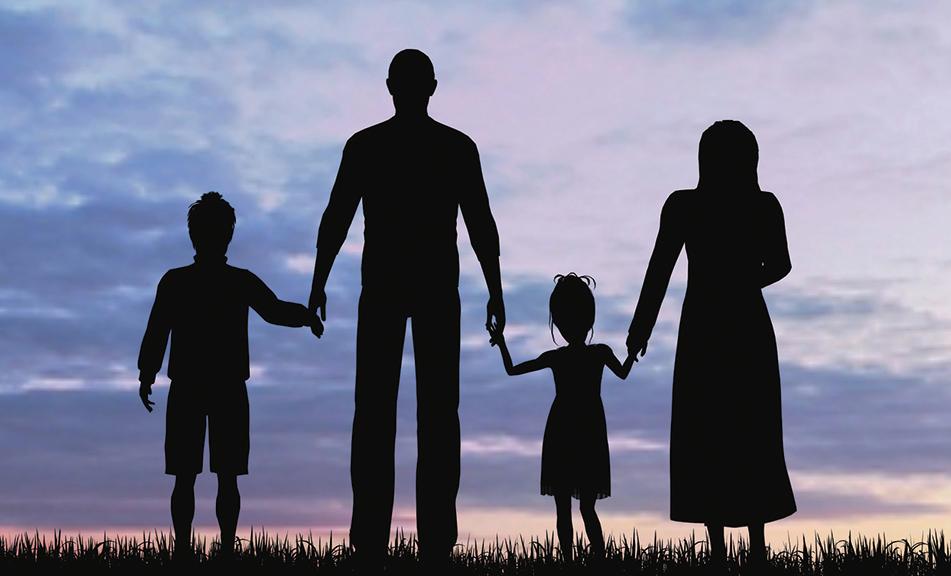
There are 15 million green card holders in the United States; more than 8 million are eligible for naturalization (the process to become a U.S. citizen).
Refugee: This term applies to those who have been forced to migrate and seek asylum in a new land, either by their own efforts or by the intervention of international agencies (such as the United Nations High Commission for Refugees).
There are 21.3 million refugees worldwide. Refugees are men, women, and children who are fleeing war, persecution, and/or political upheaval. They are uprooted with little warning and endure great hardship during their flight. They become refugees when they cross borders and seek safety in another country.
In the United States, the president and Congress agree each year to a limited total number of refugees who will be accepted into the country from specific areas of the world. The total number allowed for 2017 is 110,000 refugees.
Internally displaced person (IDP): This term applies to people who migrate and leave their homes for the same reasons as refugees, but who remain within their national boundaries; there are 44 million worldwide.
Remittances: This term applies to transfers of money by a foreign worker to an individual in his or her home country. Money sent home by migrants competes with international aid as one of the largest financial inflows to developing countries. There were approximately $60 billion in remittances sent from the United States in 2016.
—K.L.
MARCH 2017 15
©iStock/Thinkstock
Interested in helping immigrants? Choose from many possibilities and opportunities.

What You Can Do
16 CHRISTIAN STANDARD
©Lightstock
BY KEVIN LINES
American communities today contain more migrants than ever before. The ends of the earth have come to us! You and your church can reach out to the immigrants living close to you.
Within our fellowship of churches, multiple organizations have joined together to form the RISE (Refugee and International Student Engagement) Project. If you are interested in starting a ministry to refugees or international students through your church, the RISE Project website (www.theriseproject.com) has great resources and training materials. Your church can even apply for a grant to help start a new ministry!
Volunteer
If you’re not ready to start a ministry, you can still volunteer in various ways.
A good first step is to find a local agency that helps resettle refugees in your area. See the Office of Refugee Resettlement map at the Department of Health and Human Services’ website (www.acf.hhs.gov/orr/state-programsannual-overview). Click on the map to access a list of volunteer partner agencies for each state. Many are faith based and willing to work with churches.
These agencies are looking for volunteers to welcome refugees at the airport, provide furnishings and/or set up housing, tutor refugees in English, drive refugees to and from appointments, help them understand the public school system, and help with job interviews. Volunteers can also help refugees figure out where and how to go grocery shopping, explain how to pay bills that arrive in the mail, and help with navigating other unfamiliar things, such as public transportation.
Many churches across the United States have arranged to “adopt” a refugee family through a local resettlement agency. This allows for multiple people in the congregation to build relationships and assist the new immigrant family. Most refugees want to understand America and become Americans, but need help navigating the cultural differences.
Serve
• Host English language classes at your church.
• Ask children in your church to help provide games, toys, and school supplies for refugee children.
• Create a welcoming atmosphere at your
church. One idea is to have an international potluck where immigrants are encouraged to bring food from their own culture. Another is to invite people from different cultures to read Scripture and pray in their languages during one or more church services.
• Build relationships with an immigrant community. Refugees and other immigrants oftentimes end up in the same apartment complex. Some churches have had cookouts and worship services at those apartment buildings.
• Invite immigrant Christians to use your facilities for their church. Remember that almost 70 percent of all immigrants who enter the United States are already Christians, but because of different traditions, they can initially feel uncomfortable in American worship services.
• Reach out to international students at your local colleges and universities. The United States currently hosts more than 700,000 international students each year. More than 75 percent of these students never enter an American home during the time they are living here! Start out by inviting international students to your home for dinner. International student program offices at colleges and universities can provide information about hosting students for a meal.
• Learn more about immigration law and issues. Visit the U.S. Citizenship and Immigration Services website at www.uscis.gov.
• Be compassionate. Provide a listening ear. Be a safe person with whom people can confide. Don’t make assumptions, but seek to learn the specific situation of individual refugees.
An undocumented immigrant may have grown up in the United States and have no connection to his or her birth country. An undocumented immigrant may also be trying to go to college, a victim of domestic abuse, a victim of human trafficking, or a victim of persecution and oppression in his or her home country.
• Be a voice for immigrants—use your resources, connections, and understanding of the culture to give these folks the same advantages you would expect for yourself.
• Care for immigrants as people. Do not reduce such individuals to their immigration status. Immigrants have good and bad sides, successes and failures, and hopes and fears, just like everyone else. They need spiritual and emotional health, friendship and community, and purpose and dignity, just like everyone else.
Learn More About Immigration
The Evangelical Immigration Table (www.evangelicalimmigrationtable.org) is an organization of Evangelical Christians seeking bipartisan immigration reform and who seek to love the stranger in their communities.
Welcoming the Stranger: Justice, Compassion, & Truth in the Immigration Debate, by Matthew Soerens and Jenny Hwang (Downers Grove: IVP Books, 2009)
This is a great primer for learning about the current immigration situation and how Evangelicals should get involved in a proactive and biblical way. This easy-to-read book is designed for beginners, but is thoroughly researched and documented. It provides a solid framework for understanding immigration.
Christians at the Border: Immigration, the Church, and the Bible, by M. Daniel Carroll R. (Grand Rapids: Brazos Press, 2013)
This book (written by a professor of Old Testament at Denver Seminary) is a thorough examination of what the Bible has to say about immigration and how that relates to the current situation in the United States. It is a great tool for those who want to build their perspective based on God’s Word.
Strangers Next Door: Immigration, Migration and Mission, by J.D. Payne (Downers Grove: InterVarsity Press, 2012)
This book focuses on the intercultural ministry opportunities now available to the church. Payne presents ideas for how your church can move forward in mission to migrants.
MARCH 2017 17
—K.L.
BY KEVIN LINES
Who are refugees and displaced persons?
They are men, women, and children fleeing war, persecution, and political upheaval. They are uprooted with little warning and endure great hardship during their flight. They are displaced when they are forced to flee their homes, but remain within the borders of their native country. They become refugees when they cross borders and seek safety in another country.
The United Nations’ 1951 Convention relating to the Status of Refugees, as amended by its 1967 Protocol, defines a refugee as a person who “owing to a well-founded fear of being persecuted for reasons of race, religion, nationality, membership of a particular social group, or political opinion, is outside the country of his nationality, and is unable to or, owing to such fear, is unwilling to avail himself of the protection of that country . . .”
The United States will not recognize as refugees persons who have participated in war crimes and violations of humanitarian and human rights law, including the crime of terrorism. Such individuals are specifically excluded from the protection accorded to refugees.
How many refugees and displaced persons are there, and who makes up the majority of the refugee population?
There are about 60 million displaced people in the world. One in every 170 persons in the world has been uprooted by war. This is the largest category of vulnerable people in the world.
About one-third of them are officially recognized as refugees because they have crossed an international border. The other two-thirds are so-called internally displaced persons, or IDPs, because they are still within their own country.
Of the world’s 21 million refugees, about 3.2 million are in Africa. In addition, Africa has about half of the world’s 44 million IDPs. Nearly 80 percent of the world’s refugees are women and children.
What are the options for resettlement?
Most refugees and displaced persons return to their communities when peace and stability return to their country. When conditions in countries of origin remain unstable or when there is a danger of persecution upon repatriation, some refugees are able to stay in a refugee settlement in another country.
Questions and Answers about Refugees by the Numbers
The world is currently dealing with a refugee crisis. More people have been displaced forcibly from their homes in recent years than at any other time in history. An unprecedented 65.3 million people around the world have left their homes. Among them are 21.3 million refugees who have crossed international borders seeking refuge, with more than half of them under the age of 18.
As a result of conflicts and persecution, nearly 34,000 people are forcibly displaced every day. In 2016, the International Organization for Migration recorded more than 7,600 deaths of refugees while fleeing their homes.
Fifty-three percent of all refugees in 2016 came from three countries: Somalia (1.1 million), Afghanistan (2.7 million), and Syria (4.9 million).
Here’s a breakdown of the percentages of refugees being hosted in
various parts of the world:
• The Middle East and North Africa—39 percent
• Africa—29 percent
• Asia and the Pacific —14 percent
• The Americas—12 percent
• Europe—6 percent
These countries hosted the most refugees in 2016: Turkey (2.5 million refugees), Pakistan (1.6 million), Lebanon (1.1 million), Iran (979,000), Ethiopia (736,000), and Jordan (664,100).
Since the U.S. Refugee Act in 1980, the United States has accepted an average of about 70,000 refugees each year. In fiscal year 2015, the United States limited admitted refugees to 70,000. In 2016—with an eye toward the crisis that saw nearly 5 million Syrian refugees flood the Middle East and Europe—the United States raised the target to 85,000, with 12,000 received from Syria. The U.S.
refugee determination for fiscal year 2017 is to admit 110,000 refugees.
In 2015 and 2016, before the Syrian refugee crisis, the United States most frequently welcomed refugees from these 10 countries:
1. Burma—18,386 refugees welcomed into the United States
2. Iraq—12,676
3. Somalia—8,858
4. Democratic Republic of Congo—7,876
5. Bhutan—5,775
6. Iran—3,109
7. Former Soviet Union—2,362
8. Syria—1,682
9. Eritrea—1,596
10. Sudan—1,578
This information was gathered from the International Rescue Committee (www.rescue.org), International Organization for Migration (www.iom.int), and the United Nations High Commission on Refugees (www.unhcr.org).
18 CHRISTIAN STANDARD
There are about 60 million displaced people in the world.
Refugees and Resettlement
Unfortunately, many host countries are unable to accept refugees permanently. Resettlement in a third country, such as the United States, is the last option, and is available to only a tiny fraction of the world’s refugees.
The United States has a tradition of offering refuge to those fleeing persecution and war. The U.S. government maintains a long-established humanitarian program that grants sanctuary in this country to a limited number of refugees who cannot safely return home or stay in a host country.
How many refugees have the opportunity to resettle?
Very few refugees are ever even considered for resettlement worldwide. There are three internationally accepted solutions for refugees:
Voluntary repatriation. Refugees return to their former country of nationality when conditions prevail that allow return in safety and dignity.
Local integration. Local settlement and integration of refugees in their country of first asylum upon receiving agreement from the host country.
Resettlement. Most frequently used for refugees whose life, liberty, safety, health, or human rights are at risk in the country where they have sought refuge. Resettlement to a third country becomes the primary objective or priority when there is no other way to guarantee the legal or physical security of the refugee.
How does the United States determine if a refugee is eligible for resettlement?
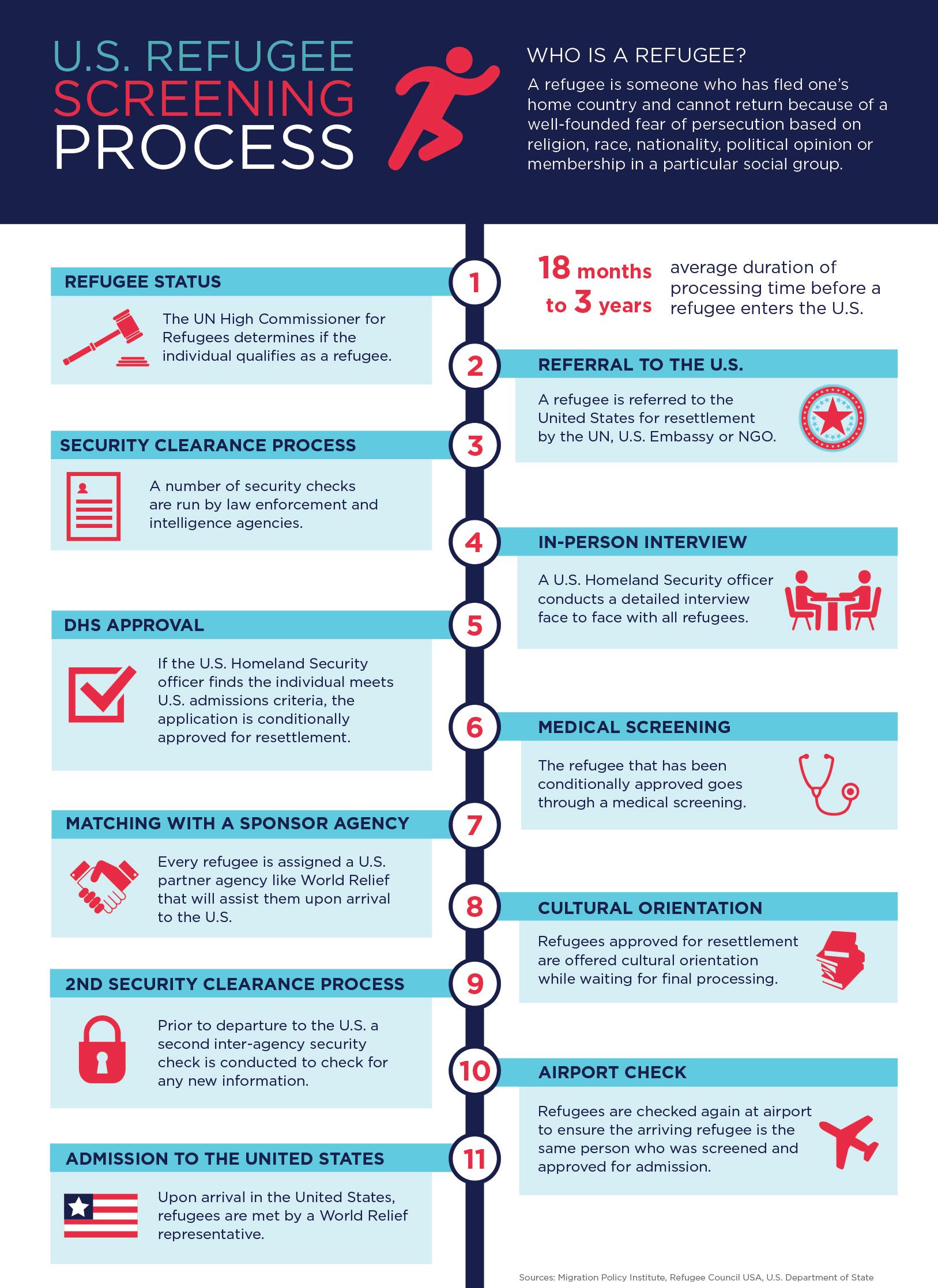
Applicants for refugee admission to the United States must satisfy the following criteria:
• The definition of a refugee as determined by U.S. government officials. Under the U.S. Refugee Act of 1980, the United States resettles only those who fit under the United Nations’ definition of a refugee, which is a person with a well-founded fear of persecution for reasons of race, religion, nationality, political opinion, or membership in a particular social group.
• Be among those refugees determined
by the president to be of special humanitarian concern to the United States.
• Be otherwise admissible under U.S. law.
• Not be firmly resettled in any foreign country.
Although a refugee may meet the above
Informational graphic courtesy of World Relief
criteria, the existence of the U.S. Refugee Admissions Program does not create any entitlement for that person to be admitted to the United States.
MARCH 2017 19 Continued on next page
QUESTIONS AND ANSWERS ABOUT REFUGEES AND RESETTLEMENT
Continued from previous page
How many refugees does the United States accept for resettlement?
The United States accepts a limited number of refugees each year. The president, in consultation with Congress, determines the authorized target for refugee admissions through a “presidential determination.” For 2017, the limit of refugee admissions to the United States is 110,000 people.
How do refugees make it to the United States?
The Department of State’s Bureau for Population, Refugees and Migration oversees the U.S. Refugee Admissions Program through U.S. embassies worldwide. The State Department develops application criteria and refugee admission levels and presents eligible cases for adjudication by officers of the U.S. Citizenship and Immigration Services.
USCIS officers travel to the country of asylum to interview refugees who fall within the priorities established for the relevant nationality or region. The USCIS officers interview potential applicants to determine whether or not they are refugees as defined under U.S. law. A refugee of any nationality may be referred by the United Nations Refugee Agency (UNHCR); however, this does not guarantee admission to the United States, for they must still qualify under U.S. law.
Upon completion of security and medical screening, the USCIS officer may approve the refugee’s application for U.S. resettlement. After approval, arrangements
are made for his or her placement with a U.S. voluntary agency and travel to the United States. This process may take more than a year.
What happens to refugees when they come to the United States?
Refugees must rebuild their lives from traumatic and tragic circumstances. The majority of refugees embrace their newly adopted homeland with tremendous energy and success. They go on to work, attend universities, build professions, purchase homes, raise children, and contribute to their communities. Ultimately, refugees
All refugees receive limited assistance from the U.S. government and nonprofit organizations. These local organizations help refugees find housing, learn about life and customs in America, secure jobs, learn English, and become citizens.
What benefits do refugees receive?
The circumstances under which refugees leave their country are different from those of other immigrants. In fleeing persecution, refugees often are unable to bring personal possessions or prepare themselves for life in a new culture. Recognizing this fact, the federal government
The circumstances under which refugees leave their country are different from those of other immigrants.
obtain citizenship and become fully participating members of society. They become Americans.
One year after being admitted to the United States, refugees are required by statute to apply for lawful permanent resident (LPR) status (that is, become a green card holder). Refugees granted LPR status may apply for naturalization (citizenship) five years after their admission date as a refugee.
Many refugees come to the United States without any possessions and without knowing anyone. Other refugees come here to be reunited with family members.
provides transitional resettlement assistance to newly arrived refugees.
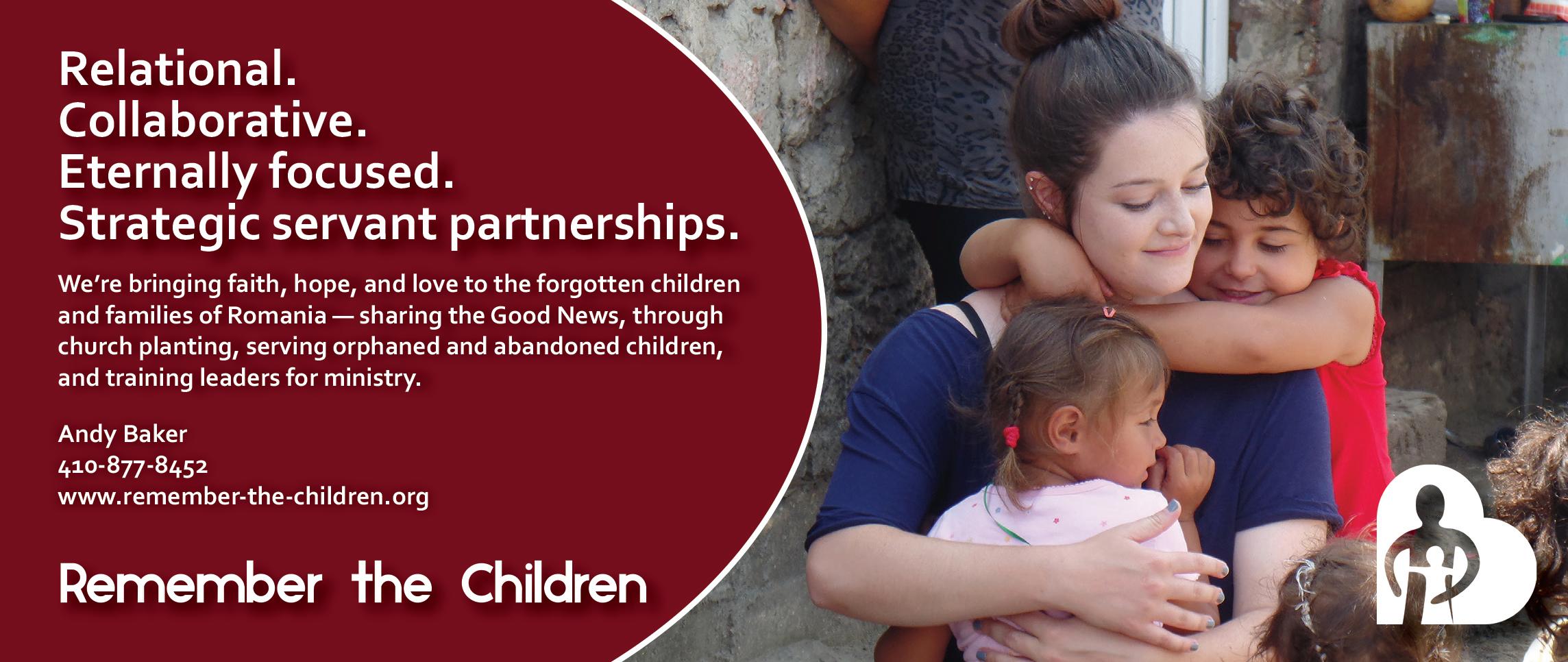
In the first 90 days, local agencies contract with the Department of State to provide for a refugee’s food, housing, employment, medical care, counseling, and other services to help the refugee make a rapid transition to economic self-sufficiency. Refugees are expected to find jobs and begin paying their own expenses within 90 days of arriving in the United States.
This information was gathered from the International Rescue Committee (www.rescue.org), the International Organization for Migration (www.iom.int), and the United Nations High Commission on Refugees (www.unhcr.org).
20
CHRISTIAN STANDARD
Close to God’s Heart
BY BETHANY ANDERSON
When Solidarity started almost 15 years ago in a troubled neighborhood of Fullerton, California,1 we were simply an idealistic group of college students eager to change the world in the name of Jesus. That desire, although rooted in privilege and a slight savior complex, led us to a deeper understanding of Jesus, his heart for us, and specifically his heart for immigrants.
It also led us to move from an organization that just runs after-school programs in immigrant neighborhoods to one that acts as a bridge between the local churches and immigrant neighborhoods throughout our city.
As we’ve grown, we have adapted our programs and services to the needs of the community. We’ve provided leadership development, job training and placement, church planting, parenting programs, English classes, gang prevention and intervention, and our latest endeavor, immigration legal services. As we’ve journeyed with our neighbors, it has become increasingly clear that the biggest obstacle in their lives is immigration status.
There are approximately 11 million undocumented immigrants in the United States, with an estimated 1 million living in California. As followers of Jesus, we have a biblical mandate to
love and care for immigrants, regardless of how they came or why they are here. As an organization and community of believers, we feel strongly that we must respond to this call in the most tangible way possible.
Opportunity
In 2012 with the announcement of DACA, we had our first opportunity to step into this call.
(The Deferred Action for Childhood
Arrivals is an option allowing certain undocumented immigrants who entered the United States as minors to receive a renewable twoyear period of deferred action from deportation and eligibility for a work permit.2) We partnered with a local attorney to provide workshops for the youth in
our neighborhoods.
Under the attorney’s supervision, our staff had the opportunity to sit, one-onone, with countless youth and help determine their eligibility for DACA. In each of these encounters, we were able to share the love of Jesus, pray, and speak into the hope available to this vulnerable population. Client after client sat across from us and shared the details of their journey into our country and the burden of growing up here with no rights and an uncertain future.
As we fought back tears with each encounter, it became increasingly clear we were in a sacred space. We had found a niche in the kingdom that allowed us to provide a tangible and much needed service, while pointing all those with whom we interacted to Jesus.
In our years of work in the community, we had never shared the gospel more
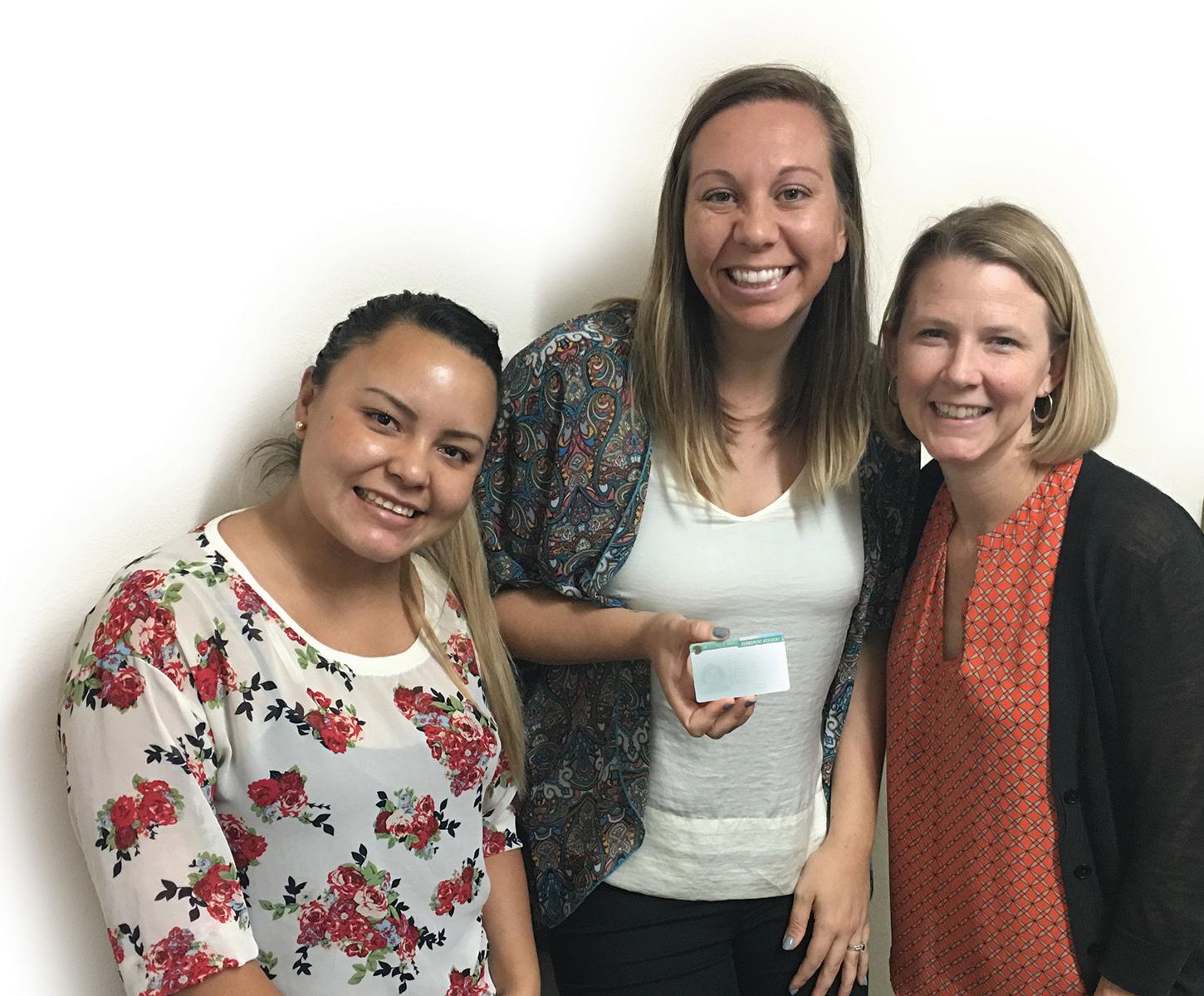
MARCH 2017 21
Continued on next page
How Camino Immigration Services demonstrates God’s love to a struggling population
We have a biblical mandate to love and care for immigrants, regardless of how they came or why they are here.
Bethany Anderson (center) with other Camino Immigration Services staff members, Valeria Sosa and Kristy White, celebrating the approval of their first green card application.
CLOSE TO GOD’S HEART
Continued from previous page
directly and more effectively. We realized that providing quality legal services was an incredible way to share the love and hope of Jesus.
Accreditation
Because of this, we began to pursue our Board of Immigration Appeals recognition and accreditation. BIA is an opportunity for churches and nonprofits to become authorized to practice immigration law as a service to the community. Upon our BIA approval in 2015, we opened our doors as Camino Immigration Services, a bona fide immigration law office, able to provide the community with quality and affordable counsel.
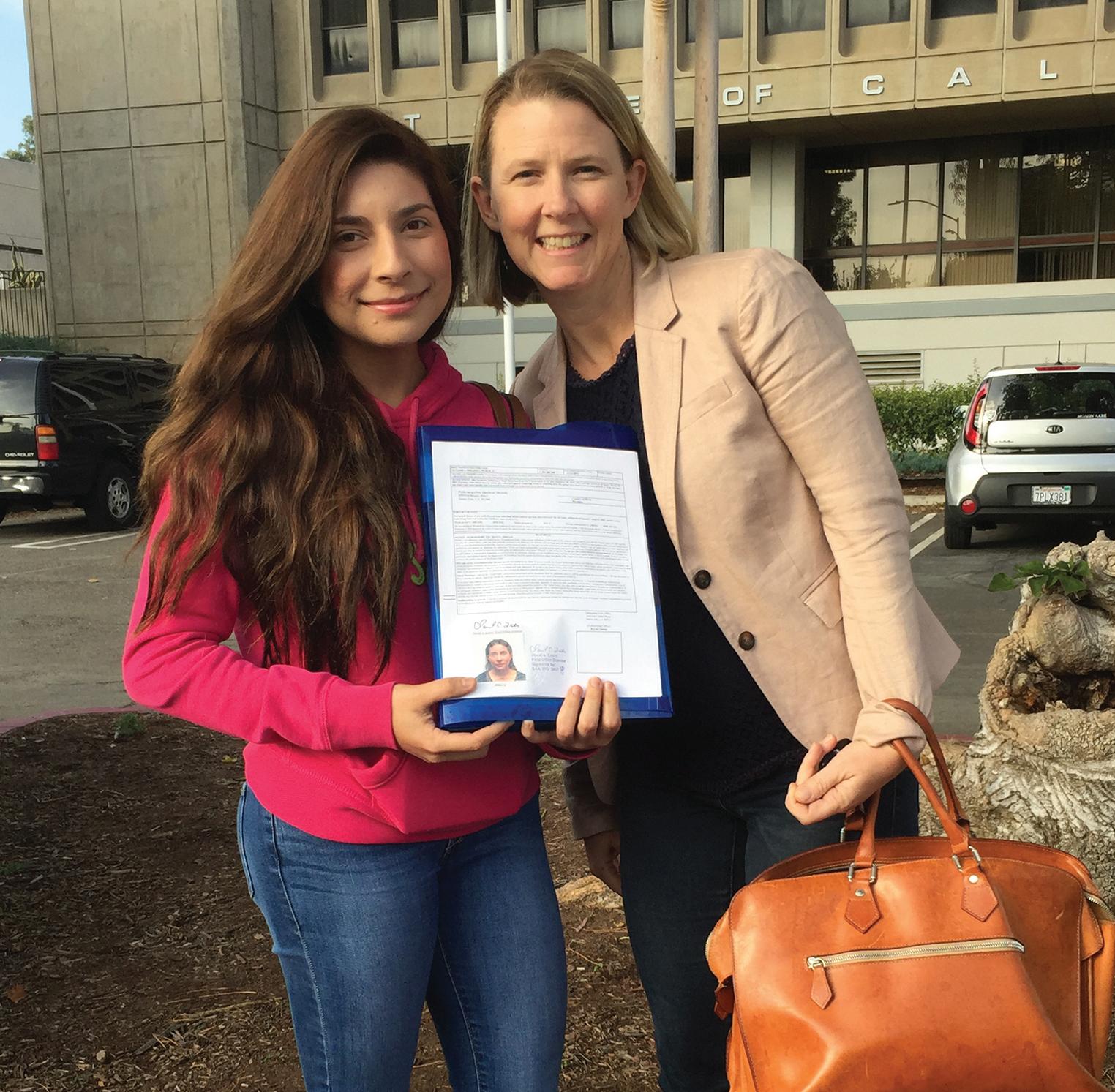
Since that launch we have been able to help nearly 100 families determine their eligibility for immigration relief. On top of that and even more importantly, we have sat in the sacred space of hearing stories of trauma, desperation, pain, and rejection, and have walked with our clients into the hope of Jesus.
We function very much like a typical
law office, but without the focus on making money. Our efforts are entirely and wholeheartedly in our clients’ best interests. We screen potential clients for possible forms of relief, advise on best options moving forward, walk through whatever process is decided upon, prepare applications, represent clients in front of immigration officials, and advocate for their rights.
narios, we pray with and seek to bless our clients.
Our job is sacred. It is important and it is impactful—not only for our clients but also for our staff and volunteers. It’s heavy at times, but the pain pushes us into the presence of God, and there we find the hope we strive to share with our clients.
Dream
We do all this for a fraction of the cost a law office would charge, and we get to do it all in the name of Jesus. We cry with our clients as they share the hardships they face. We celebrate with our clients when they receive a work permit or green card in the mail. We mourn with our clients when we determine there is no form of relief available to them. And in all sce-
Our dream at Solidarity and Camino Immigration Services is that the church in our country would see immigrants, not as a burden to be feared, but as individuals made in the image of God. Serving and loving immigrants is an opportunity for the people of God to live out the teachings of Jesus in a way that could have eternal impact.
We are called to go and make disciples of all nations. Fortunately for us, we no longer need to travel oversees to fulfill this commandment because the “nations” are here. They are our neighbors, our kids’ classmates, the ones making our food, preparing our hotel rooms, and driving our Ubers. And we have the chance to represent Jesus well to a population often desperate for belonging. For churches interested in stepping into the call of welcoming the stranger, you don’t have to look too far.
We have seen the complicated immigration systems and conflicts worldwide that push people to migrate. We have come to recognize the uniqueness of each client we serve, as well as the thread of desperation and dreaming of a better future that connects them all. Most important, we have been challenged to see the dignity in all humanity as we stand face-to-face with people who are really no different from us: equally broken and equally sanctified.
There is no greater gift as a follower of Jesus than to experience unity with the Spirit as you serve a population so close to God’s heart.
¹Read about the wider ministry of Solidarity in the November 2016 issue of Christian standard: http:// christianstandard.com/2016/11/the-church-needs-thehood/.
²More information about Deferred Action for Childhood Arrivals is available at www.ilrc.org/daca.
22 CHRISTIAN STANDARD
Bethany Anderson is the initiative director and lead immigration specialist at Solidarity, Fullerton, California. She has been living and working in an immigrant community through the context of Solidarity for the last 10 years. She is the founder and director of Camino Immigration Services.
After months of effort, Kristy White and the Camino Immigration Services team were finally able to obtain approval for their client to travel to visit her sick mother in Mexico.
We function very much like a typical law office, but without the focus on making money.
BY GAYLA CONGDON
My first experience with refugees was in the early 1980s while working at First Christian Church in San Francisco. The community the church served had an influx of about 200 families seeking asylum in the United States. These families had fled El Salvador due to a bloody civil war taking place there.
FCC pastor Bill Miles called me to ask for my help with a little translation problem the church was having. He said about 50 kids from El Salvador showed up for FCC’s “Summer Fun in the Son” program. A 10-year-old was the only one in the group who could speak English, and he was acting as their translator. Program leaders didn’t trust that he was translating correctly for the rest of the kids! They were justified in their concerns. The boy was misconstruing some messages to his advantage!
It was a tough summer, as the new kids gradually assimilated into the neighborhood. The language barrier
Welcoming the Stranger in Our Midst

was difficult, but the biggest challenge we faced was emotional assurance—assuring all the kids there would be plenty of resources for everyone, especially love.
The summer started with the kids going at each other, fighting and saying ugly words in both languages. There was an overall tone of resentment from both sides. But the summer ended with hugs, tears, and a
better understanding of the stranger in our midst.
Isn’t our fear of immigrants and refugees the same as what these kids were experiencing? Aren’t we afraid there aren’t enough resources to meet the pressing needs of the community?
MARCH 2017 23 Continued on next page
After decades of experience with immigrants, this Christian leader has decided how God wants his people to view them.
WELCOMING THE STRANGER IN OUR MIDST
Continued from previous page
Fear
When our family moved to City Heights in 1989 to help lead a church plant, we quickly became aware of the race issues taking place in the East San Diego community. Our local high school was having race riots between the existing, diverse student body and the immigrant students pouring into our community from Southeast Asia.
Our first year was an eye-opener. We had come to reach this diverse community, yet that wouldn’t be as easy as we thought. Our hope was to create a multiethnic church that reflected the community. In order to succeed, we needed to deal with the fears people had that the strangers in our midst would take from them the few resources that were available.
Nathan Moore, senior pastor of Fairmount Community Church in San Diego, says the concerns we faced in 1989 still exist today. It’s hard to get people from different cultures, languages, and religious backgrounds to accept and trust one another according to Moore, especially when they seem to be in competition for jobs, social service resources, and housing.
He’s frustrated. It seems that when refugees need to be resettled, they are placed in communities like City Heights that are already overextended. This community has the highest population of immigrants and is the most racially diverse in San Diego. Since the 1990s our area has seen more than 15,000 Somali refugees move into the area; our community has the second highest population of Somalis in the United States. Government officials have told me that refugees from particular countries are typically directed to communities where their fellow countrymen are already established so they can be assimilated.
People who came to my community as refugees many years ago have told me that, early on, it was difficult to assimilate. They felt resentment from the established community. Over time, however, walls started to come down. Healthy relationships began to develop as they went to school and played sports with each other. Real friendships developed, and people began dating outside their own cultures.
My Vietnamese neighbors told me they didn’t like it when the Somalis were settling in City Heights. Then, as the Vietnamese
remembered what it was like when they arrived, their attitudes changed. It wasn’t easy to reach out to the new arrivals, and yet the effort they made had a significant impact on the rest of their Vietnamese community.
Jon Luna, a first-generation FilipinoAmerican raised in City Heights writes the following about the Somali refugees in City Heights Life:
Let us be mindful that when we see others who are different—those who look different physically, who believe in a different religion or speak a different language—we should not see each other for our differences, but for our shared struggles.
Scarcity of resources seems to be the biggest fear whenever we discuss the issues of immigrants and refugees. If we believe God created the world with an abundance of resources, where does this fear come from?
resources seem to trust God more than those with an abundance of resources?
Ed Stetzer has a theory. In a recent blog post at Christianity Today he wrote:
In this country fear has become a defining narrative, even among Evangelicals. It comes in many forms: fear of unemployment, fear of the unknown, fear of the infringement of rights— all concerning. But one in particular—fear of terrorism—has caused a unique problem when it comes to community and love of neighbor.
Stetzer encourages Christians to stand in solidarity with refugees. Please read the post in its entirety (see link at the end of this article). I believe our Christian witness will never be greater than how we welcome the stranger in our midst.
Boldness
These are challenging times. As I write this, aid organizations have renewed desperate pleas to reinstate a cease-fire to evacuate an estimated 50,000 to 100,000 civilians from the city of Aleppo in Syria. Where will they go? Who will welcome the stranger in our midst?
Boldness is required. Yes, it comes with great risks. Perhaps the greatest risk is the one to our hearts.
Refugees from war-torn areas like Central America have been migrating north during the 40 years I have served in Baja California, Mexico. These folks travel in the hope of crossing into the United States through Tijuana, which has acted as a gateway for many. Tijuana over the years has become home to many migrants who never make it across.
According to a recent Los Angeles Times article, many Haitians left their homes for Brazil after the devastating earthquake in 2010. Finding no work, the Haitian refugees started making their way to the United States via Mexico. It is believed Tijuana’s population has swollen by many thousands of Haitians who are hoping to enter the United States.
Amor Ministries’ workers in Tijuana have been welcoming these strangers in their midst; they are sharing with them without fear of not having enough themselves.
Why does it seem like those with few
Shortly after “Summer Fun in the Son” ended, we were informed the families were being deported back to war-torn El Salvador. Asylum had been denied. Our hearts were broken. These new friends not only had to leave, they had to return to an unknown future.
We were never able to contact any of those families after they left us. To this day we have no idea what happened to them. What I can say is that for one summer, First Christian Church in San Francisco “welcomed the stranger in our midst.”
“When a foreigner resides among you in your land, do not mistreat them. The foreigner residing among you must be treated as your native-born. Love them as yourself, for you were foreigners in Egypt. I am the Lord your God.” (Leviticus 19:33, 34).
Here is a link to Ed Stetzer’s blog post, “The Narrative of Fear Surrounding Refugees: Preparing Ourselves for the Conversation,” Christianity Today, December 7, 2016: http://bit.ly/2gkvJNC.
24 CHRISTIAN STANDARD
Gayla Congdon is founder and chief spiritual officer for Amor Ministries, based in San Diego, California.
We needed to deal with the fears people had that the strangers in our midst would take from them the few resources that were available.
These are the best of times for completing the task of the church.
TAXI DRIVERS, Refugees, PRAY and Other Good Reasons to
 BY KEVIN DOOLEY
BY KEVIN DOOLEY
So what does the kingdom of Heaven look like when it shows up among refugees and immigrants in your town and mine?
As followers of Jesus Christ, we are living in a unique time in the history of Christianity—a time when obeying the last commandment of Jesus to “Go and make disciples of all nations” (Matthew 28:19) may not include air travel, but rather taking a taxi home from the airport.
For more than two decades my wife, Kim, and I have lived and worked crossculturally seeking to honor God among the poorest of the poor in Central America, and living and working among others in the Greater Middle East who have never known or had the opportunity to meet a follower of Christ.
Each initiative requires getting on a plane and traveling to another continent, learning more about the host language and culture, and contextualizing the greatest commandment (Matthew 22:37-39) and truly loving our neighbor in culturally relevant and meaningful ways.
Several years ago we were kicked out of the country we felt called to serve, and we were banned from reentering for political reasons beyond our control. Leaving friends, a home, and business in North Africa was discouraging at first, but God
soon revealed a greater work in the heart of the Bible Belt among those he had laid on our hearts. Soon I was tutoring international students in English, and helping to form a network to provide student services for hundreds of international students in our city and tens of thousands across North America.
Recruiting, training, and mobilizing volunteers was a common thread of our work on distant continents, but the marketplace and streets near me, it seems, is where my faith gains traction, where the rubber meets the road.
Conversations of Faith
One Friday afternoon I found myself eating couscous with Moulay, a new North African friend and taxi driver in our city. We talked about the struggles and oppor-
tunities for the immigrant and refugee taxi drivers in our town. That friendship started one of dozens of friendships with refugees and immigrants in our city that God would use to grow my own faith and plant seeds of faith in others.
Moulay inspired me to buy a taxi and lease it to taxi drivers. Soon a small group of investors (family and close friends) financed the first two taxis in my newly formed company. The leases would cover the cost of doing business and would repay the initial investments while providing dependable taxis for refugee and immigrant drivers in our city.
For almost two years I leased cabs to Sa’id, who had left his mother and younger brothers in a refugee camp in Kenya to
MARCH 2017 25
Continued on next page
©iStock/Thinkstock
TAXI DRIVERS, REFUGEES, AND OTHER GOOD REASONS TO PRAY

Continued from previous page
find help and hope through the United Nations refugee resettlement program. He had seen his own father killed by terrorists in Somalia years before and was forced to raise his younger brothers just across the border in a refugee camp in Kenya. Today Sa’id works two jobs and sends money to his family in Kenya so his brothers might have a proper education and life outside of the refugee camp.
Conversations of faith were frequent since Sa’id had no other friends who followed Jesus. Christian concepts of forgiveness, grace, and God’s unconditional love for all people are mind-blowing for Sa’id.
Clarity comes in combining Word and deed, revealing the truth of the gospel. That usually happened while changing out a dead battery in a taxi queue in front of a major hotel downtown during rush hour, or repairing a tire in slush and snow, or cleaning the headlights and changing wiper blades on a rainy night.
For me, lessons learned in “loving your neighbor” are best learned in the marketplace. Jesus’ example of doing the majority of his teaching in and through the marketplace, and Paul’s tentmaking impact on his business team and his unique strategy for the expansion of the church, only add to the relevancy of the Christian message.
As a very devout Muslim, Rachid was argumentative at first, always ready to debate his new Christian friend on the superiority of his religion over mine. After all, I was the only Christian leasing taxis for drivers in the Moroccan-owned taxi company in our city in the Midwest. Every month I would give Rachid payment for circulating my taxis in their company, and several times a week we would talk about available drivers and taxis . . . and faith.
We laughed as we celebrated the birth of his child and mourned the death of his father back in the Middle East. I never missed a chance to invite Rachid for Thanksgiving or for a Christmas or Easter program at church. Rachid always reminded me, “Mr Kevin (KEE’vn), I will call you first when a cabdriver is looking for a taxi to rent.” He said it was because I was the only taxi owner who pays his bills
on time, but I know it is because of something else.
Demonstrations of Faith
So, what does the kingdom of Heaven look like when it shows up in your city or mine? What do refugees in our cities long to see which they have never seen before if they have not been befriended by a follower of Jesus? Christian Scripture reveals that the effects of a personal faith in Jesus Christ on a believer will produce love, joy, peace, forbearance, kindness, goodness, faithfulness, gentleness, and self-control (Galatians
church were actively praying for and befriending taxi drivers at the airport.
I recruited a few retirees from church to help Mohamed with the language and culture classes in the church library. At first the retired engineer and dentist were hesitant (more so about tutoring English than making a new friend from the taxidriver community), but when Mohamed’s true motivation for meeting us was revealed, their determination intensified.
After our first session I asked Mohamed, “Have you ever been inside a church building before?”
5:22, 23). But what does this look like to our Muslim friends who have never previously befriended a follower of Jesus?
I had leased a taxi to Mohamed, an engineer with children the ages of my own; our sons had competed against each other in cross-country in high school. In addition to driving a taxi at the airport, Mohamed was studying at the university and wanted some help with accent reduction; at least that is what he claimed. He needed a native speaker of English to help him change his “ziss an zat” to “this and that,” and he asked if we could meet at our church. Only a handful of times has a Muslim friend actually asked to come to church! Mohamed knew where I went to church since a group of volunteers from
“No, never before now.”
“Would you like to know what we do here?”
With Mohamed’s eager, “Yes!” I gave him the campus tour describing what goes on in a Christian worship service, why we meet when we do, the meaning behind the sacraments of the Lord’s Supper, youth programs, etc., and with each stop on the tour we talked about the need for faith for our families in uncertain times.
I had had a friendship with Mohamed through the taxi business before our tutoring sessions began, but he had not rented a cab from me in a while and our communications seemed to have dropped off. He had just returned from visiting his family in Africa, and I was surprised when he ap-
26 CHRISTIAN STANDARD
©iStock/Thinkstock
proached me about tutoring. It was then that he revealed his concern for his wife, who had been diagnosed with stage-three cancer.
Our tutoring sessions included introducing Mohamed to cancer survivors at church who helped to find answers about health-care options for some pretty big decisions his family was facing. Today, Mohamed’s wife is a cancer survivor; and, with some career coaching involving other Christian professionals, Mohamed has landed an engineering job in his field of expertise. Mohamed’s family sees Christian faith in a whole new way, and the Christians who have been praying for them see the immigrant and refugee community through a new set of eyes as well.
Pure Joy
I wish I could report that the taxi business was a huge financial success, and that every refugee taxi driver inspired boldness and compassion in my life, and that every relationship in business led to a deep spiritual awakening. But then I would be missing God’s richest blessings on my life and his most powerful witness for those around me. My life verse during the height of my taxi business became James 1:2-4: “Consider it pure joy, my brothers and sisters, whenever you face trials of many kinds, because you know that the testing of your faith produces perseverance. Let perseverance finish its work so that you may be mature and complete, not lacking anything.”
I found out quickly that producing “joy” was relatively easy—I could do that on my own. But, “pure joy” on the other hand, only God could give, and he has chosen to do so, for my benefit, in times of difficulty and trials.
I thought I had learned this in Central America decades ago while serving a growing faith community dealing with injustices and poverty in the midst of a civil war. I certainly witnessed pure joy among the believers we served throughout Central America and the Caribbean. God even allowed us to see pure joy in the midst of unimaginable genocide in the Balkans, mobilizing faith-based medical and relief initiatives. Yes, we endured trials and tasted pure joy on more than one occasion since then, but in comparison to those we were sent to serve, we had only a small taste.
The taxi business has certainly delivered opportunities to experience and en-
dure “trials of many kinds” and has helped us to mature in our faith in Jesus.
Abduwalli is a young refugee studying at the university and driving a taxi parttime in our city. He is a cousin (of the same tribe) of other taxi drivers for whom I have provided services. He helped me discover just how broad the term trials of many kinds actually is. Sure, a few mishaps like knocking off side mirrors or hitting curbs and destroying tires while breaking wheel bearings are expected. After all, God is giving me more time with the immigrant mechanic population downtown too, right?
My prayer life certainly improved, but joy seemed harder to come by. One of my drivers took rides out of state, and I received his fines in the mail for blowing through tolls in Chicago. Yes, trials of many kinds seemed to be increasing.
Only a few taxi drivers showed hostility and anger toward American cultural
A gospel witness is most convincing when God provides his love in the presence of hatred, his joy in the midst of despair, his peace, patience, kindness, goodness, and gentleness in the face of a prevailing spirit of hostility and brutality seen in almost every headline today. Pure joy is encountered at the end of our own capacity, and then it endures.
It is only by the power and strength provided by God through faith in what he has accomplished for humanity that we can accomplish anything lasting. This pure joy persevering in trials of many kinds provides the most convincing witness to the world for faith in Jesus. It is no wonder God has used persecution and suffering more than prosperity to advance his message of hope and salvation to the nations.
ways, politics, and a faith different from their own, but just a few. God was answering my prayers and demonstrating his love for me and for those I was serving by allowing me truly to experience pure joy and to know him in ways I had never known before.
Pure joy came to me late one Saturday night when Abdu called my cell and asked me to come to the city and unlock his taxi. He had locked his keys inside the taxi for the second time. At that moment I was unable to conjure any love or kindness on my own for Abdu. He had already cost me much more than his contribution to his part-time taxi lease, and he was consuming time and energy I simply did not seem to have. I had been looking over a lesson I would be teaching at church in the morning, so God had my attention. This was my pure joy moment—I knew it!
The moment when I feel no love for someone on my own, that is when the fruit of the Spirit kicks in and provides an inexpressible love. This is the power of the body of Christ on earth, the church!
Now, here in the crossroads of America, I am blessed to serve followers of Jesus who have come out of other faith backgrounds, and I am inspired by their pure joy as we lean into trials of many kinds together. Serving together with the persecuted church globally and learning to love our neighbors locally, followers of Jesus in the Bible Belt have a unique opportunity and the power to demonstrate pure joy at taxi queues outside of most Kroger stores in Cincinnati, and lined up at the curb outside of convention centers and sporting events in Columbus, Kansas City, St. Louis, Minneapolis, Indianapolis, and on both sides of the riverfront in Louisville. At the time of this writing, the largest of the ethnic groups of taxi drivers in each of these cities are refugees from an East African country taken hostage by terrorists.
Given the current climate of hatred and division in our nation, and of fear in the face of global terrorism, the church is living in the best of times to complete the task of the church by the power of his enduring love.
Yes, we are living in a unique time in the history of Christianity, when the kingdom of Heaven is showing up joyfully tutoring English, and living and working intentionally in our cities, showing love to an immigrant or refugee neighbor, providing a homestay or meal for an international student, and taking a taxi home from the airport.

MARCH 2017 27
Kevin Dooley is chief development officer/multicultural consulting partner with Central India Christian Mission. He and his wife, Kim, have four children and reside in Avon, Indiana.
The moment when I feel no love for someone on my own, that is when the fruit of the Spirit kicks in and provides an inexpressible love.
A Christian Perspective on Immigration
A conversation with immigration attorney Land Wayland
BY JUSTIN HOREY
President Trump’s election in November left many Americans wondering: Will he really “build that wall,” as his supporters chanted at campaign rallies? Will our new president follow through on his campaign promise to deport millions of undocumented (illegal) immigrants? Will he institute a ban on Muslims entering the United States?
The 2016 presidential campaign brought the issue of immigration back into the news and back into the minds of many American voters. It also left millions of people in fear of imprisonment, deportation, or worse because of their immigration status. As Christians, how should we respond? What is the biblical perspective on the issue of immigration? What should we say
In four decades of practicing immigration law, what have you learned about immigrants that American Christians need to understand better?
Immigrants are human beings who need to be loved, to be respected, to be able to practice their religion, to marry and raise a family, to raise their children. They want to have the opportunity to lead a good life, to work at a job that is worthy of their time and effort, to live in a safe community, to have leisure time and use it wisely. In most ways, they are no different from you or your family or the vast majority of human beings on this earth.
In what ways do recent immigrants tend to be different from natural-born U.S. citizens?
Immigrants who come to the United States tend to be more willing to take risks. Compared with those who were born
to aliens in our communities?
Shortly after the election, Christian standard spoke with Land Wayland, an immigration attorney based in Southern California. Since 1973, Wayland has represented more than 2,500 cases before the U.S. Immigration and Naturalization Service and more than 1,000 cases before the agency that succeeded it, the U.S. Citizenship and Immigration Services—with a 98 percent success rate.
A devoted Christian, Wayland also teaches classes on immigration law for single parents at The Strong Families Institute of My Safe Harbor, a ministry founded by First Christian Church in Anaheim, California.
Wayland spoke with Christian standard at length about immigrants, immigration policy, and the Christian’s responsibility to strangers in our midst. His responses have been edited for length and clarity.
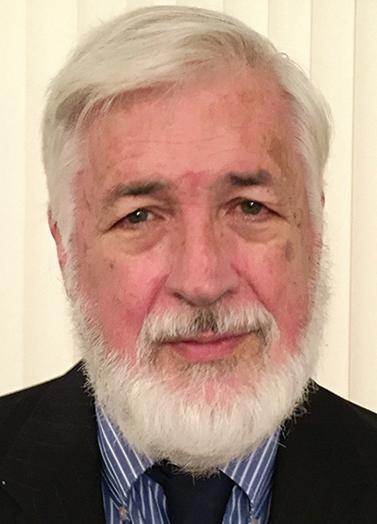
here, recent immigrants are more likely to serve in the U.S. military, start their own business, buy a house, pay their bills on time, attend religious services regularly, and vote when they become citizens. In my experience, they are also far less tolerant of corruption in government.
What will it take for our country to address its immigration problems?
It is time for the leaders of this country to do a thorough reassessment of immigration policy and make plans for the next 30 years. Our leaders need to recognize that the ease of modern transportation allows virtually anyone in the world to travel to the United States, and that it is time to control more carefully who enters and who stays too long.
It is time to spend the money to properly fund the entire immigration program of the United States and to hire, train, and
equip enough Immigration Service officers to be able to quickly do their duties.
Our leaders need to admit that some existing immigration policies have not been well thought out or have not been well implemented. It is time to recognize that some of our country’s immigration policies no longer make much sense and must be changed.
For example?
First, our country should increase the number of close family members who are admitted each year so the visa waiting lists are no longer 20 years long. If a person can’t count on having a visa available within five years, then the visa should not be promised. The category definitions should be adjusted to ensure that this is possible.
Second, we should recognize that the U.S. labor market now recruits qualified workers from every country. We need to
28 CHRISTIAN STANDARD
Land Wayland
find a way to allow U.S. companies to hire the skilled employees they need without waiting five years. Many of our businesses need those people now.

Lastly, our government must recognize that the smartest and most adventuresome aliens are likely to become entrepreneurs, and the government should make it easier for them to enter the United States in order to start or expand businesses.
What about individuals seeking asylum? What about refugees?
We must create an effective way for residents of foreign countries who have a bona fide need to apply for asylum to do so from outside the United States. They should not be required to find a way to make their way to this country to do that—because it is often dangerous, illegal, or both. And we should limit the number of such applications that can be approved each year.
What about the language barrier?
How important is it, in your experience, for immigrants to learn English once they arrive in the United States?
When you don’t speak the language, it is extremely difficult to rise very far in a new culture. In my opinion, any nationwide immigration reform should create programs to ensure that, once aliens arrive, they are required to learn English to the best of their ability. These programs should also provide people with the opportunity to receive job training to qualify them for the jobs they are most likely to find.
What can Christians do for the immigrants in their immediate communities?
Christians must remember the clear biblical teachings that we shall always have the poor and the dispirited and the downcast with us, that we must welcome the stranger and provide for his care, that we should treat everyone as we want to be treated, and that we must be
generous in our efforts to help any who need our help.
Jesus did not focus his ministry on helping only the rich or popular or powerful—quite the contrary! If we believe, as Jesus taught, that loving our neighbor is second only to loving God, then each one of us must treat others fairly and with love—regardless of their citizenship status.
As Christians in America, we must dedicate ourselves to the idea that we have a holy mandate to be completely serious about the command of Jesus to love one another. That teaching, more than anything else, has motivated my immigration practice over the last four and a half decades.
As believers, when we appear before the Lord one day, we don’t want to be asked, “Why not?” or “Why didn’t you?” or “What more could you have done?”
MARCH 2017 29
©iStock/Thinkstock
Justin Horey is a writer, musician, and the founder of Livingstone Marketing. He lives in Southern California.
Interview with an Iraqi couple
My Refugee FRIENDS
BY KELSEY McKAIN
Their life here is simple and at times difficult. But compared to the fear and hopelessness they left at home, it seems like a dream come true.
I first met Wurood, Alaa, and their son, Rayan, through the Kentucky Refugee Ministry Cultural Exchange program that connects local residents with newly settled refugees to help acclimate them to their new city. I’ve known them for about six months, but because of the language barrier, I’ve only recently (with the help of a translator) been able to learn more about their lives as refugees.
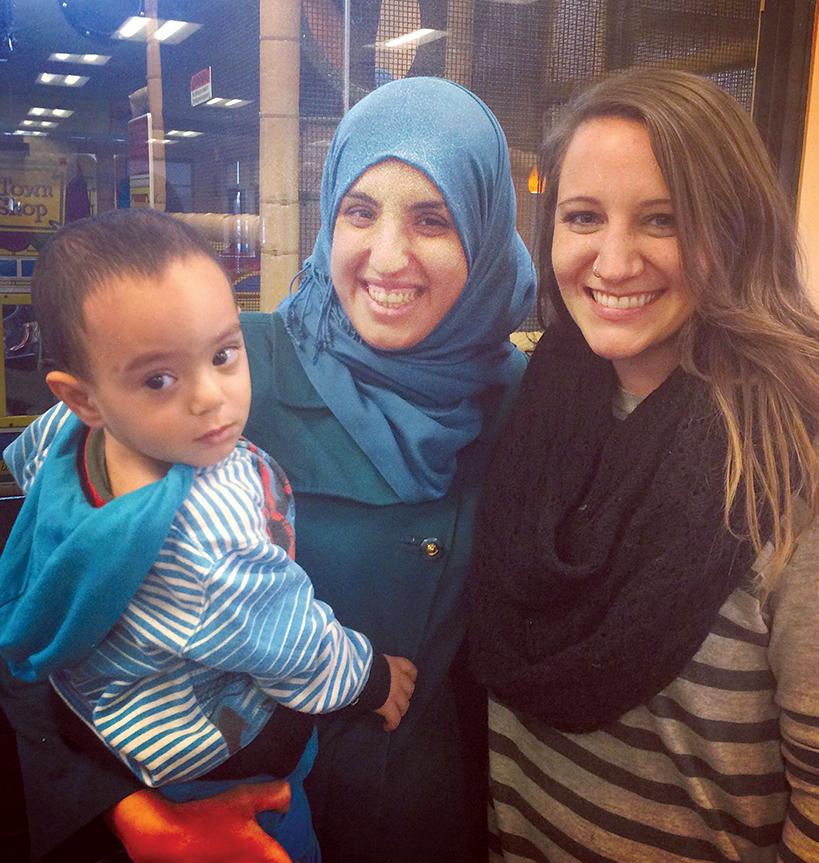
We sat down in their modest, twobedroom apartment in the south side of Louisville. The furniture doesn’t match and the walls aren’t decorated, but it’s cozy and it feels like a home. To Wurood and Alaa, it’s a dream come true.
Not Safe
Wurood and Alaa, both in their mid20s, grew up in Baghdad, Iraq. “It was not safe,” Alaa (the husband) told me. “There were always bombs and killing, always fighting, even in the daytime. It was never safe to be on the streets.” It was so dangerous that Wurood had never been to a shopping mall (although there were many nearby) for fear of being attacked or killed in a bombing.
Large public facilities were avoided at all cost, including schools. Wurood went only as far as elementary school because, as she explained, many young girls are kidnapped from schools in Iraq, so most families pull their daughters out of public school by the fifth or sixth grade. Their fear is understandable. According to a recent United Nations report, al-
most 34,000 civilians have been killed in Iraq in the last four years “in acts of terrorism, violence and armed conflict.” That’s more than 23 people every day killed in some sort of attack. The couple realized they needed to escape if they were to have a better future.
New Life
Alaa left first, fleeing to Jordan in 2012. Their romance was like something out of a movie. Their fathers were friends, and they’d known each other their entire lives, but it definitely wasn’t love at first sight. “I didn’t like him at all,” Wurood laughed.
But as the situation in Iraq grew worse, her affection for him grew stronger. She decided to start a new life with him and joined him in Jordan in 2013. They were
married in a nontraditional ceremony, with only their parents attending. Her family then went home to Iraq, leaving Wurood in a new country with a new husband.
“Life in Jordan was hard,” she sighed. “There was not a lot of work. We lived in one room with no windows or air conditioning, very little furniture, just something to cook on. It was very small.” Since it’s illegal to work as a refugee in Jordan, they received no assistance from the government or the United Nations. Like so many other refugees who are not permitted to work, yet receive no assistance, Wurood and Alaa were stuck in a terrible cycle of hardship and poverty.
Alaa found some unsanctioned work, but things were still extremely tight. They had to sell everything of value they owned to survive, including her wedding ring and the wedding presents from their family, giving up the last memories of their past in hope of a better future.
They spent three years in Jordan, filling out paperwork and hoping to be resettled to America. In 2015, while the couple were living in Jordan, their son, Rayan, was born. “It was very scary,” she remembered. “I had no parents or family there to help. It was just me and Alaa.” Through tears she added, “My family has still never met Rayan.
“That,” she said, “is the hardest part of being a refugee. I miss my family. Getting together to eat, spending holidays together, just being with them. I miss my family.”
30 CHRISTIAN STANDARD
Kelsey McKain, the writer of this article, with her friends Wurood and Rayan.
The couple said it’s especially hard knowing their family members who are still in Iraq live in constant fear. Wurood and Alaa are also fearful, never knowing if their families are safe or injured or if the bomb they heard about on the news has claimed them.
Wurood and Alaa were finally cleared to resettle in America in February 2016. They loaded all of their possessions into just three suitcases and traveled by plane—the first time for either of them— from Jordan to France to Texas, and finally to Louisville.
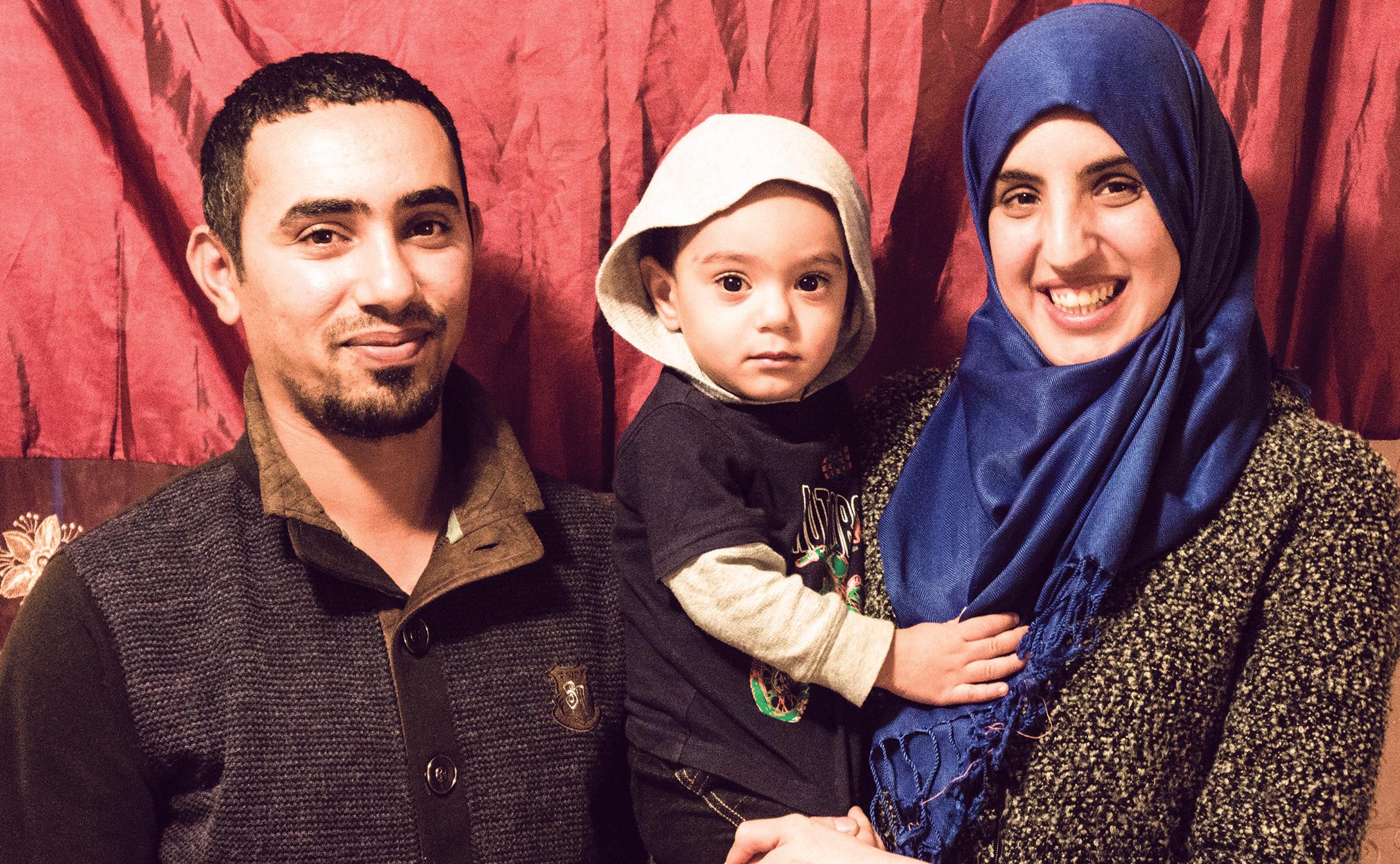
They were both nervous and excited to start their new life. Wurood was afraid of how she’d be treated as a Muslim woman. “I wasn’t sure if I’d be able to live here and go out with my hijab (head covering). I was afraid they wouldn’t let me work here because of how I was dressed.” Thankfully, she said, she hasn’t been treated differently at all. “People have been very nice,” she smiled.
Alaa was also nervous, but eager for the future. “I knew it would be better than Jordan. I could work and settle here. It would be safer, we’d have more opportunities, and we could do different things we’ve never done before.”
They feel very blessed to be living in America, citing safety and health care as their favorite things about living here.
“And the pizza!” Alaa added.
“We thank God we’re here,” he said. “It’s a hard life, but we’re very happy to be here.”
They are indeed very fortunate to have been chosen for resettlement. Many aren’t so lucky. In fact, more than 10 million Iraqis still need humanitarian aid, including 4.7 million children who are in danger of “separation from their families, abduction, recruitment into the fighting, and sexual violence.” They’re also at risk of long-term mental health issues due to their current conditions.1 Iraq is a dangerous and difficult place to be, and Wurood and Alaa are thankful to have escaped.
While their life is markedly different in Louisville than Jordan and Iraq, it’s still difficult, especially in the beginning, they said. The hardest thing, Wurood said, is that “life is expensive here, and transportation is difficult.” It sometimes takes Alaa over an hour to get to work, even though his job is just three miles away. They rely solely on public transportation, which can be confusing (especially if you don’t speak English). Wurood is mostly confined to their neighborhood since she doesn’t understand the buses. “I walk to Aldi and to the park—that’s about it,” she said.
The language barrier is the most difficult thing they face. They are both work-
ing on their English, but it’s challenging, and their progress is slower than they’d like. They’ve found ways around it, however. “My best friend is my neighbor from Burma. She doesn’t speak Arabic or English, so we don’t talk much, but our kids play together, and we smile a lot,” Wurood said.
When I asked what she wished to be different, Wurood replied, “I want Alaa to find a better, more stable job.” He currently works at a department store but was a plumber in Iraq and hopes to find a job in that field. He also wants to learn to drive and buy a car. “I want to drive, too!” Wurood chimed in. “And I want to work.”
Though their life is difficult, they’re very excited for their future. “We want Rayan to have a good future. That’s why we came here. We want him to be a doctor!” Their future is about to take another exciting turn: they recently found out they’re pregnant again and due in May!
“Alaa wants another boy, but I want a girl,” Wurood laughed. “But anything is good! Just a healthy baby.”
MARCH 2017 31
¹According to the UNICEF website, accessed at www. unicef.org/infobycountry/iraq_74784.html.
Kelsey McKain serves as director of communications with Team Expansion, Louisville, Kentucky.
Alaa and Wurood, along with their son, Rayan, are refugees from Iraq who resettled in Lexington, Kentucky, with the help of the Kentucky Refugee Ministry Cultural Exchange program.
THE NEW DIASPORA
BY DOUG PRIEST
As the world becomes globalized, opportunities for evangelism multiply. Now is the time to develop new strategies for reaching dispersed people living in our own cities, towns, and neighborhoods.
Back in the 1970s, when I drove on the freeways in Los Angeles where I lived, I saw signs for “Little Saigon,” “Chinatown,” and “Little Korea.” I could go into the center of the city and find myself in neighborhoods of MexicanAmericans, Guatemalans, and Salvadorians.
Today the situation has changed. Go to any school district in Southern California and you will find 30 to 40 or more languages represented. What is true in Los Angeles is true for most large cities in America, and even the rural areas of our country are becoming diverse.
The term diaspora is an English rendering of a Greek word meaning “scattered” or “dispersed.” In the Old Testament, the Jewish people left Egypt and later entered the promised land. Generations later, many Jews were forcibly dispersed from their homeland during the Babylonian captivity. By the time of Christ, many Jewish people lived in the land of Palestine and many others lived throughout Asia.
The apostle Paul visited the synagogues or places of worship all over southern Europe on his missionary journeys. After the destruction of the temple in Jerusalem in AD 70, the Jews who had become followers of Christ were persecuted and scattered all over the known world. As they went, they shared the good news of Jesus Christ. It was through such movements of people that our sovereign God made himself known to myriads of people.
Diaspora as used by the Greeks included such practices as migration and colonization. By the 1960s the term was used to refer to those Africans who were forcibly taken from their homelands to become slaves in the new world. Today the term has broadened in use to mean
the dispersion of any ethnic group and “often implies a positive and ongoing relationship between migrants’ homelands and where they now work and live.”1

Immigration
We are in the third period of major migration in our country. The first migration was when the Europeans came to America and supplanted the Native Americans from their homelands. The second major migration was when the (generally) impoverished Europeans came to this country because of economic hardships in their own homelands. (Think of the Poles, the Irish, and the Italians as examples.) The third major migration is going on now as the United States has opened its borders and roughly 1 million new people come here to live each year.
People are on the move today—or they are being moved. The movement may be internal, such as the rapid move of rural people to the cities all over our world. Or the movement may be international.
Most of those who migrate today come from the Majority World. They leave their countries looking for economic advancement, education, peace, or better health care. These migrants, some 70 percent of them, end up in the West—Europe and North America.
Others are forcibly removed from their homelands. These are political refugees, with the Syrians, Sudanese, and Somalis as the most glaring current examples. A generation ago it was the Vietnamese and Cambodian “boat people.”
32 CHRISTIAN STANDARD
Continued on page 34

MARCH 2017 33
©iStock/Thinkstock
Getting to know our displaced neighbors presents possibilities for kingdom expansion and also contributes to understanding, peaceful relations, and the common good in our communities.
THE NEW DIASPORA
Continued from page 32
What happens when these people come to America? Sociologists from the University of Chicago noted that the immigrants go through three stages. First, they have contact with the new culture. Many do not speak English or know their way around. They seek help wherever they can find it. They often settle in communities of their own kind. Many continue to use their mother tongue.
Next, they accommodate the culture. They learn their way around, begin to drive and use the bus system, and navigate the complexity of American life. Their children often adjust to America faster than their immigrant parents. These children go to school and are taught in English. They may or may not be accepted by their American classmates.
Third, they assimilate into the culture. Full assimilation often takes three to four generations.2 By the second generation, English is the primary language, and the children born here may not speak the language of their parents and grandparents. Most immigrants, with the exception of refugees, are gainfully employed.
Some people who come to the West do not assimilate. Instead, they become marginalized. They withdraw. They live in enclaves, seldom venturing far from their home areas. This may be due to their desire to do everything possible not to assimilate here because they find this country’s practices intolerable. Or it may be because they have been treated badly by the locals because they are different.
We acknowledge that certain people fear immigrants, believing some of them may be, or may become, terrorists. But getting to know our displaced neighbors presents possibilities for kingdom expansion and also contributes to understanding, peaceful relations, and the common good in our communities.
Globalization and Transnationalism
As the world becomes globalized, people move about at an even more frenetic pace.
Global business has become borderless. KFC and McDonald’s are extremely popular in China. There are about 4,000 7-Eleven convenience stores in Bangkok, Thailand.
People have become “deterritorialized.” They work in multiple countries and have extended family connections in more than one country. Many laborers take up work
in another country, such as the hundreds of thousands of Filipino workers in the Middle East or the Bangladeshi laborers in Singapore. Entire economies are helped when these foreign workers send money back home to their families.
Many people today are transnationals. They “forge and sustain multi-stranded social relations that link their societies of origin and settlement.”3
A Unique Opportunity
Migration has changed our world. We live in the midst of diaspora. We in the church have been slow to seize the opportunity. We need to think of new strategies. In the past we have viewed mission as from the West to the rest. We have sent missionaries from America to outposts all over the world and have been reluctant to think of our country as a mission field. That can no longer be the case.
strategies for how to engage our neighbors:
Missions to the diaspora—reaching the diaspora groups in forms of evangelism or pre-evangelistic social services, then discipling them to become worshipping communities and congregations.
Missions through the diaspora—diaspora Christians reaching out to their kinsmen through networks of friendship and kinship in host countries, their homelands, and abroad.
Missions by and beyond the diaspora—motivating and mobilizing diaspora Christians for cross-cultural missions to other ethnic groups in their host countries, homelands, and abroad.
Missions with the diaspora—mobilizing non-diasporic Christians (like those reading this article) individually and institutionally to partner with diaspora groups and congregations.⁶
If one feels a call from God to minister to Afghans, one need not go to Afghanistan to do so. Rather, one can go to the Afghans residing in America. In Afghanistan it is illegal to “proselytize.” One can be thrown into jail or thrown out of the country. Not so in America.
First-generation immigrants are often open to the gospel because they are in a totally new situation. Jared Looney writes, “Migration represents an opportunity for proclamation among unreached ethnic groups that were previously difficult to access, and migrant families may represent soft soil that is ready to encounter the Good News of the cross of Christ.”⁴
Many churches are working increasingly in local public schools that are full of immigrants and refugees. As we help them, we help our “own” kids and schools.
Since God directs the movements of people, we should be quick to care for the resident aliens who are all around us. Enoch Wan has pioneered the concept of diaspora missions. He notes that “the theological assumption of diaspora missions is that it is God who determines where people will live at certain times so that wherever they are located, they can call upon God and find Him.”⁵ His classification system is helpful as we consider
My friend Kevin Dooley lives near Indianapolis, Indiana. He and his family had lived and worked in North Africa before leaving the region due to political reasons. Not wanting to give up his love for Muslims and their evangelization, he decided to work with Muslims in Indianapolis.
He learned that the majority of the taxi drivers in the city were Muslims, so he formed a business to help these drivers purchase their own taxis over time. His family has forged strong relationships with the families of the taxi drivers. He is viewed as a valuable friend whom they know is a Jesus follower. (See related article, p. 25.)
This kind of creative engagement and thoughtful outreach is a model for the future as the new diaspora continues.
¹Enoch Wan, Diaspora Missiology (Portland: Institute of Diaspora Studies), 97.
²Michael Pocock and Enoch Wan, eds., Diaspora Missiology (Pasadena: William Carey Library, 2015), 132, 133.
³Ibid., 23.
⁴Jared Looney, Crossroads of the Nations (Portland: Urban Loft Publishers, 2015), 166.
⁵Enoch Wan, Diaspora Missiology (CreateSpace, 2014), 100.
⁶Pocock and Wan, 217.
Doug Priest serves as executive director of CMF International and is a contributing editor to Christian standard
34 CHRISTIAN STANDARD
First-generation immigrants are often open to the gospel because they are in a totally new situation.
y Sherwood Oaks Christian Church, Bloomington, Indiana
A ‘loaves and fishes’ alternative
BY BRAD PONTIUS
In an effort to help displaced victims of violence by the Islamic State (IS) in the Middle East, Sherwood Oaks Christian Church in Bloomington, Indiana, discovered a different way to assist thousands of Iraqi Christians who have been forced from their homes. An initial effort to host refugees in Hoosierland was transformed into a campaign to provide necessary, lifegiving tools to 125,000 internally displaced persons (IDPs), Christians who lived in the Ninevah Plains near Kurdistan, Northern Iraq.
It all began simply enough: an Indiana University undergrad asked Rawand, a Kurdish student from Iraq, “Can I help you?” Laura had heard that six Iraqis had been invited to study at Indiana University early in 2004, during the Iraq crisis.
Rawand was proud to be chosen to represent his homeland in America. He wanted to experience all that he could during the six-month stay. His conservative Muslim background didn’t keep him from exploring mid-American culture—including faith foundations.

The relationship between Laura and Rawand spread to her fiancé, Joel, and to our family. We shared many conversations about family, culture, and faith over meals and coffee. Laura and Joel included Rawand in campus activities, community events, and family celebrations. They learned much from each other about life in America and Iraq. Laura visited a mosque with Rawand to experience Muslim prayers and understand more about Islam. Through their reciprocal relationship, Rawand became the man of peace who opened the door for Sherwood Oaks to assist suffering Christians in Kurdistan.
Rawand attended many special programs at Sherwood Oaks. He was curious and always complimentary of the worship experience. By the time he left Bloomington, he was part of our family. From Indiana he traveled to Washington, D.C., to complete a graduate degree at American University. As he returned home, we began to understand how privileged we are to know Rawand. He works in Kurdistan’s state department, making regular trips to other nations as a diplomat.
Seeking to Help

When our church began to explore the possibility of hosting Iraqi Christian refugee families, we asked Rawand to look into the options for us. I was surprised to hear that he had gone immediately to the archbishop of the Orthodox church and the director of Christian affairs to find the most eligible family(s) to send our way. We were shocked to receive word that the Christian overseers kindly rejected our request.
“We prefer to keep the Christians in our region,” came our reply. “They have been active here since the 5th century, and we do not want to lose them. They are important to Kurdistan and to Iraq.”
Although the Christian population registers only 6 percent in Iraq, Christians provide a necessary moral fiber in the Kurdistan region. The Kurdzman Church of Christ in Erbil, started in 2000, was the first Evangelical church in the region, and the Evangelical population there is growing rapidly among young adults.
Rawand came back to the United States in June 2016 for a conference in Washington, D.C., and a special visit with our family in Indiana. He presented us with a letter from the directorate of Christian Affairs requesting a different kind of help.
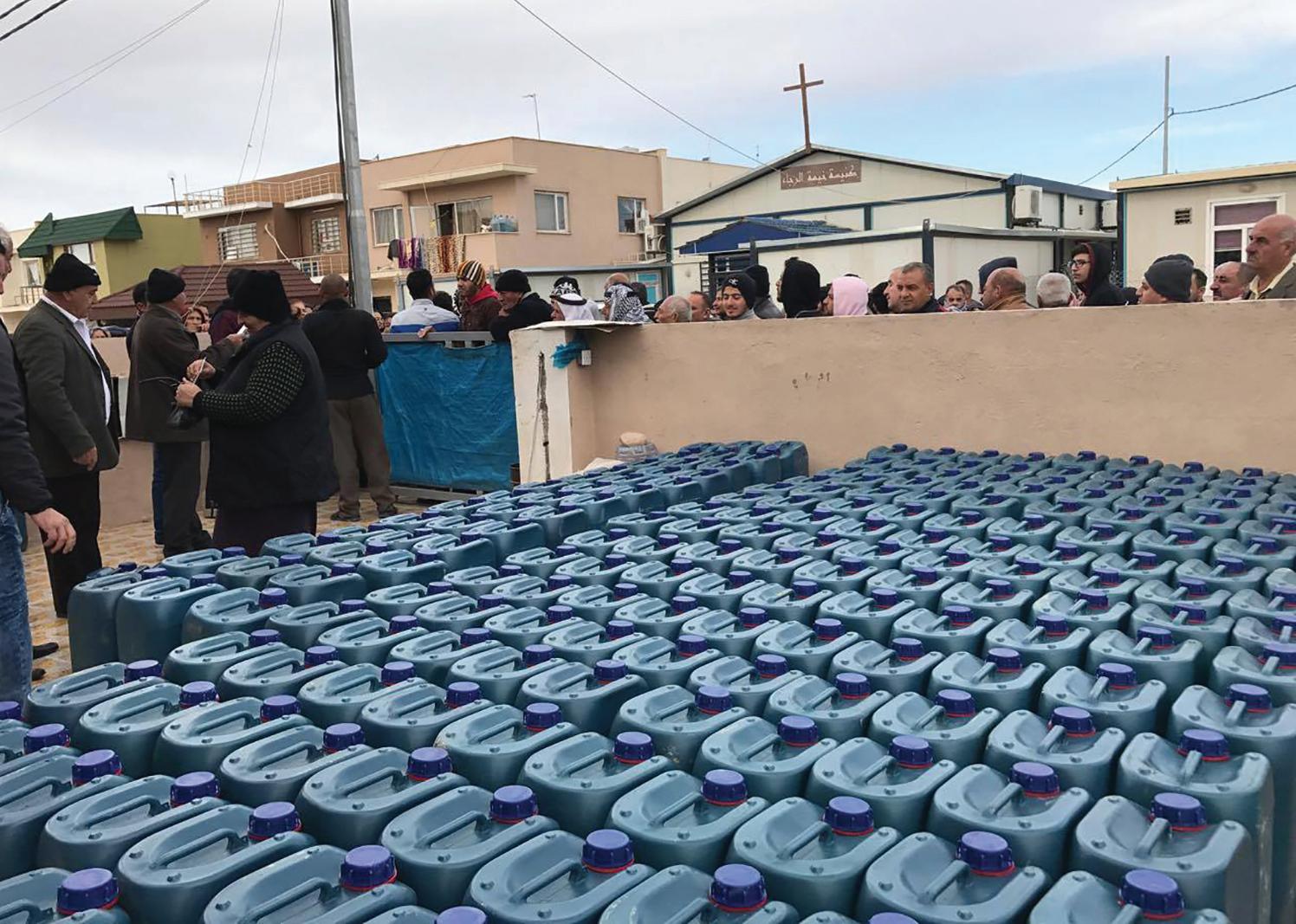
MARCH 2017 35
Continued on next page
Asking, “Can I help you?” is all it takes to bless thousands.
Among the aid Sherwood Oaks Christian Church is helping to provide Christians in the Kurdistan region is this fuel distribution that will help provide heat for 4,000 families. The fuel arrived a week before Christmas.
A ‘LOAVES AND FISHES’ ALTERNATIVE
Continued from previous page
The letter outlined the vast need among 125,000 Christian IDP families living in large camps around Erbil. The Islamic State forced the Christians to leave all of their properties and possessions behind. They hope to return to their homes when IS leaves, but in the meantime the Iraqi Christians need to reconstruct their lives by meeting their basic needs. We would like to see these families survive and thrive.
Help Thousands
Our plan to host refugees was shortsighted. In fact, much of our strategy for global engagement has been to support indigenous leaders who have effective outreaches in their home countries among their own people. We support more indigenous missions than American missionaries overseas. We know the high cost of crossing cultures. Why would we prefer to host two or three families to migrate to Hoosierland when we can help thousands of families find their way back home in Kurdistan?
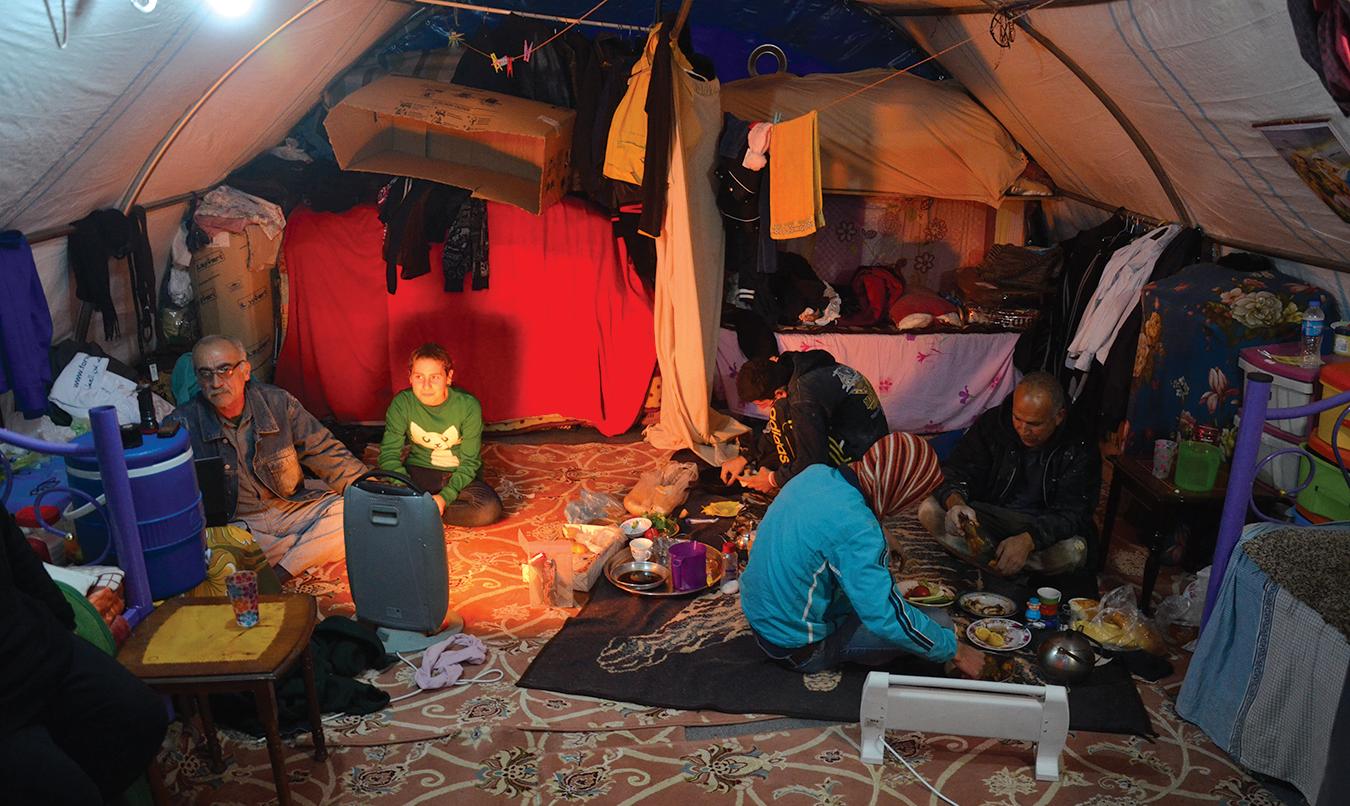
With tears in his eyes, Rawand described the immense pressure that providing for 1.8 million souls has put on the Kurdistan region. Housing, food, waste disposal, lack of purposeful jobs for the men, medical care for children and the elderly, and education for the children topped the list. He has served with the Rwanga Foundation, a relief agency that provides assistance to IDPs in the region. He knows firsthand the challenges of resettlement.
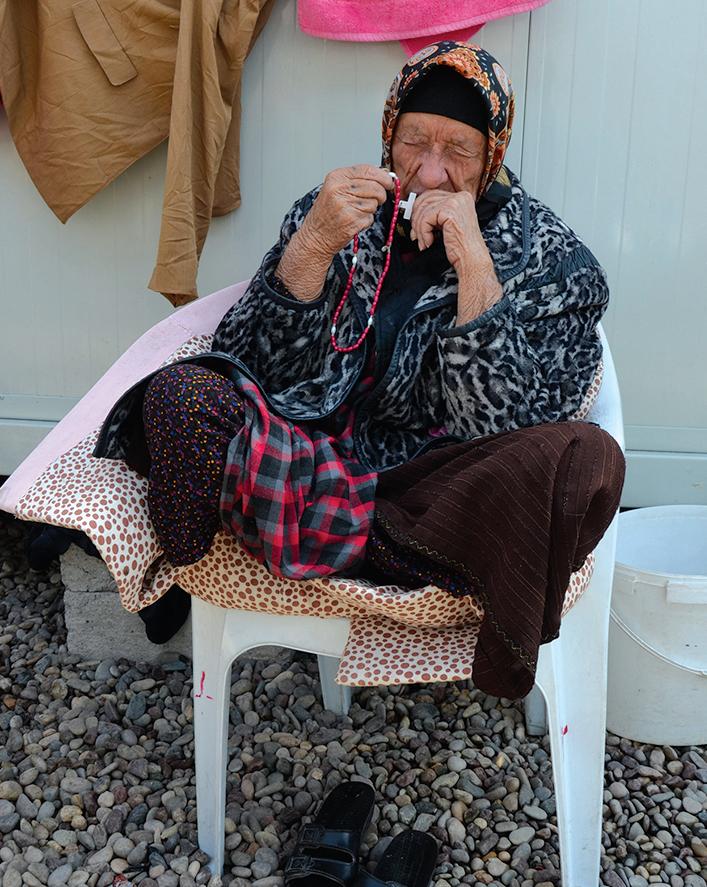
“The Christian families represent just a portion of the needs, but if your church can help care for them, you can be part of
the solution,” Rawand told us. “The NGOs [non-governmental organizations] are running low on resources. Be assured that we will channel your resources directly to the Christian families.”
Rawand explained that the Christian IDP families previously had prosperous lives, with every material advantage that a middle-class life in America offers. Suddenly, in their pajamas, they were walking away from everything, thankful to be alive, but wondering what the future would bring. One goldsmith mentioned to a relief worker that he was the owner of 15 shops with more than a ton of gold in his business treasury. Now he has to stand in line for water, like everyone else.
Meeting the Needs
Like most Jesus followers in the United States, when we see the need, we want to do something to help, but we’re not sure what to do. Is it best to host a family by diving into the mountains of paperwork and resettlement details of housing, furnishings, transportation, employment, and cultural and emotional adjustment? Or if we send financial assistance to Iraq, can we really trust that our resources will be used to help the IDP families as promised? Either decision demands that we put faith in the people and systems God has put before us.
Consequently, Sherwood Oaks launched a new plan to raise funds to purchase generators; fuel; evaporation coolers; Quonset huts for education, medical clinics, and worship; school supplies; and long-term meds.
A brief video, a simple brochure, and a passionate plea during the worship services presented the opportunity in early October 2016. International Disaster Emergency Service (IDES) agreed to provide a $20,000 grant. By mid-November the campaign reached $77,000. The goal was raised to $100,000 by Christmas.
Ultimately, we raised $114,000. Already $20,000 has been sent to serve 4,000 families with winter fuel, coats, and blankets.
In a recent conversation with Laura about the good that her friendship with Rawand is yielding for so many Iraqi IDPs, she said, “This reminds me of Jesus’ miracle of the loaves and fishes. Once again Jesus is taking the small gift of friendship that we offer, and he is multiplying it to bring great blessing to many.”
Sherwood Oaks Christian Church is being enriched by this opportunity to share with our Iraqi Christian brothers and sisters. We hope to be able to share much more than our resources in the future. We look forward to learning from those who have suffered so much for our faith.
We are thankful to Laura for her loving spirit and her willingness to be salt and light to a new student on campus. Her friendship with Rawand has led our church into a partnership that will change many lives.
In Jesus’ math, five loaves and two fish or merely asking, “Can I help you?” is all it takes to bless thousands.
36 CHRISTIAN STANDARD
Brad Pontius is the minister of local and global outreach at Sherwood Oak Christian Church, Bloomington, Indiana.
Families huddle around space heaters powered by gas generators to keep warm in temporary homes. 125,000 Christian families are among the displaced.
y Pantano Christian Church, Tucson, Arizona
‘Jesus shows up for the brokenhearted’
BY JUSTIN HOREY
Tucson, Arizona, may seem an unlikely destination for international refugees, but it is a federally designated “hub city” with one of the largest refugee populations per capita in the United States.
Roughly 1,000 international refugees arrive in Tucson every year. Most of them come feeling frightened and alone with few possessions and little money. But a growing number are greeted at Tucson International Airport with balloons, “Welcome to America” banners, and friendly, smiling faces from the people of nearby Pantano Christian Church eager to show the love of Christ to their new neighbors.
Pantano Christian started its refugee program more than a decade ago at the invitation of Tucson Refugee Ministry, a local nondenominational organization that “inspires and empowers church groups to meet the needs of refugees.” According to Tucson Refugee Ministry, fewer than 50 percent of refugees who come to the United States are befriended by an American.
Caroline Martin coordinates Pantano’s refugee program with her husband, Dr. Frank Martin, and Gary and Millie Pattee. She believes it is critically important to establish more connections between refugees and U.S. citizens,
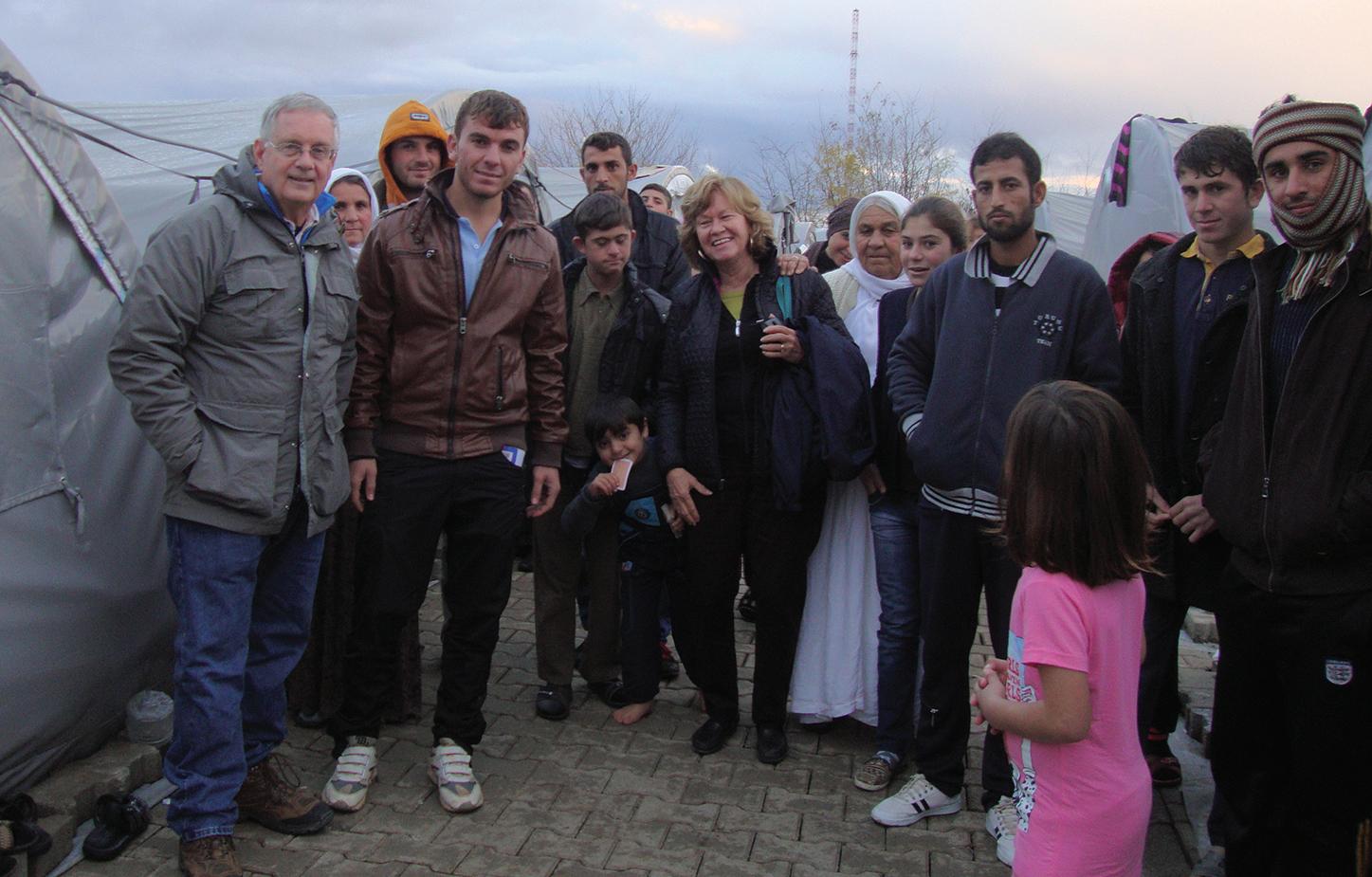
“People who have met loving Americans are more inclined to engage with the culture, learn the language, and assimilate effectively,” Caroline Martin said. Of course it is far better, she said, if those newly arrived refugees are befriended by Christian people who can show them what abundant life truly is.
Meeting Practical Needs
Pantano’s refugee ministry clearly has a spiritual component, but it is first intensely practical. Volunteers from Pantano get
names of incoming refugees from Refugee Focus, one of three agencies employed by the U.S. government to facilitate the relocation of refugees. Together they welcome each new family at the airport. Refugee Focus rents an apartment for the family, but volunteers from Pantano donate furni-

had to be escorted into the terminal.”

When the refugees meet the welcome team from Pantano and begin to understand what the church intends to do for them, Pattee said, their attitude changes drastically. “They become so at ease.”
Pattee said the church’s original plan was to stay involved with the families for 90 days. But in most cases the relationships go on for much longer. Volunteers from Pantano work closely with the families to help them adjust to their new city—often riding buses and visiting the grocery store together.
ture, linens, and groceries—and most importantly, offer their friendship and time.
Most refugees don’t know what to expect when they arrive, and some are nearly paralyzed by fear.
“When the families first get off the plane, they are so scared,” Millie Pattee said. “One family was so fearful, they didn’t even get off the plane and eventually
“It’s far better for us and for them if we teach them how to ride the bus so they learn to be independent,” Caroline Martin said. Volunteers from Pantano regularly accompany parents to their child’s first doctor appointment and even assist with enrollment at school, meeting teachers with the families.
The work can be challenging, and at
MARCH 2017 37
Continued on next page
Both the refugees and the volunteers from Pantano are blessed by their interactions.
Frank (left) and Caroline Martin (center) visit with a Yazidi family at a refugee camp in the Middle East.
‘JESUS SHOWS UP FOR THE BROKENHEARTED’
Continued
first the volunteers speak through an interpreter or use a translation app on their phones, but Pattee said the relationships grow strong because “the international language is love.”
The Future of Missions
Tucson may have more refugees per capita than many other U.S. cities today, but Caroline Martin thinks it is just a matter of time before every metropolitan area in the country is affected by incoming refugee populations. “It’s going to impact our whole country sooner or later,” she said. “It’s like a tsunami.”
Still, she is not intimidated or frightened. She sees her ministry as straightforward and clearly biblical.
“We certainly should be serving the people who are here in our cities, our newest neighbors,” she said. In her experience, both the refugees and the volunteers from Pantano are blessed by their interactions. “We are blessed to be a blessing.”
Caroline Martin also believes incoming refugees will change the nature of U.S. missions in the years ahead. With evergrowing numbers of refugees entering the United States, she foresees a time when American missionaries will have the opportunity to stay close to home and minister to foreigners on American soil. “People are now coming to us!” she said.
At the same time, “America needs to be very careful that we don’t overload our infrastructure with refugees,” Martin said. When that happens, she said, people become isolated and create “tribes”—attempting to recreate their native culture in America and failing to assimilate here.
Sharing the Love of Christ with Muslims
Pantano’s refugee ministry is not overtly evangelistic, but Millie Pattee said, “It’s a great opportunity to be able to talk to people about your faith.”
Many of the refugee families are Muslim, and nearly all of them are experiencing Christian people and Christian love for the first time. Caroline Martin finds great joy in it, saying, “We are, through Jesus’ love, showing them the best way to live this life!”
The Martins have ministered to Muslims in the United States and overseas since 1967, so they understand the culture well,
and their relationships provide unique ministry opportunities. In 2014, just as they were about to leave for an overseas mission trip, the Martins received a phone call from a friend asking them to meet a Yazidi man whose family was trapped at a refugee camp in the nation that Frank and Caroline were about to visit. They reluctantly agreed to meet the man, who was in the United States on a special visa, and they were moved by his story. Although they thought it unlikely they could find his family during their trip, the Martins agreed to carry a cell phone and some other necessities to the man’s wife and children.
they were reunited with their father. Their arrival was broadcast on local television.
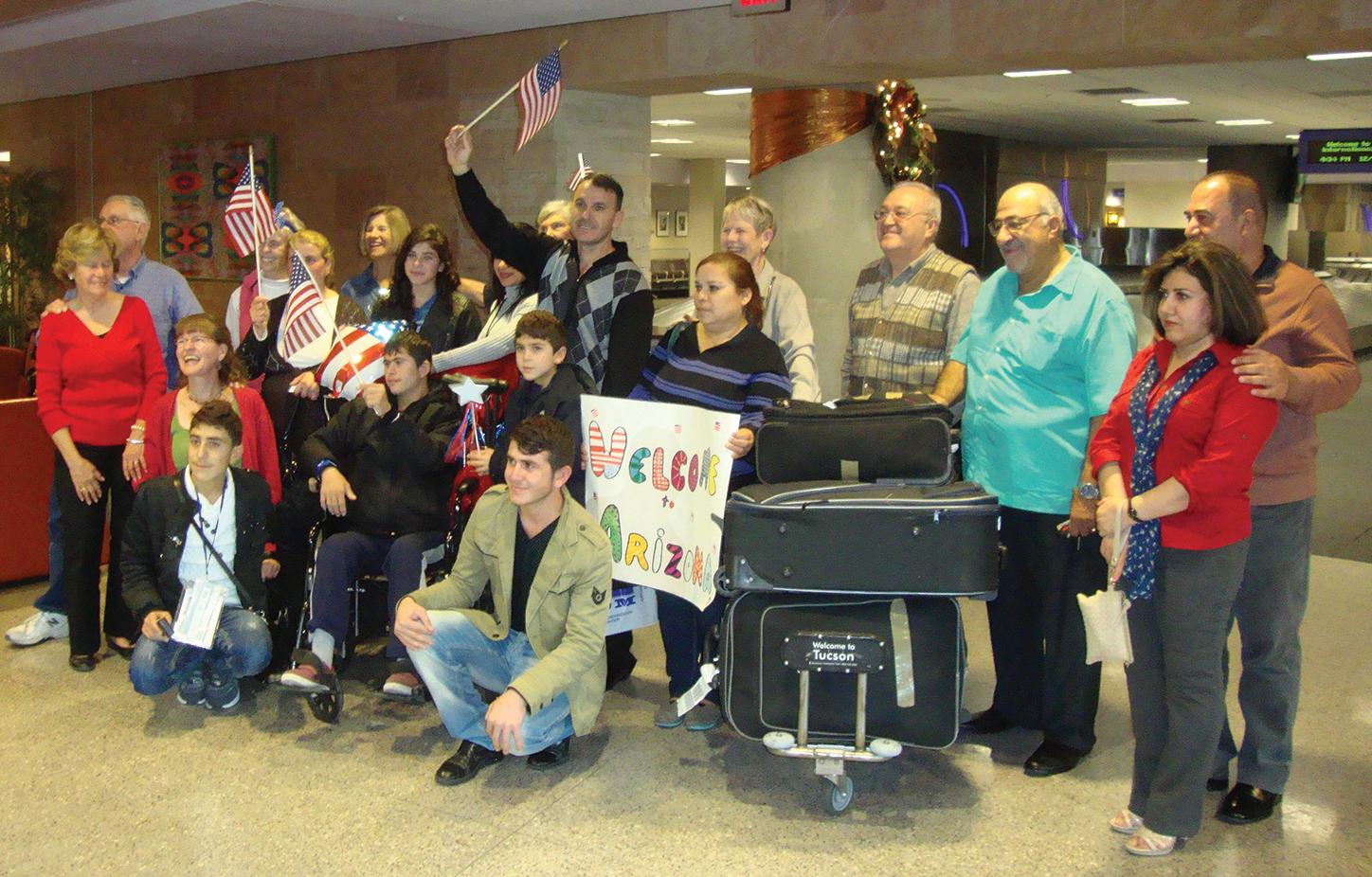
The father has continued attending the Arabic-speaking church and is slowly including his family in his new community.
How Your Church Can Begin
Frank and Caroline Martin’s background is unique, and Tucson is more heavily populated with refugees than many American cities, but displaced refugees are already living in all 50 states. Millie Pattee encourages churches everywhere to begin ministering to the refugees in their midst. “Any church in any part of the country could do this,” she said.
Before they left, the Martins’ new friend asked them to pray for his family. Surprised by the request, the Martins reiterated their Christian faith and told him plainly that they always pray in Jesus’ name. The man had begun attending an Arabic-speaking congregation in Tucson, and gladly agreed.
Miraculously, the Martins found their friend’s family and were even admitted into the refugee camp where they prayed to the one true God in a tent with a group of Yazidi refugees—some of whom had lost immediate family members to ISIS executioners. Caroline remembers the prayer meeting as one of the most powerful spiritual experiences of her life. Paraphrasing Psalm 34:18, she said, “Jesus shows up for the brokenhearted.”
Months later, God answered the Martins’ prayers for their new friend and his family. In December 2015, the entire family received permission to leave the refugee camp and traveled to Tucson, where
To launch a refugee ministry at your church, or for a list of refugee organizations in your city, visit Refugee Highway Partnership North America at www. rhpna.com. (For additional information about refugee programs in Tucson, Arizona, or the specific ministries mentioned in this article, e-mail Caroline Martin at martins4turkey@msn.com.)
The Martins say that reaching out to refugees who have lost everything, including their trust in others, brings profound rewards. For everyone involved in the refugee ministry at Pantano Christian Church, it is a joy to obey the Lord’s command in Leviticus 19:33, 34: “When a foreigner resides among you in your land, do not mistreat them. The foreigner residing among you must be treated as your native-born. Love them as yourself, for you were foreigners in Egypt. I am the Lord your God.”
from previous page
Note: Due to the sensitive nature of the situations described in this article, some names and places have been removed to protect the people involved.
38 CHRISTIAN STANDARD
Justin Horey is a writer, musician, and the founder of Livingstone Marketing. He lives in Southern California.
“Any church in any part of the country could do this.”
Frank and Caroline Martin (far left) with a team of volunteers from Pantano Christian Church’s refugee ministry welcoming a Yazidi family at Tucson International Airport in December 2015.
y Restore Church, Silver Spring, Maryland
‘My only memory is war’
BY AARON THOMAS
“In front of us was the Turkish border, and their soldiers were shooting at any refugees they could see. Behind us, we had ISIS,” said “M,” a Syrian refugee describing his flight from Syria and attempt to sneak across the Turkey border.
“This is what the media doesn’t show,” he continued. “The media shows people coming over on boats. The hardest part is getting out of Syria because Turkish soldiers are shooting at anyone trying to cross their border, and ISIS will kill us if we go back. One night, a woman and her baby running next to me were shot and killed. I hid with a group of people for 15 days before we were able to sneak across the border.”
At a Greek church on my church’s trip last May, we sat with families who were made up of women and children. Of the four families, three of the fathers had been killed. Becky, one of our team members, described a widow’s reaction to being asked about her husband: “Her posture changed to a slumped forward position, almost as if fluid was draining out of her and causing her to lose the ability to sit up. She spent quite a few minutes in this position with her hand on her chin, holding her upper body up.”
“D,” a 10-year-old Afghan boy, is learning English, so Becky and I tried to think of essay topics he could use to practice his writing.
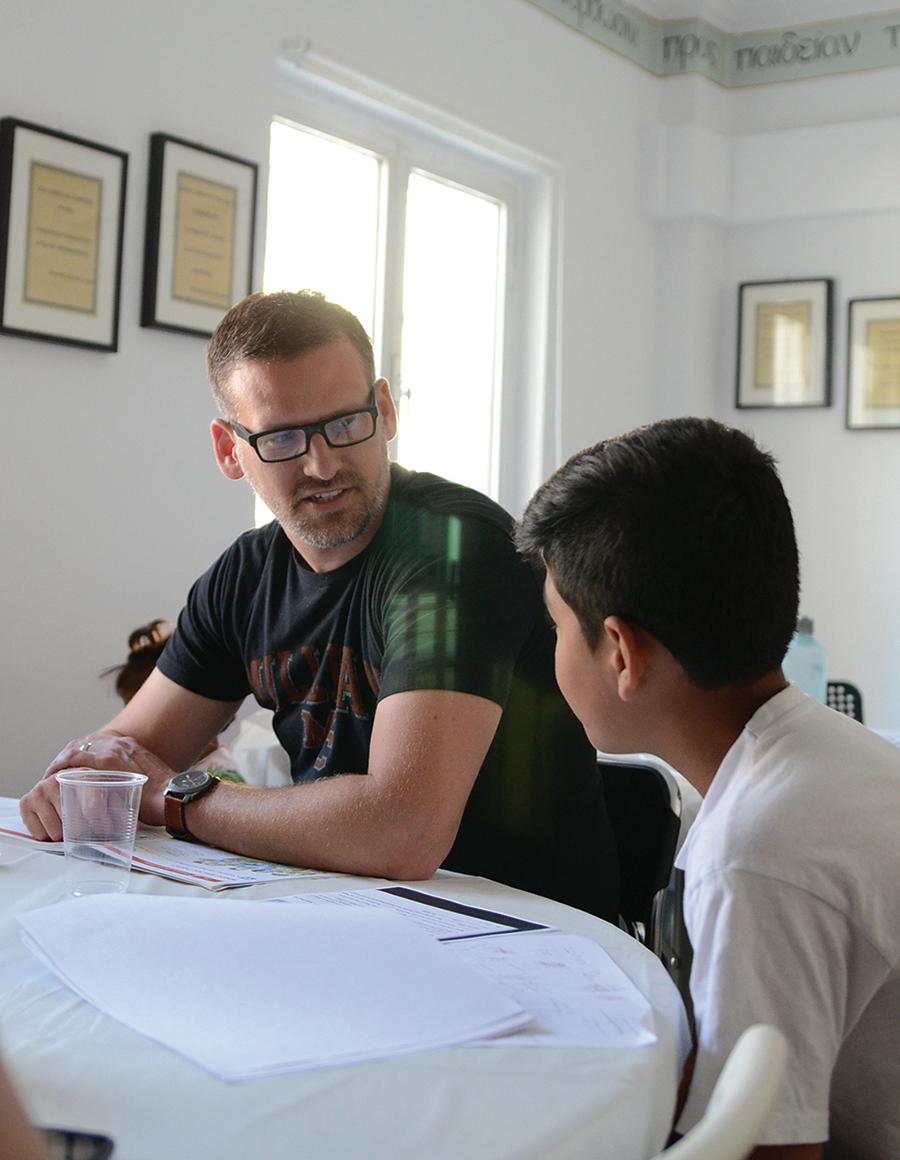

“Write about your favorite memory from your childhood,” I said.
After thinking for a few seconds, he
shrugged and said, “My only memory is war.”
The devastation these families are experiencing is total: physical, emotional, and spiritual. They fled their home countries because they were being hunted, bombed, and murdered only to arrive elsewhere and be viewed as a suspicious problem. Every fiber of dignity and worth has been taken from them. In every way, they are experiencing hell on earth. And as Christians who believe in the vision of the Lord’s Prayer and of Heaven coming to earth, we had to get involved.
Haunting Image
In early September 2015, the world was haunted by the image of a 3-year-old Syrian boy whose lifeless body had washed up on a beach. His name was Aylan. As the parents of three young boys, my wife, Karrie, and I were haunted, and so were many others. Amy, a friend and Restore Church leader, texted me about it. She recalled thinking, These are my children, they’re hurting. Do something! Another Restore member, Kelly, was the first to contact me and suggest a church response.
Kelly wrote this in her journal on September 5, 2015:
Once my eyes were opened to this ongoing tragedy I felt helpless as an individual, but felt some hope in joining together with others who were feeling the same way, wanting to do something, but not knowing what that something was. It was a natural step for me to send
Aaron and Karrie a text saying Restore needs to get involved.
Amy summed up Restore’s culture and response,
As a community, RC tries to listen for the Holy Spirit. Listening for whom to be good news to, whether in our neighborhoods or across an ocean. It was so clear that God was telling us to move in this crisis. So we did.
Karrie and I planted Restore Church in 2012. Our church community is located in downtown Silver Spring, Maryland, a city just north of Washington, D.C. We began to research ways to come alongside efforts already underway in serving the refugees. After much research and discussion, we decided to support Medical Teams International and Heart for Lebanon.
During our Sunday worship gathering on September 13, 2015, I announced that all offerings given that day would go to those two organizations, both of which have long histories of refugee advocacy. We partnered in this effort with our friends and fellow church planters Ben and Shaina Thompson of City Campus Church, Co-

MARCH 2017 39
Continued on next page
These families fled their home countries because they were being hunted, bombed, and murdered only to arrive elsewhere and be viewed as a suspicious problem.
Aaron Thomas speaks with “D”—a 10-year-old Afghan refugee—at a local church in Greece in May 2016. A Restore Church team spent a few hours there each day having lunch, teaching English lessons, and playing games with kids.
‘MY ONLY MEMORY IS WAR’
Continued from previous page
lumbus, Ohio. Together, our churches gave almost $10,000 that day to Medical Teams and Heart for Lebanon.
After that gift, Servant Group International—another Christian organization with a great history of serving Muslims in the Middle East—crossed our path. SGI was stepping up its operations in Greece, which has become the gateway for most refugees. SGI needed volunteers to serve refugees in the camps, squats, and ports of Greece.
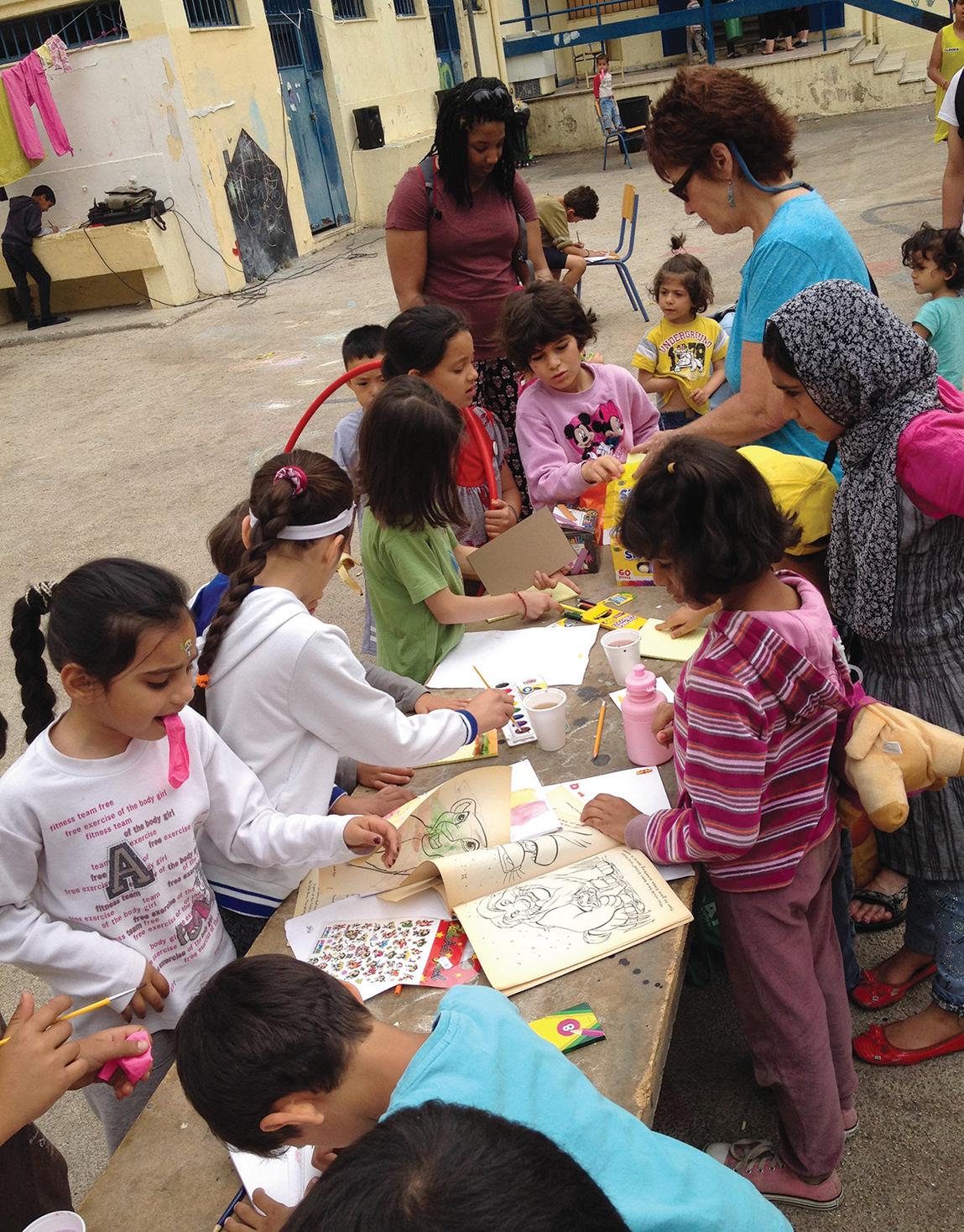
Learning Lessons
We sent our first team of Restore members in May and a second team in November 2016. Restore has two additional trips to Greece scheduled this year. We are leveraging every resource we have to serve refugee families in need.
We are called to change this story. A tragedy is unfolding, and we are not OK with it. Americans seem to drastically underestimate the political brilliance and humanitarian savvy of Jesus Christ.
Through our mission, here is what we have learned.
Jesus doesn’t draw circles and boundaries, he erases them. He erased the boundary between Heaven and earth, God and humanity, Jew and Gentile, death and life. Boundaries mean nothing for us, his followers. These people are no longer refugees; they are family. They are no longer immigrants; they are neighbors. They are no longer enemies; they are friends.
Incredible things happen when we believe this and act on it. I’ve watched relational walls come crashing down over a shared meal and conversation with Muslim refugees. Communion isn’t just a stale cracker and bitter grape juice on Sunday morning; the shared meal is a political and relational strategy that Jesus introduced to the world . . . and it’s wildly successful.
Perfect love needs to cast out fear. I’m appalled at the fear-based response of American Christians toward immigrants and refugees. In November, I took my 17-yearold Syrian friend “O” out to lunch. He had fled Aleppo with his mother and two younger brothers. His father was killed.
He asked me, “Why do Americans not like us?”
My answer: “Because they don’t know you, which makes them afraid of you. If they met you, they would love you.”
The fear that grips a lot of American Christians needs to
be replaced with love. The more people we can get to operate out of a well of love, rather than a well of fear, the sooner this crisis will end.
Jesus did not give us the cross just to save us from our sins. He gave us the cross to demonstrate the power of agape, selfsacrificing love. He gave us the resurrection to show the world that love conquers all. The cross and resurrection is a political and relational strategy, and our refugee friends need more people to believe this and live it out.
They need friends. For years they have been hunted, imprisoned, tortured, and murdered only to escape to places that view them as a problem to be ridded rather than people to be loved. They need contact and friendships with people who care for them.
In conversations with refugees, I can actually see the physical and spiritual restoration occurring in the midst of our time with them. They just need to be reminded that they are beautifully and wonderfully made, and that they are cherished. Our presence in the squats, camps, and ports literally brings life and dignity back to them.
They need advocacy. We have an opportunity and a calling to be a prophetic voice in our country. Our refugee family needs people who will stand against ignorance, fear, racism, and nationalism. These are preventing justice from entering this crisis. The church needs to remember and recover her prophetic voice and her ability to change the world by advocating and standing with our refugee family.
I can’t help but think of Jesus standing between the adulterous woman and the Pharisees, as well as other efforts for good, such as the Underground Railroad, aiding Jews in Nazi Germany, and the Sanctuary Movement of the 1980s. We should look for every opportunity to advocate and stand against the evil that is oppressing our refugee family. Notice that Christlike advocacy doesn’t involve violence, but only love and truth.
Through all of this, Restore’s hope is that the refugees’ memories will no longer be of war, but of friends who came to walk with them out of hell, and into a restored life. We know it’s not a pipe dream because the grave is empty, the King is on the throne, and his church is responding to his voice.
40 CHRISTIAN
STANDARD
Aaron Thomas serves as pastor with Restore Church, Silver Spring, Maryland. He travels to Athens, Greece, twice a year as part of a church effort to serve refugees.
Haniska Prinston (top left) and Lisa Harris (top right) hand out games and activities for refugee children at one of the squats in Athens, Greece. Many refugees left the United Nations’ camps and settled in these squats (settlements such as abandoned hotels or elementary schools). Different groups come in with food, supplies, and volunteers to serve the refugees.
‘Love your neighbor as yourself’
BY MATT AND JORDAN McGUIRE
Early one Thursday morning, we pulled into the parking lot of an apartment complex in an area of Louisville, Kentucky, that is oftentimes overlooked. We were among a small group of folks from area churches who drove four Syrian families to Kentucky Refugee Ministries for their first orientation class. We were some of the first Americans they had met, and they were putting their trust in us to drive them an unknown distance to an unknown place.
We could sense their anxiousness, as they had just arrived in America the previous night. Though it was a relatively short drive, it seemed to take hours due our inability to communicate. We quickly made an emotional connection, however.
The children peered out the windows as we passed many restaurants and stores—there was curiosity in their eyes. What was so foreign to these families was home to us, and we couldn’t wait to play a role in helping them make our home their home.
Our Own Backyard
We could never have imagined the Lord would lead us to this place. How was it possible that for many years we didn’t know Louisville accepted thousands of refugees every year? There are areas in Louisville where hundreds of different languages are spoken. The Lord is providing opportunities to engage with the nations in our own backyard.
For the last few years, members from multiple churches in Louisville have helped teach English on Sunday afternoons in a park in the middle of an apartment complex. We simply called it “English in the Park.” Learning English is a huge need for many of the refugee families that are coming into the United States. Providing help in this area has been a great way to build relationships with families as they move into the surrounding apartments. In
the process of teaching English, many of us have learned Arabic words.
Meeting with these families in the park each week has allowed us to hear about where they came from. Many of the stories are filled with the loss of family members, homes, and identity. We quickly realized that seeing these families on Sunday evenings wasn’t enough, and so many of the volunteers would visit families throughout the week to help with kids’ homework, take people to doctor visits, and just continue to build relationships.
Overcoming Barriers
There are many perceived barriers to serving refugees that deter people from
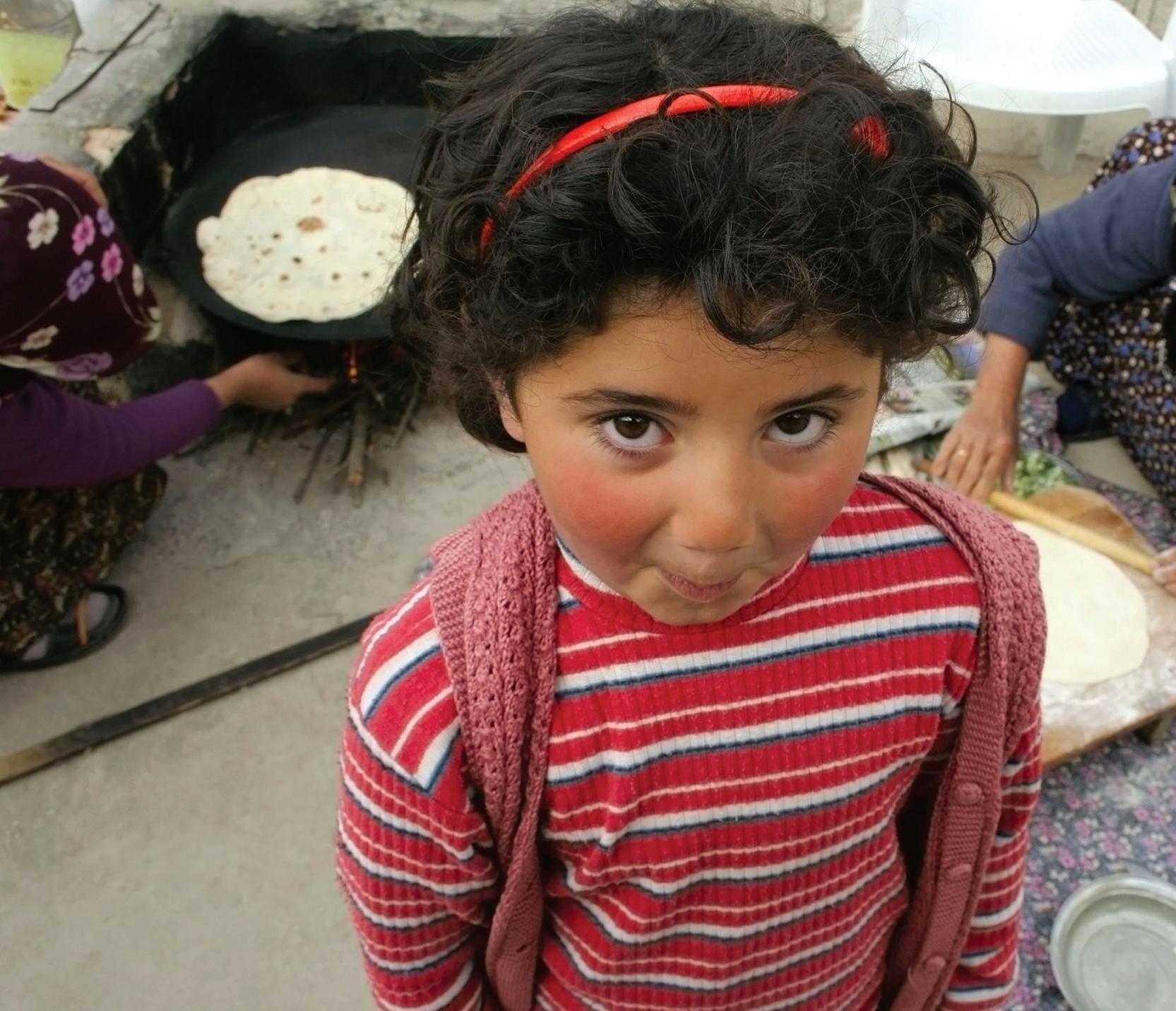


coming alongside to help. The biggest barrier is fear. Whether individual American Christians agree with our nation’s immigration policy or not, the immigrants and refugees are here, and the church has an amazing opportunity (and a command) to reach out to those who would otherwise be difficult to reach with the gospel. It would be easy to give in to fear and indifference, but God has called us to love the foreigner.
Our refugee ministry began when we participated in a weekend service trip with Refuge Louisville, which helps mobilize local churches to reach out to serve
MARCH 2017 41
y Southeast Christian Church, Louisville, Kentucky
Continued on next page
It would be easy to give into fear and indifference, but God has called us to love the foreigner.
©Hemera/Thinkstock
‘LOVE YOUR NEIGHBOR AS YOURSELF’
Continued from previous page
refugees throughout the city. When we learned we would be spending time with Iraqis, we experienced fear in our own hearts. We prayed that our hearts would be open, and God was faithful.
One evening during the trip, we entered an apartment to share a meal with an Iraqi family. They shared everything they had with us. They were hospitable. They were kind. They were tired. They needed friendship and love. They were human.
The barriers came crumbling down. Our hearts shattered in repentance, and our desire to serve these families grew.
Another barrier to refugee ministry has been bringing together multiple
churches to meet the needs. Churches will sometimes mark their territory, but this is not conducive to bringing about lasting change within a city.
We are blessed to have organizations like Refuge Louisville to help bring churches together for the purpose of serving refugees. Because of what Refuge Louisville does, we have been able to partner with many churches in our city to serve refugees as one body.
Satan has been the final barrier, for he does not like the type of work we are doing. Gathering to pray has been of utmost importance to our success. We could always do better in this regard, but we have seen the Lord’s purposes flourish as we
have spent time praying against Satan and his schemes.
We can often forget that prayer is just as important as spending time in a refugee’s home. We have seen God work in amazing ways as we have gathered together to pray. God is moving among refugees, and he allows us to be a part of his work. It has been such a privilege and honor to join God in this work, and to share in the hope and salvation we have in his Son. We are often reminded of Jesus’ words, “Love your neighbor as yourself” (Mark 12:31).
Matt McGuire serves as community pastor with Southeast Christian Church, Louisville, Kentucky. Jordan McGuire serves as director of engagement and care at Life In Abundance, also in Louisville.
y Life on the Vine Church, Long Grove, Illinois
Our ministry to refugees
 BY JULIET LIU
BY JULIET LIU
She gestures at her stomach, making a bulging motion with her hands. Then she looks up and points at my belly. “You?” she asks. Embarrassed, I pat my stomach . . . a few inches larger than I’d like it to be.
What is she asking? Is she pointing out the extra pounds I’m carrying from the holidays? I know some cultures don’t have the same stigma against extra weight that Americans do, but still . . . isn’t it kind of rude to call attention to my belly?
The “conversation” continues like this for a while. She seems embarrassed that I cannot understand what she is saying. I feel flustered as well. She points again at my stomach and then turns to our children playing together on the floor of the apartment. They’ve gotten out the UNO cards—excellent practice for learning colors and numbers together in English. Gesturing to them, and then again to my stomach, she asks again, “You? More?”
Oh, that’s what she is asking! “More
children?” I say to her. She nods her head. Whew, I think. “Who knows?” I reply. I gesture up toward Heaven with my hands open. It is a physical motion we have used over the past few months to communicate something along the lines of, “If God wills it.”
I ask her the same question, “You? Would you like to have more children?” She smiles, shrugs her shoulders, and makes the same gesture toward Heaven in reply.
Bridging the Divide
Short, broken phrases and charade-like conversations—these have been the bulk of our exchanges over the past 12 months. It is a setting that has been fraught with miscommunication and misunderstandings like the example above. We reach for one another, grasping for words, motioning with our hands . . . simply to communicate what I can normally say in just a few short phrases.
Language, culture, religion: these
three things stand between us like a giant chasm. What kind of fools would attempt to bridge this divide?
And yet I would not trade these past 12 months for anything in the world.
One year ago in December, my church community welcomed a Syrian Muslim refugee family to Chicago: two grandparents, a mom and dad, and their four children. (I cannot share their names, as they still worry about threats to their safety from their country of origin).
I still remember the day they arrived. They were tired from the long airplane ride, and they were frightened—eyes darting around at their new surroundings. Winter in Chicago is not a welcoming environment. The wind and the cold were fierce those first months. But we had done our best to prepare their new apartment, making it as warm and welcoming as we were able.
For two months before their arrival, we had gathered items like beds, pots and

42 CHRISTIAN STANDARD
pans, shower curtains, dishes, and tables to fill their new home. We partnered with a local resettlement agency in Chicago that walked us through the process and helped us raise $16,000 for the family— money that would help cover expenses like rent, food, clothes, and medicine for their first year in the United States.
Even before the family arrived, we faced disappointing challenges. The date of their landing kept being pushed back by the U.S. State Department. In November 2015, the governor of Illinois and other governors around the United States declared that their states would no longer accept Syrian refugees out of the fear they could be terrorists. Our hearts fell.
When we received notice in December that our family would indeed be coming, we celebrated. We had only a few days to clean and set up the apartment with all of the items we had gathered. My children drew welcome signs with colorful hearts and smiley faces. A friend who reads and writes Arabic helped us to write welcoming words in their own language.
The Real Work
But the real work began after that first meeting. During the first few weeks, members of our church team visited the family daily. We accompanied them to grocery stores, taught them how to use public transit, and sought out secondhand stores to find winter clothing for everyone. We addressed issues with their landlord, like heat that would not turn
on, a broken stove, and bedbugs. Many refugees face emotional and psychological trauma because of their experiences, but they are expected to start their lives over in an unfamiliar land without missing a beat. Mountains of legal papers need to be filled out. Medical issues—some which have been building up for many years—need to be addressed, and this involves countless hours in waiting rooms. English language classes are required every day of the week. Children need to be enrolled in school and homework must be completed, despite obvious obstacles with language differences.
It may take years for the family we are helping truly to feel at home. We are learning that being friends to our family does not mean fixing all of their problems. It does mean being with them in all of the difficulties they face and grieving with them when they miss home. We are learning to give help when they ask for it, but mostly, to support them as they solve problems for themselves.
The biggest surprise to me over these past 12 months has been how blessed I have been in this process. When our church decided to minister to these refugees, I believed we would be the ones doing all of the blessing and they would be the ones receiving it. I was wrong.
Through it all, we are being changed ourselves. Our team has often felt unprepared and ill-equipped to support a family whose language we do not speak, and whose culture and religion are unfamil-

iar. Understanding one another is hard.
I remember, early on, a member of our church team blurting out, “I just don’t think I’m very good at this! Maybe I shouldn’t be doing it!”
“Nobody is good at this!” I smiled. “We will do it anyway, with God’s help.”
Forward by Faith
We have had to walk forward with a level of faith that has perhaps never been required of us before, trusting God to work in spite of our inabilities and inadequacy. The problems this refugee family faces are much larger than our single church community can tackle. We are learning reliance on God for things that are much too big for us to handle alone.
More than that, befriending this family has meant confronting things in my own heart of which I was unaware. I have found myself in places I would not usually go, like a supermarket where most people speak Arabic.
If you had asked me a year ago if I held prejudice in my heart against Muslims, I would have flatly answered, “No!” And yet I found early on that there was a tightening in my stomach and a quickening of my pulse whenever I found myself surrounded by women whose heads were covered with hijabs.
Having entered into a friendship with people that some in this nation see as “enemies,” I have discovered a community that had been invisible to me. Now when I am out, I see people and faces I was once accustomed to ignoring or treating with suspicion.
I have been blessed by the warmth and friendship of this family. Each time I visit, women greet me with kisses on the cheek and a warm shake of the hand. Sweet tea and coffee are offered in bounteous quantities. Our children play together happily. Food is often heaped in front of me. I am humbled by their generosity, knowing they offer it even though they have very little.
Jesus is not just helping my Syrian friends through this relationship—he is helping me too. In this past year, strangers the world says should be enemies have become friends. I have welcomed them into my life, and I have received their hospitality and been humbled by it.
Though the journey has been difficult, we are experiencing Christ in the midst of it. And Christ’s kingdom is being built as we seek to be obedient to our King.
MARCH 2017 43
©iStock/Thinkstock
Juliet Liu serves as pastor with Life on the Vine Church, Long Grove, Illinois, and as an adjunct professor with Trinity International University, Deerfield, Illinois.
Solomon Syndrome
Why smart leaders make dumb decisions
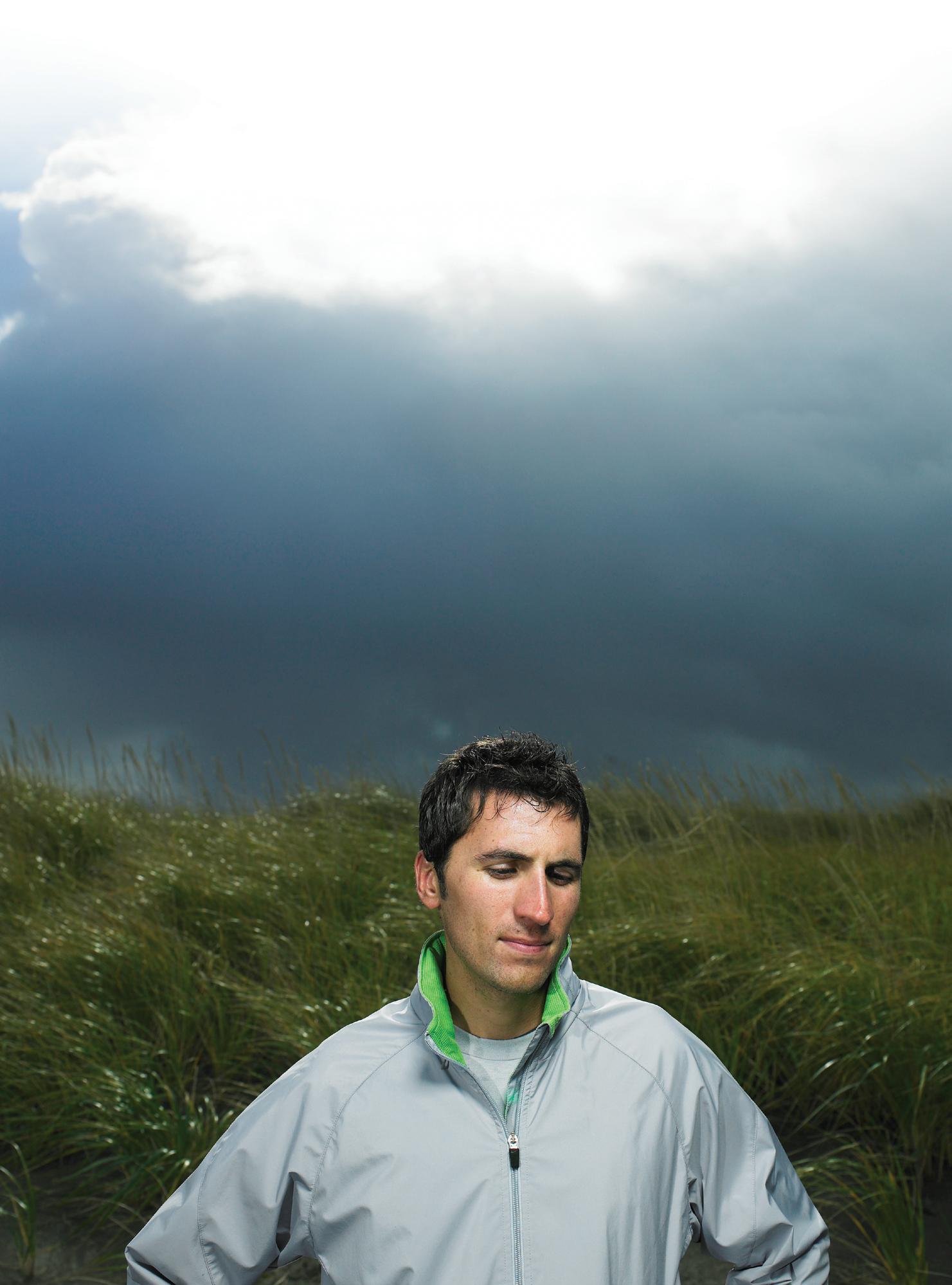 BY DANIEL SCHANTZ
BY DANIEL SCHANTZ
When an old friend of ours left his wife for a younger model, I was dumbstruck. “He’s smarter than that,” I said to my wife. “He knows better.” His villainy didn’t bother me as much as his sheer stupidity.
We all do stupid things, like texting and driving, but when someone really smart does something dumb, well, that’s just inexcusable. And yet, being smart doesn’t make it any easier to behave. Being good has more to do with emotions and willpower than with brains.
Smart people have all the same temptations we all do, plus some that are unique to intellectuals. Ancient King Solomon was as bright as they come, but with his IQ came some powerful pressures.
Boredom
Boredom begins early in life for the gifted. Gifted children often have trouble with school, because school is designed for “normal” children. The gifted child quickly tires of easy assignments, and his or her mind drifts off to more challenging worlds during lectures. A gifted program may be the only thing that can rescue a gifted child from his ennui.
King Solomon was a brilliant contractor who built a world-class civilization in just 20 years. But the experience left him cold. It didn’t live up to his expectations. In Ecclesiastes, he said it was like “striving after wind” (1:14). He also said, “All things are wearisome” (1:8), and “Vanity of vanities! All is vanity” (1:2, New American Standard Bible).
We ordinary minds might be deliriously happy with just one of Solomon’s beautiful wives or just one of his swimming pools.
My wife, who loves the simple life, would have disagreed with Solomon’s conclusions. She would say, “All things are full of joy,” and, “Interesting, interesting, all things are interesting.”
Solomon, however, was a man of astronomical aspirations. Such men are often frustrated with the prosaic nature of everyday life. His wives and servants probably enjoyed his kingdom far more than he did.
Loneliness
By definition, leadership is a lonely business. Leaders are chosen precisely because they are exceptional, but their burdens are also exceptional. For instance, if you are a minister, teacher, elder, or a Christian college administrator, then you understand how leaders have to push against a steady gust of criticism, much of it petty, some of it harsh and unfair.
44 CHRISTIAN STANDARD
©Photodisc/Thinkstock THE
A student came up to me after class to correct me: “You said that the angel fell prostate before God, but angels are not males, they don’t have a prostate gland. You should have said ‘prostrate’ not ‘prostate.’”
I blushed at my error, but constructive criticism is helpful. It’s when criticism is vicious or relentless that it becomes like verbal sandpaper, wearing away at a leader’s motivation.
Leaders have to make unpopular decisions—like firing good employees because of budget cuts or revised objectives, giving negative performance reviews, and confronting an employee who is gambling online or a deacon who is too cozy with a pretty worship leader. There is no nifty way to do these things without getting slimed in the process.
Christian administrators must meet a payroll with unpredictable income. When the money doesn’t come in, they must face the crestfallen faces of fathers and mothers. Leaders often must push employees to perform, but employees may not have their leader’s level of ability, and they rebel. Then the leader feels rejected and may seek solace from a sweet and understanding secretary.
King Solomon had several million citizens to oversee, plus a staff of 10,000 to feed and house. He had cities and roads to maintain, visiting dignitaries to entertain, and a thousand ladies to take shopping at the Gaza Strip Mall.
Everyone praised his glorious, glittering kingdom, but then the bills arrived and taxes went through the roof. Then came the day when taxes would not cover the expenses, and he put his own people to work as slaves. At that point Solomon lost his people’s affection and respect. It was a lonely time for him, even if it was his own fault for overextending.
The higher a leader goes, the lonelier it gets, and with loneliness comes temptation.
Power
Brainpower is like money—it can do great good, or it can destroy. The most educated and cultured country on earth gave us Adolf Hitler and his henchmen. They were brilliant men, but “bad to the bone,” and they used their mental powers to wreck the world.
Being smart can actually make it easier to do evil. Smart leaders can see ways to cheat and not get caught. They have insider infor-
mation, spyware, computer passwords. They have keys and combinations to vaults and private files. They have informants and cronies. This kind of trust can easily be exploited for personal gain, and sometimes it is.
Leaders usually have high confidence and a healthy ego; these are necessary to achievement, but confidence is like a pet cobra, it can turn on you. Wall Street hot shots, for example, are usually hightestosterone types who thrive on risk, but that very strength can lead to greed and their downfall.
King Solomon was given enormous power—a blank check to build a Camelot in the desert, but he went “a bridge too far,” and all Israel paid dearly for it.
Blindness
Most smart leaders have at least one blind spot, an area where they may be as ignorant as dirt. We professor types are fabled for our absentmindedness, for example.
Harvard’s Howard Gardner researched and wrote about “multiple intelligences.” He showed us that no one person has all the different kinds of brainpower. A creative genius like Walt Disney might not be able to balance his checkbook. A computer whiz may be a grand bore at a party. A social charmer can’t hold a job because she is always late to work.
Solomon’s weakness was women. In those primitive times, God tolerated polygamy, but there are problems every time polygamy is mentioned in the Bible. Kings had harems to guarantee many descendants, but also for security reasons. What foreign king was going to attack Solomon, knowing that his own daughter was in Solomon’s palace? But harems were seriously problematic.
Wives are famously influential. My wife is smarter than me in most areas, and I usually yield to her judgment. But sometimes she is too protective of me or has a hidden agenda. I have to know when to ignore her, even if it means I eat nothing but bread and water for a month and sleep on the back porch.
As Solomon got older, his charms were likely waning. His hair was thinning, his gut protruded, and he was missing a couple of teeth. His wives would say, “Solomon, sweetheart, you are such a sheik! You are just as handsome as the day we met you.” He swallowed that bonbon whole, so they went further. “You know, you are such a broad-
minded, cosmopolitan man, why don’t you come worship our gods sometime? You can still worship Jehovah, of course, but we would be so proud to have you on Ashtoreth Advent.”
Sharp as he was, Solomon saw no flaw in their logic. But some things in life just don’t mix. Ice cream and chocolate go well together, but if you mix ice cream and manure, you still have manure. So Solomon went to their high places, but it was odiferous to God, and it was the last straw. The greatest leader in the world lost his kingdom because of his blind spot.
Perspective
When I hear that someone smart has done something stupid, I need to be humble about it, knowing that they may have trials I haven’t had to face.
Fallen leaders absolutely must be held accountable because of their far-reaching influence. They must be disciplined back to spiritual health, if they are willing. But in the process we need to remember mercy. After all, they were willing to take on challenges that no one else would attempt.
The works that great men and women do often outlive their personal failures, and some leaders go on to do their best work after they have been humbled by disgrace. Like Simon Peter, who became the keynote speaker on the first day of the church.
King Solomon’s empire attracted people from the ends of the earth. When they came, they learned about Jehovah God, and they took that knowledge home with them. And two of the most popular and valuable books of the Bible, Proverbs and Ecclesiastes, contain spiritual gold, sifted from the ore of Solomon’s blunders.
Just because leaders fail does not mean they can’t go to Heaven. Was Solomon saved? Second Samuel 7:15 suggests to me that he was: “My mercy shall not depart from him, as I took it from Saul.”
The higher the fall, the more it hurts. Public shame is a bitter pill to swallow, and fallen leaders need our prayers and compassion, if they are repentant.
Never do we need love more than when we have failed.
MARCH 2017 45
Dan Schantz taught the books of Proverbs and Ecclesiastes for two generations at Central Christian College of the Bible, Moberly, Missouri.
Lady Wisdom, Ben Franklin, and the
BY JAY ENGELBRECHT
Your creator designed you to live healthy and well.
How can we cooperate with his yearning for our best?
Let’s test your knowledge of the book of Proverbs. Three of the quotes below come from Eugene Peterson’s modern paraphrase The Message, while the other two come from founding father Benjamin Franklin. Can you identify the source of each?
1. “Don’t stuff yourself; bridle your appetite.”
2. “He that won’t be counseled can’t be helped.”

3. “When you’re given a box of candy, don’t gulp it all down.”
4. “Eat to live, don’t live to eat.”
5. “It’s not smart to stuff yourself with sweets.”
How did you do? The even-numbered quotations came from the writings of Benjamin Franklin, while Nos. 1, 3, and 5 come from Proverbs 23:3, 25:16, and 25:27, respectively.
In Proverbs 8:32-36, Lady Wisdom implores those who would follow her to: “Listen carefully; those who embrace these my ways are most blessed. Mark a life of discipline and live wisely; don’t
squander your precious life.” By the end of the chapter, she’s even more blunt: “When you reject me, you’re flirting with death.”1
Lady Wisdom is on the money, according to a May 9, 2014, article from the Centers for Disease Control and Prevention.2 Let’s see whether you know this stuff already.
Successful man-made food products fulfill two imperatives: a long shelf life and a wide profit margin.
Which of the following preventable behaviors cause most of the chronic disease rampant in the United States?
A. Lack of physical activity
B. Poor eating habits
C. Smoking cigarettes
D. Drinking too much alcohol
E. All of the above
If you answered “E. All of the above,” you are correct. Most of you reading this article avoid C and D, while more than half of you struggle with A and B.
Which of the following chronic diseases could be prevented or minimized by behavioral choices?

A. Heart disease
B. Cancer
C. Diabetes
D. Arthritis
E. All of the above
According to the same article cited above, the correct answer is again “E. All of the above.”
Bridle Your Appetite
Let’s revisit Lady Wisdom to see what we can learn, starting with this one: “Don’t stuff yourself; bridle your appetite” (Proverbs 23:3).
Few of us are gluttons, so why are more than a third of us obese?3 We overeat for two reasons. First, we are calorie rich and nutrient poor. We eat and keep eating simply because we never give our bodies the nutrients they crave.
Genesis 1 opens with God speaking creation into existence and concludes with God speaking to Adam: “‘See, I have given you every herb that yields seed which is on the face of all the earth, and every tree whose fruit yields seed; to you it shall be for food.’ Then God saw everything that He had made, and indeed it was very good” (Genesis 1:29, 31, New King James Version).
To us, man-created food looks very good. Kellogg’s Fruit Loops are full of color—like fruit—but they’re manufactured, not to satisfy and sustain the human body,
46 CHRISTIAN STANDARD
We can learn . . . and prosper . . . by paying attention to all three!
Marlboro Man
but to be purchased and consumed by loyal, repeat customers. Satisfaction and satiation are not part of the bargain.
Successful man-made food products fulfill two imperatives: a long shelf life and a wide profit margin. Chemical preservatives ensure the first, while abundant use of cheap, government-subsidized corn guarantees profitability.
Look at the back of a Fruit Loops box and you can read for yourself:
Ingredients: Sugar, corn flour blend (whole grain yellow corn flour, degerminated yellow corn flour), wheat flour, whole grain oat flour, oat fiber, soluble corn fiber, contains 2% or less of partially hydrogenated vegetable oil (coconut, soybean and/or cottonseed), salt, red 40, natural flavor, blue 2, turmeric color, yellow 6, annatto color, blue 1, BHT for freshness. Vitamins and Minerals: Vitamin C (sodium ascorbate and ascorbic acid), niacinamide, reduced iron, zinc oxide, vitamin B6 (pyridoxine hydrochloride), vitamin B2 (riboflavin), vitamin B1 (thiamin hydrochloride), vitamin A palmitate, folic acid, vitamin D, vitamin B12.)

In his essay “We Are What We Eat,” food journalist Michael Pollan writes that when you break down a typical fast-food meal, you’ll find “corn is the sweetener in soda. It’s in the corn-fed beef Big Mac patty, and in the high-fructose syrup in the bun, and in the secret sauce. . . . Of the 37 ingredients
in chicken nuggets, something like 30 are made, directly or indirectly from corn.”⁴



























Watch Out for Sweets
So one reason we overeat is our hunger for nutrients. The second reason takes us back to Proverbs: “It’s not smart to stuff yourself with sweets” (Proverbs 25:27).
Imagine three round, white, plastic tables. On one table are bottles of Old No. 7 Jack Daniel’s Tennessee Whiskey and cartons of Marlboro 100 cigarettes. But you’re no dummy; you know those products are designed to be addictive. You may also know that Marlboro cigarettes contain tobacco, high-fructose corn syrup, propylene glycol, diammonium phosphate, ammonium hydroxide, and natural and artificial flavors.
The second table is loaded with Mountain Dew, Coke, Pepsi, and boxes of Honey Nut Cheerios, Special K, Corn Flakes, and Rice Krispies surrounded by Heinz Ketchup, Log Cabin syrup, Cheez-Its, Skippy peanut butter, Welch’s grape jelly, Yoplait strawberry yogurt, Pop Tarts, and Nilla Wafers.
If you’re a soda drinker, you probably try not to think about what’s actually in the can. The ingredients in Mountain Dew are “carbonated water, high-fructose corn syrup, concentrated orange juice, citric acid, natural flavor, sodium benzoate (preservative), caffeine, sodium citrate, erythorbic acid (preservative), gum arabic, calcium disodi-




um EDTA (preservative), brominated vegetable oil, yellow 5.”









If you scan the ingredients in Honey Nut Cheerios you’ll see the following: “whole grain oats, sugar, oat bran, corn starch, honey, brown sugar syrup, salt, trisodium phosphate, rice bran and/or canola oil, natural almond flavor, vitamin E (mixed tocopherois) added to preserve freshness.”

What ingredient is in every single product on table two?

If you guessed sugar, you’re right. We overeat because we love the taste of sugar. For food companies, it’s smart to stuff their products with sugar, but stuffing ourselves with sweets is dumb.
Why does Lady Wisdom warn us not to overindulge in sweets?
Your liver is a poison control center, and sugar is a toxin. Your liver does the best it can by surrounding as much sugar as possible in fat (sort of like bubble wrapping a knife) and then express shipping it to the belly, hips, butt, breasts, and thighs. Much of the rest gets dumped into the bloodstream, triggering your pancreas’s red alert protocol. From personal experience, you already know all about sugar highs and lows.
Most of us avoid table one. Most of us eat and drink daily from sugary products on table two. What’s on the third table? Food . . . real food, designed by a nurturing creator. Blueberries, red peppers, green onions, walnuts, cashews, and mangoes. Avocados, carrots, spinach, and apple varieties by the score. Colorful, nutri-
MARCH 2017 47
Continued on next page
©iStock/Thinkstock
LADY WISDOM, BEN FRANKLIN, AND THE
Continued from previous page
tious, satisfying, and often ignored.
In Food Rules: An Eaters Manual, author Michael Pollan’s first five food commandments are:
I. Eat food.
II. Don’t eat anything your greatgrandmother wouldn’t recognize as food.
III. Avoid food products containing ingredients no ordinary human keeps in the pantry.
IV. Avoid food products that contain high-fructose corn syrup.
V. Avoid foods that have some form of sugar in the top three ingredients.⁵
Honestly, if you adhere to Rules I and V, you’ll be just fine. It really is that simple.
Have a Moving Life
“Slack habits and sloppy work are as bad as vandalism” (Proverbs 18:9).
Remember that list of preventable behaviors that cause chronic disease. We noted most of us don’t drink or smoke, but we tend to struggle with poor dietary choices. Well, there was one other factor—and it’s a struggle for many Christians. Lack of physical activity often trips us up. For many, it comes down to slack habits. Most of us wouldn’t dream of vandalizing (to use language from Proverbs 18:9) our bodies with Old No. 7 Jack Daniel’s Tennessee Whiskey or Marlboro 100 cigarettes, yet we
MARLBORO MAN
Marlboro cigarettes contain tobacco, high-fructose corn syrup, propylene glycol, diammonium phosphate, ammonium hydroxide, and natural and artificial flavors.
vandalize our bodies through neglect. If you are not as physically fit as you would like, let me offer advice that is simple, not easy.
1. Don’t Stress: Seriously, your creator is crazy about you. In Matthew 6, Jesus commands us not to worry. Listening to Jesus makes a lot of sense.
2. Move: Children move all the time. They roll over, crawl, pull-up, walk, run, skip, bike, swim. Sometimes you’ll hear an adult say, “I wish I had their energy.” Doing what they do creates energy. The boring alternative is sitting around. Dr. Seuss claimed, “Adults are obsolete children.” The trick is to remain childlike.
3. Play: Some adults, with grim determination, exercise. Children don’t exercise, they play.
4. Experiment: God certainly loves variety, and we’re created in his image. Ride your bike, take a Pilates class, go to the pool, search YouTube for fun fitness ideas. You are given one body in this life—treat it well.
5. Sleep: Why does sleep always get
short shrift? We are created to eat delicious and nutritious food, designed to move, and blessed with sleep. Honor those needs.
The Bible tells us, “God gives out Wisdom free, is plainspoken in Knowledge and Understanding. He’s a rich mine of Common Sense for those who live well” (Proverbs 2:6-8). May you eat well, move well, and sleep well. Your creator yearns for a healthy, whole you.
1Scripture quotations are from The Message, unless otherwise indicated.
2“Chronic Diseases: The Leading Causes of Death and Disability in the United States,” Centers for Disease Control and Prevention, May 9, 2014; accessed at www.cdc.gov/ chronicdisease/overview/index.htm?s_cid=ostltsdyk_ govd_203.
3“Adult Obesity Facts,” Centers for Disease Control and Prevention, www.cdc.gov/obesity/data/adult.html.
4Michael Pollan, “We Are What We Eat,” www. ecoliteracy.org/essays/we-are-what-we-eat.
5Michael Pollanl, Food Rules: An Eaters Manual (New York: Penguin Books, 2009).
Jay Engelbrecht teaches English and physical education at Ozark Christian College, Joplin, Missouri.
BY BECKY AHLBERG
A Comprehensive Review
“When I survey the wondrous cross, on which the Prince of glory died, my richest gain I count but loss, and pour contempt on all my pride.”
Isaac Watts penned those words in 1707. He was a masterful preacher and
poet and was known for writing hymns as part of his sermons. This particular hymn has lasted more than 300 years precisely because it captures the ethos of the cross for each of us personally. Watts was known to have three “rules” for writing: make it personal, make it sensuous (as in appealing to the senses), and make it passionate. He believed that following these rules would make the words memorable and meaningful.
We don’t use the word survey much anymore. We just say “take a good look.” But to survey is so much more. The word actually means to take a “comprehensive view.” As you approach Communion today, please do just that. What do you see? What do you hear? How do you feel? Where do you connect to your own faith? How is it personal for you? How do you react? Do you find things that are personal, sensuous, passionate?
Today, in this moment of reflection, would you take a comprehensive view of the cross “on which the Prince of glory died”? See the wounds from “His head, His hands, His feet” and wonder at how “sorrow and love flow mingled down.”
Imagine feeling the thorns that “compose so rich a crown” and imagine their cruel combination of pain and mockery. Think of your own betrayal at times.
Does the view of the cross convict you of your need for it? Does it connect to the picture of a wounded Savior with “love so amazing, so divine,” that it demands your soul, your life, your all?
May we never approach nor leave this table without taking a truly comprehensive view of the price paid for our redemption.
48 CHRISTIAN STANDARD
Becky Ahlberg serves as executive director of My Safe Harbor in Anaheim, California. Read another meditation by her each Friday in March at christianstandard.com.

Good Funerals & Neighbors, Troubled Times
BY LEROY LAWSON
The Good Funeral: Death, Grief and the Community of Care
Thomas G. Long and Thomas Lynch
Louisville: Westminster John Knox, 2013
The Neighboring Church: Getting Better at What Jesus Said Matters Most
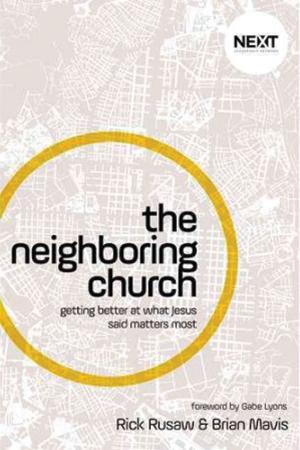 Rick Rusaw and Brian Mavis
Rick Rusaw and Brian Mavis
Nashville: Thomas Nelson, 2016
A Tale of Two Cities
Charles Dickens
First published in 1859
The Good Funeral is about the importance of funerals in “getting the dead where they need to go and the living where they need to be.” Authors Thomas Long and Thomas Lynch like this maxim of Lynch’s father so well they made it the theme of their book. Lynch is a funeral director and poet; he excels in both professions. I’ve written about him before in this column. Long is a pastor/professor. I required his The Witness of Preaching as a text in my seminary teaching days. Together these insightful, resourceful authors published a book I wish I had read as a young minister. If I had, I’d have cared for grieving families and their deceased loved ones with greater insight and skill.
When asked what I miss most about the pastorate, I always answer, “the funerals.” Nothing scared me more in the beginning. I didn’t realize then that walking with people through this trauma is a pastor’s greatest privilege. I was just afraid I would get things wrong.
Unfortunately, the authors’ lament, when it comes to funerals, our fast-food, tranquilizer-gulping, endure-anything-butdiscomfort culture gets a lot of things wrong. The minister’s role has been diminished in favor of audience participation and personal anecdotes. Often the deceased are absent from their own services. We have grown anxious in the presence of the body, afraid of silence and tears and expressions of genuine grief, so we sanitize the proceedings and pretty much scrub the sacred out of them.
Funeral director Lynch identifies the four essentials in this final drama. He says, “The corpse, the caring survivors, some brokered change of status between them, and the disposition of the dead make a human funeral what it is.” The Good Fu-
neral treats each of these essentials—and so much more—in a volume designed for professionals but helpful to all: funeral directors, “the clergy” (the authors’ broad term for professional religious leaders), and everyone faced with what to do—and why to do it—when a loved one dies.

I like the title, by the way. Some funerals really are good. This book explains what makes them so.
Good Neighbors
Rick Rusaw and Brian Mavis’s The Neighboring Church should not have been written. That is, no one should have had to write it. What is more obvious to Christians than that we’re supposed to love our neighbors? Jesus’ entire body of teaching can be summarized in one two-part commandment: Love God and love your neighbor. Period. Who doesn’t get it?
Well, for one, I don’t. For another, my church doesn’t. If my great sin is that I’m too busy to pay any attention to my next-door neighbor (what’s his name?), my church’s is that its many programs are designed to get people into the building and not to get us Christians out of the building and into our neighborhoods.
What is so convicting about The Neighboring Church is the simplicity of it. Just be neighborly. No new programs are necessary, no new staff member needed to run those programs. Instead the book asks me to pay attention to my neighbors—to really pay attention, to learn their names, to just be friendly. No, more than that. To be a friend. Modern American suburban conveniences (in-house entertainment, air conditioning, garage openers, etc.) conspire to isolate us from one another. The result is beautiful neighborhoods without neighbors.
Good neighboring is not about making converts. So what do you do when your neighbors spurn your evangelistic attempts, who make it clear they have no intention of going to church with you or to accept Jesus? You love them anyway. Love isn’t about making converts. Good neighboring is never manipulative; it is not a means to an end. It is the end itself. “Love your neighbor as yourself.” You don’t give up on yourself. You don’t quit loving your neighbor.
I’m embarrassed that when I was a pastor I didn’t pay enough attention to my neighbors and I didn’t lead our members to act on this most fundamental Christian virtue. It’s too late for me to do anything about it as a pastor, since I’m no longer leading a church. But it’s not too late for me to become a good neighbor. That’s my assignment now.
Troubled Times
I’ve confessed before that from time to time I have to have a Dickens fix. Not too long ago Joy and I spent a few weeks in both London and Paris. We have children in London. Their flat has a guest room, so we favor London over Paris, where the rents are expensive and we
50 CHRISTIAN STANDARD
Continued on page 52
FROM MY BOOKSHELF
A Woman’s Place
BY TIM HARLOW
In the wake of the 2016 presidential election, many women in the U.S. are feeling devalued. What should be the church’s response?
Although many issues were debated during the 2016 U.S. presidential election, gender issues didn’t seem to be at the forefront. Most people seemed prepared for the possibility of a female president. It wasn’t a big deal.
Even those who were dead set against Hillary Clinton for president seldom said it was because she’s a woman. And while many people were offended by Donald Trump’s comments and apparent attitudes toward women, they tended to overlook this in pursuit of issues they thought were more important.
But now, in the wake of the 2016 election, there are observers in my circles who believe the rhetoric of the election has taken a toll on the value placed on women, especially since so many conservative
churches came out in support of Trump. Although our country came close to electing a woman for president last November, women don’t always get their due respect in this country, and I sincerely wonder how women are faring in our congregations.
High Value
Jesus placed the highest value on the most marginalized people. In the example of the recent election, this pertains not only to women but also to other groups of people who felt left behind.
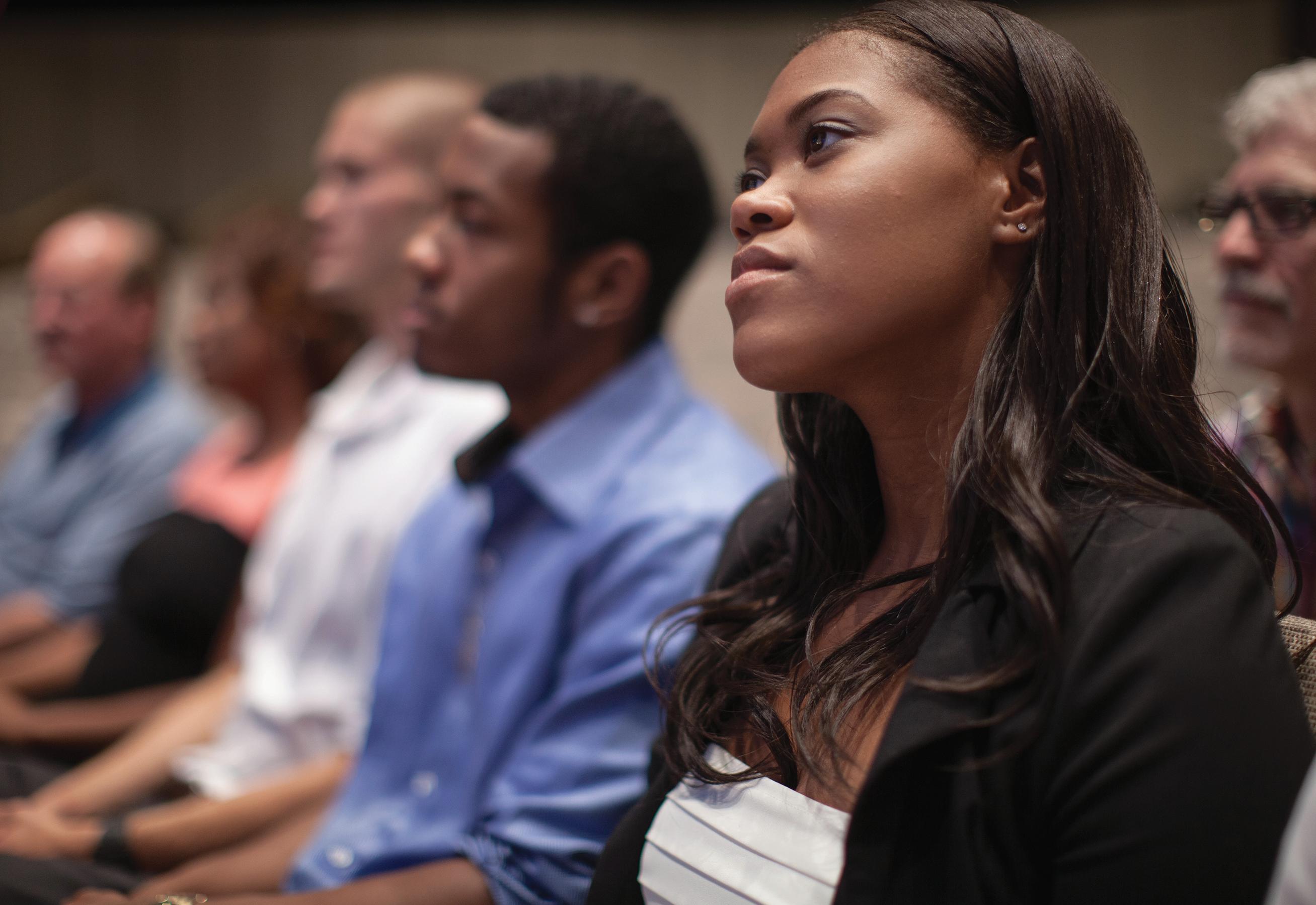
In Luke 14:12-14, Jesus said this to his host:
When you give a luncheon or dinner, do not invite your friends, your brothers or sisters, your relatives, or your rich neighbors; if you
do, they may invite you back and so you will be repaid. But when you give a banquet, invite the poor, the crippled, the lame, the blind, and you will be blessed. Although they cannot repay you, you will be repaid at the resurrection of the righteous.
Jesus not only accepted the disregarded; the disregarded were more regarded by Jesus. Yet even though he was clearly an advocate for the marginalized, so many today still feel ignored by the church because of age, race, gender, or other factors beyond their control.
Regardless of your beliefs about gender roles within the church, we must do a better job. I’m not lobbying for any church to change its theological position, but if we’re going to reach the “Jerusalem” in which we find ourselves, this cultural reality is
MARCH 2017 51
MINISTRY TODAY
Continued on next page ©Lightstock
A WOMAN’S PLACE
going to be important.
When I came to Parkview Christian Church in 1990, I was surprised to find that women were allowed to serve Communion. Pleasantly surprised. I realized it was one hill I wouldn’t need to climb. It took me about two seconds to figure out that there is no biblical role assignment for serving Communion. I had just never been at a church that had climbed out of tradition in that area.
We also had female deacons based on Phoebe in Romans 16. Again, a quick biblical study did the trick. (Actually the trick was that there was never a board of deacons in the Bible, and a deacon was really just a servant—so who cares what you call them?)
Have you done a study on the role of women? Or does your church just do things the way they do because they’ve always done them that way?
Proactive
I believe the church needs to be proactive on behalf of the disregarded at all times. Depending on your demographics, your church may not be able to accomplish much regarding racial or socioeconomic or political reconciliation. But that


doesn’t mean we shouldn’t be proactive about inclusion in every way we can.
At least half of your church members are female. What could you do to make them feel more valued?
Was the apostle Junia in Romans 16 a woman? I think that’s likely. What about
its own position on scriptural headship, and I’m not advocating for a specific view. Though we have many women in director roles on our staff, we haven’t spent enough time on this issue. I just know that many women are hurting from what they feel is a backward slide in the way their country values them. The church must step up.
As the Bible says, “There is neither Jew nor Gentile, neither slave nor free, nor is there male and female, for you are all one in Christ Jesus” (Galatians 3:28).
Deborah, Miriam, Huldah, Dorcas, and Lydia and the roles they played?
My daughter works on the staff of a church outside our movement where she feels very empowered, even though this church believes strongly in male eldership. The reason is that her church actually has a theological position on gender roles, and yet a strong sense of inclusion in all other areas. Our church has the same theological position, but I wonder if she’d feel as valued working for me.
Every church needs to come up with
GOOD FUNERALS & NEIGHBORS, TROUBLED TIMES
Continued from page 50
don’t know anybody with a guest room. But we spent a week there while Joy took a painting class. To get a better “feel” for the city, I picked up A Tale of Two Cities. It’s not Dickens at his best, but it’s good enough to still be in print after more than a century and a half.
Set in these two cities, London and Paris, in the years leading up to and during the French Revolution (1780–90s), the novel depicts the desperation of France’s lower classes, trampled beneath the heartless aristocracy—and also depicts the heartlessness of these same peasants, now victorious revolutionaries. This must not have been easy reading for Dickens’s fellow Englishmen, as he draws many parallels between the

evils perpetrated on French soil and those rampant at the time in England.
But there is light in the darkness, light personified in Lucy Manette and her gentle physician father, her husband Charles Darnay, their flawed but ultimately heroic friend Sydney Carton, and Jarvis Lorry, the dedicated bank officer whose devotion to business does not overrule his compassion. There are also the villains, of course, most particularly the infamous Defarges who are as bad as the others are good.
As always with Dickens, his characters are really caricatures. And as always, they are unforgettable.
You can’t forget the novel’s opening lines, either: “It was the best of times, it was the worst of times, it was the age of wisdom, it was the age of foolishness, it was the epoch of belief, it was the epoch of incredulity, it was the season of Light, it was the season of Darkness. . . .” These could be the opening words of a novel set in our own times,
When the Holy Spirit descended upon the first Christians at Pentecost, Peter drew from the words of the prophet Joel to describe what had happened, saying, “Your sons and daughters will prophesy, . . . Even on my servants, both men and women, I will pour out my Spirit in those days, and they will prophesy” (Acts 2:17, 18).
Will you let them?
couldn’t they?
Neither can you forget the novel’s conclusion, when the guillotine looms for Sydney Carton. He is preparing to die to save his friend’s life. He has at last found meaning in personal sacrifice: “It is a far, far better thing that I do, than I have ever done; it is a far, far better rest that I go to than I have ever known.”
Between the novel’s opening and closing lines is told the tale of two cities in tumult, with all the blood and thunder and deception and violence and kindness and courage and sacrifice that characterize all of history’s turning points. Including our own.
52 CHRISTIAN STANDARD
Tim Harlow serves as senior pastor with Parkview Christian Church, Orland Park, Illinois.
Continued from previous page
Many women are hurting from what they feel is a backward slide in the way their country values them.
LeRoy Lawson serves as international consultant with CMF International.
Where Has All the Shopping Gone?
BY JOE BOYD
Traditional retail is struggling. What might this mean to local churches in the United States?
A giant of the American economy is slowly dying. You may not notice it yet because giants die at such a sluggish pace.
Traditional American department stores are struggling. Over the last year Macy’s has closed nearly 100 stores and laid off 10,000 employees. Sears is also closing more than 100 stores after a 2016 holiday shopping season that dropped more than 12 percent from 2015. Kohl’s closed 18 stores and laid off more than 1,500 people in 2016.

This isn’t Forbes or the The Wall Street Journal, so I won’t continue to throw numbers at you, but the picture isn’t any prettier for J.C. Penney or Dillard’s.
Economists seem to agree that the bulk of the problem these large companies are facing is directly related to major cultural shifts over the last decade. It seems right to conclude that the church could have quite a bit to learn from this new economic reality. Let’s look more closely at why these big department store chains are suffering.
The Rise of Online Shopping
According to Giselle Abramovich of CMO.com, more than two-thirds of Americans who are 50 and older now shop online. This isn’t just a generational thing. The way we buy stuff is dramatically shifting. Walmart, the goliath of “big box” stores, now says that more than 25 percent of its revenue comes through online sales.
Here’s the simple, difficult truth that the retail sector is facing in 2017: The days when Americans would go into a local department store to buy what they need are fading into history.
What does this have to do with the church? A lot. We cannot afford to be Montgomery Ward, which shuttered
its stores in 2001. We cannot assume that people will continue to be in the habit of waking up every Sunday morning and driving to a building to be the church. Church is happening online all
We cannot assume that people will continue to be in the habit of waking up every Sunday morning and driving to a building to be the church.
the time. People are sharing, praying, learning, and loving across this tool called the World Wide Web. We must embrace it.
I think this goes way beyond posting our church services online and having a Twitter feed. To survive in the future, we need to go well beyond just showing the church service or advertising the church
online, we must be the church online—as well as offline.
The Rise of Small and Local Shopping
Ready for the ironic juxtaposition? Another threat to big department stores is the rising popularity of smaller, niche stores that cater to specific consumer interests. People are generally less interested in going to one place that has everything, but they are more interested in going someplace that does one or two things really well. If people are going to go shopping offline in the “real world,” they want to go somewhere unique and interesting.
For a few decades now the general strategy in our churches has been to try to appeal to as many people as possible through various ministries, musical styles, etc. One could make a convincing argument that in the emerging culture we need more churches willing to think small and local.
MARCH 2017 53 CULTURE WATCH
Continued on next page
©Courtesy of Wikimedia Commons
WHERE HAS ALL THE SHOPPING GONE?
Continued from previous page
My prediction is that over the next 20 years we will see a greater desire for neighborhood churches, especially in more urban areas. This doesn’t mean there won’t be a place for regional megachurches. I think there always will be. It just means that as we continue to follow Paul’s example in becoming all things to all people, we may find ourselves at times thinking smaller and not bigger.
The Rise of Urbanization and Suburban Flight
A third reason for this economic shift is related to where the traditional

customers of stores, such as Dillard’s or Sears, are now choosing to live. The suburbs are still alive in America, but more and more young adults and empty nesters are opting for an urban lifestyle. This all but removes the traditional shopping mall and its anchor stores from a top-ofmind activity.
The world is moving to cities. This has been clear for more than a century now. This reality should prompt the church and her leaders to seriously consider how they will address the growing urban populations in their nearest city. I believe the future of church planting is urban.
The larger and more influential suburban churches must be willing to look to their downtown as a mission field. Thankfully, this is already happening in many of our churches.
One thing we know for sure. Culture always shifts. The gospel does not.
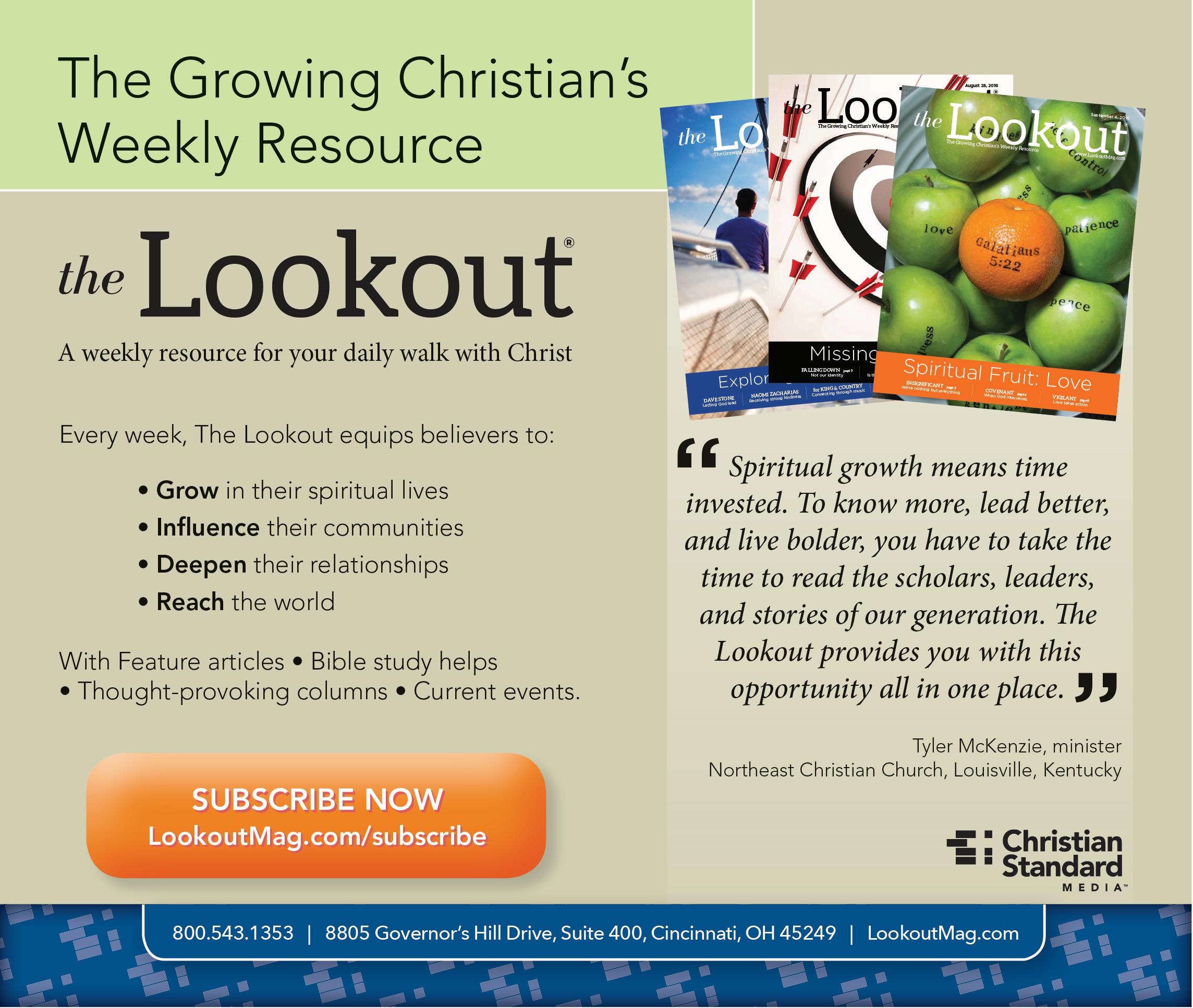
54 CHRISTIAN STANDARD
Joe Boyd is founder and president of Rebel Pilgrim Productions, Cincinnati, Ohio.
PREACHING
The Best Sermon I’ve Ever Heard
BY
David Springer grew up as a preacher’s kid in Mount Vernon, Ohio, with his four siblings and parents, Ken and Mel Springer. He graduated from Johnson University, Knoxville, Tennessee, in 2011. He met his wife, Brittany, their freshman year at Johnson. He serves as associate minister for youth with Northside Christian Church in Georgetown, Kentucky. Brittany and David have two children, Lyla and Landry.
David’s Best Sermon: The best sermon I have ever heard for youth was by Jeff Walling, director of the Youth Leadership Initiative at Pepperdine University, Malibu, California. The sermon can be viewed on YouTube via this link, http://bit.ly/2hX08Om.
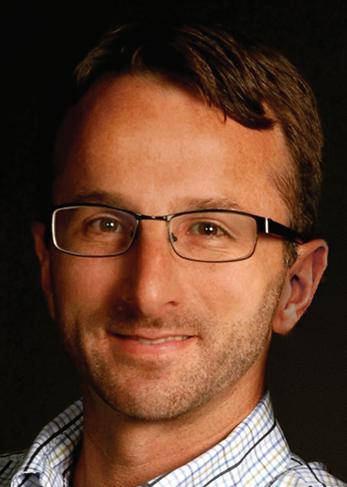
Why David likes this sermon: “Walling preached this sermon to nearly 5,000 students at the Tennessee Christian Teen Convention in Gatlinburg. Walling’s ability to grab the attention of every one of the students was incredible. His stories, humor, and biblical teaching came together for a sermon my students and I will not forget. My favorite part was watching my students respond to his challenge. As a youth minister, I find nothing more exciting than seeing young people make a decision to follow the Lord.”
Stanley N. Helton
Stanley N. Helton became a Christian some years after a woman invited Stan and his brother to a VBS at the Church of Christ in the small Oklahoma town where they grew up. Stan now serves as president of Alberta Bible College in Calgary. He is married to Patricia Aguilar Helton, and they have one married daughter, Rachel.
Stan’s Best Sermon: The best sermon I’ve heard on discipleship is by Randy Harris, instructor of Bible in the College of Biblical Studies, Abilene (Texas) Christian University. You can watch the sermon at https://youtube/yEOi4LY4hfs.

Why Stan likes this sermon: “This sermon challenges the North American church to respond to the gospel of Jesus.”
[Note: Randy Harris will be keynote speaker at Alberta Bible College’s Summit, May 8–10. For more information, see www. wcleadership.ca/].
Scott Smith

Scott Smith is a full-time online student at Liberty University, Lynchburg, Virginia, and plans to graduate this May with a bachelor’s degree in biblical and theological studies. He plans to serve in a church where God calls him and his wife. Scott was called to the ministry five years ago. He currently serves as a neighborhood leader, drummer, and leader at Westside Christian Church in Jacksonville, Florida. He looks forward to the challenges of ministry and the walk that God has in store for him.
Scott’s Best Sermon: “God’s Will vs. Your Will” by Chad Walters at Westside Christian Church is one of the best sermons on God’s will that I have heard. Listen to it at http://bit.ly/2gTFIIa.

Why Scott likes this sermon: “Chad uses a lot of personal interaction and personal stories to help people understand that it doesn’t matter what God’s will is for their life. It only matters that he has a will for their life. He makes sure that people understand if God is not with them, then it’s pointless to worry about God’s will for their life . . . because they don’t have a personal relationship with God.”
Brian Jennings
Brian Jennings and his wife, Beth, live in Tulsa, Oklahoma, with their four children. Brian preaches at Highland Park Christian Church and serves on the board of Blackbox International. He’s a regular contributor to Christian Standard and The Lookout magazines. You can purchase his book, Lead Your Family, and read his blog at www.brianjenningsblog.com.
Brian’s Best Sermon: The best sermon I’ve heard on life and death is from Dr. E. V. Hill at his wife’s funeral. It’s about 20 minutes of pure gold. The sermon is on YouTube in two parts: www.youtube.com/watch?v=TWZyV6LMK0 and www.youtube.com/ watch?v=_aDru4DSevE
Why Brian likes this sermon: “It’s emotional, bound to the text (Job 1:21), oozing with practical application, funny, and respectful of the situation. I have my preaching mentorship students listen to it and outline it on day two of our time together.”
MARCH 2017 55
Arron Chambers, a Christian standard contributing editor, serves as lead minister with Journey Christian Church, Greeley, Colorado.
David Springer
These Christian leaders tell about sermons you might like to hear too.
ARRON CHAMBERS
“As a youth minister, I find nothing more exciting than seeing young people make a decision to follow the Lord.”
IN OPINIONS, LIBERTY Uphold the Cause
BY T.R. ROBERTSON
This past fall, during the heat of the presidential campaign, yet another political link appeared on my Facebook feed. The gist of the headline was that Muslims were threatening to leave the United States in protest. Typical clickbait—it didn’t tempt me to keep reading for the details.
But I did notice the comments from people on Facebook, most of whom probably didn’t read beyond the headline either:
“Good-bye!” “Thank the Lord!” “I’ll certainly pray for that to happen.” “Good idea.”
I clicked on the names of the people who left the more “religious” comments. One person had several posts about sharing the gospel. Another posted frequently about having taken in foster children. Yet another was an active volunteer at an interracial congregation that helps the needy.
They were all active, servant-hearted Christians.
So why the lack of compassion for one specific people group?
Upholding God’s Cause
He is the Maker of heaven and earth, the sea, and everything in them—he remains faithful forever.
He upholds the cause of the oppressed and gives food to the hungry.
The Lord sets prisoners free, the Lord gives sight to the blind,
the Lord lifts up those who are bowed down, the Lord loves the righteous.
The Lord watches over the foreigner and sustains the fatherless and the widow, but he frustrates the ways of the wicked (Psalm 146:69).
If God upholds the cause of the oppressed, the hungry, prisoners, and the rest, it makes sense Christians would do the same. And yet, every one of those groups listed by the psalmist (and by Jesus in Matthew 25) can prompt strong political reactions among some believers.
Some will read “the oppressed” and im-
mediately think of racial profiling and the familiar sight of protestors reminding us that “Black Lives Matter.” Others counter with “All Lives Matter,” a phrase black people hear as dismissive, not inclusive. Still others think about how Christians are oppressed by an increasingly liberal culture. Others read “gives food to the hungry” and their opinions about food stamps and panhandlers come to mind. Why don’t those people just get a job?
As someone who has tried to recruit helpers for prison ministry, I’ve learned firsthand that some otherwise compassionate Christians react negatively to the idea of helping “prisoners.” You really can’t trust those people. They deserve whatever difficulties prison brings them.
most often by their interactions with immigrants, by friends and family, and by the media.
The research showed 47 percent of the Evangelicals polled said they either don’t know or are unsure what the Bible teaches about how immigrants should be treated.
Polls have shown similar data about the basis of Evangelicals’ opinions on other social issues.
Even when the Scriptures are abundantly clear, such as when the psalmist says God upholds the cause of the oppressed, the hungry, and the foreigner, Christians still tend to base their opinions on other factors.
Many nonreligious Americans stand for absolute separation of religious beliefs from politics. They criticize Evangelicals for intermingling the two.
Based on the data, it appears we’re actually doing a pretty good job of paying little attention to our religious teachings when we make up our minds politically.
Could it be we’ve forgotten or misunderstood who we are?
the same.
The psalmist’s mention of the “foreigner” can prompt a wide range of political opinions about immigrants and refugees. Those Facebook comments encouraging Muslims to leave America were relatively tame compared to many of the antiimmigrant posts and tweets I’ve seen.
What happens when biblical teachings and political platforms go head-to-head? Too often, the political shoulders aside the spiritual.
Recent polling by Lifeway Research shows most Christians don’t base their opinions about refugees and immigrants on the Bible.1 When asked to list the top influences on their opinions about immigration, only 12 percent of Evangelicals listed the Bible, while 2 percent listed the church. Respondents were influenced
Who We Are
I could choose to see myself as a partisan, a member of the Evangelical voting bloc. Or maybe as one of the minority who are “conservative” in theology but “progressive” in politics.
Either way, I should take note that Psalm 146 warns against putting our trust in political leaders and their platforms.
Do not put your trust in princes, in human beings, who cannot save.
When their spirit departs, they return to the ground; on that very day their plans come to nothing.
Blessed are those whose help is the God of Jacob, whose hope is in the Lord their God (Psalm 146:3-5).
No less than one of every six psalms speaks about the importance of relying on the King of kings rather than the
56 CHRISTIAN STANDARD
When I identify myself with the outcasts of society that too many condemn or ignore, I am prepared to serve them in a way that pleases God.
If God upholds the cause of the oppressed, the hungry, prisoners, and the rest, it makes sense Christians would do
kings of the nations. Many of the blessings the psalms promise are a direct result of choosing the Lord’s priorities over the weak promises of politics.
The church’s most serious problem today is not that we’re aliens in the 21stcentury American culture. It’s that we believe we can share the same kind of politically charged identities as the nonbelievers around us. We’ve painted a religious veneer over our self-image, but we’re not much different than the rest of the world.
We believe we are politically active Christians and love our neighbors, but only as long as they fit into our political comfort zone.
The alternative is to choose to see myself as God sees me, in fellowship with those mentioned in Psalm 146.
I am the oppressed.
The trend in American culture is indeed toward marginalizing and limiting the rights of religious people to act on their consciences. I could react to this op-
pression by championing the protection of religious rights and freedoms as my number one priority. And yet, I understand that Christ promised we will always be persecuted. Why should I expect the government to guarantee freedom from something Jesus has promised?
Whatever my political stance on the subject, being oppressed should move me to identify with others who are oppressed. I sometimes disagree with the methods and rhetoric of some who are protesting oppression, but I’ll defend their freedom to do so. And I’ll still feel empathy with them, weeping with those who weep.

I am the hungry.
Whatever the level of my wealth and access to food and possessions, I owe it all to the God who provides. We’re warned against identifying ourselves among the rich in this world, as though we were selfmade people.
I’ll empathize with people who are truly struggling to feed themselves and their families. I may have strong opinions about government subsidies and I might have definite ideas about handing out cash to panhandlers. But that won’t stop me from compassionately and constructively helping the poor.
I am the prisoner.
The grace of God has released me from the chains of sin, and yet somehow I keep finding myself entangled in them. This helps me see people who are physically incarcerated as fellow lawbreakers, struggling to walk the line. No matter what my opinions might be about the American justice system, I’ll gladly uphold the cause of my fellow prisoners.
I’m often blind to the needs of people around me, fixated solely on my own priorities.
I’m regularly bowed down under the weight of the mistakes I’ve made.
I am the righteous, but only because I
MARCH 2017 57
Continued on next page
©Lightstock
UPHOLD THE CAUSE

Continued from previous page
wear Christ’s robe of righteousness. And I am the alien.
Scriptures describe us as sojourners, refugees, and aliens. Our biblical identity as a peculiar people and the “set-apart ones” doesn’t put us in a class above others. We’re not better because we know the King. Quite the contrary, our status carries with it the promise that we can expect to be among the outcast, the odd ones, and the oppressed.

If I believe I’m an alien, I won’t easily choose political options aimed at protecting my own status, whether legal, financial, or societal. I have no status, other than that of a pilgrim temporarily on mission in a foreign land, looking forward to going home.
My alienated status will lead me to identify with others who are strangers in my adopted country. Whatever my opinions about the legal and political issues surrounding immigrants and refugees, I’ll choose to show them kindness and to uphold their cause along with the Lord.
If I choose to believe I’m among “the least of these,” it will change the way I ap-
proach political issues.

I’m still likely to have opinions about illegal aliens, refugees, prisoners, poor people, protesters, and whatever other groups are in the trending news of the day.
But as a fellow sufferer, I’ll also look past those hot topics to see the individuals who are suffering because of those situations. I can disagree with a protestor’s tactics and still be willing to stand beside him and share his pain. It’s possible to have reservations about the government’s immigration policies and still be proactive in caring for the suffering people we’ve labeled as refugees and illegals.
Stand up for your beliefs. Freely vote your opinions.
And, above all, uphold the cause of your fellow sufferers.
¹Lifeway Research, “Evangelical Views on Racism,” February 2015; accessed at http://lifewayresearch.com/ wp-content/uploads/2015/03/Evangelical-Views-onImmigration-Report.pdf.
58 CHRISTIAN STANDARD
T. R. Robertson is a freelance writer residing in Columbia, Missouri.
“Before we pray for God’s will, let’s take a few minutes to specify exactly what we want that to look like.”
Our status carries with it the promise that we can expect to be among the outcast, the odd ones, and the oppressed.




Something wonderful has happened to the magazine you’re holding . . . Download your free Christian Standard app today! More than a magazine. Your gateway to a whole new Christian Standard experience. Get your FREE Christian Standard app TODAY! www.christianstandard.com Ongoing subscriptions to digital editions of Christian Standard are only $2.99 for one issue, $9.99 for six months (plus a seventh free issue!) $14.99 for a year (plus a 13th free issue!)
best practices
COMPILED BY MICHAEL C. MACK
How Social Media Is Hurting Your Ministry

“Are we willing to quit social media (and other distractions) if the temptations are too strong . . . to overcome?” Brian Jones asks this question on Senior Pastor Central (www.seniorpastorcentral. com). Jones says for years he was convinced that switching from the study of God’s Word and sermon preparation to distractions such as checking social media, text, or e-mails didn’t hurt him at all. After reading Deep Work by Cal Newport, however, he says he better understands the costs.
Newport warns about what he calls “attention residue,” the lingering effects from switching back and forth between tasks, which keeps us from engaging in “deep work.” Newport writes: “To produce at your peak level you need to work for extended periods with full concentration on a single task free from distraction. Put another way, the type of work that optimizes your performance is deep work.”
Jones says he continues to wrestle with this quote from Deep Work: “Great creative minds think like artists but work like accountants.” In other words, teachers and others in ministry may need to go to extreme measures, the kinds accountants take
day in and day out—measures, such as not checking e-mails, texts, or any social media while studying and writing a sermon.
“Are we willing to ‘crucify’ whatever it is that pulls us away from God’s Word?” asks Jones. He says he is “seriously weighing whether social media is a worthwhile investment of my time versus the allure it holds for me as it pertains to staying focused on sermon writing.” It comes down to reflecting on what power social media and other distractions have on us. Jones says the jury is still out for him, but social media is certainly on the table for discussion: “Is it worth abandoning all together? Can I use it once a week? Once a month?”
Jones suggests doing a cost/benefit analysis of whatever you go to for a “quick fix” during sermon or lesson preparation. “Are we willing to go to extreme measures to create the space necessary to allow God to speak to us?”
Read more on Senior Pastor Central: www.seniorpastorcentral .com/2847/senior-pastors-quit-social-media.
60 CHRISTIAN STANDARD
3 Reasons People Are Leaving Your Church (and What You Can Do About It)

“As a staff, we were tired of the revolving door,” says Erik Reed, pastor of The Journey Church in Lebanon, Tennessee. “We were working too hard to reach people only to lose them.” In an article for LifeWay Pastors (www.lifeway.com/pastors), Reed discusses three reasons he and his staff pinpointed for losing people out the back door:
1. They don’t feel connected. “Folks attending your church need to eventually hear some people call them by name,” Reed says. Great preaching and worship may attract people to your church, but it will not keep them. So think about next steps. The Journey Church holds a 10-minute Next Steps gathering after each service at which Reed shares the church vision and outlines possible next steps, either
serving on a team or joining a small group.
2. They don’t feel wanted or needed. “When people believe the ministry needs in your church are ‘taken care of’ or full, they will leave,” says Reed. People have an inherent need to make a difference. The church’s job is to help them find a place to do that. The Journey Church constantly communicates the next step of serving in a ministry according to their need and passion.
3. They don’t feel moved to grow spiritually. “People are prone to ruts,” Reed says. “Drifting into ditches is our natural gravitation due to our hearts being out of alignment. Our faith must be cultivated daily or it wanes. As pastors and leaders, that means
we cannot assume people are growing.” Leaders at The Journey Church regularly ask three vital questions:
• How does the unbeliever learn the gospel at TJC?
• How does the new believer learn the basics?
• What resources or opportunities are we providing to mature and deepen believers?
While people may leave your church for other reasons, church leaders are responsible for these three. Meet with your leadership team(s) to discuss systems, strategies, and plans for monitoring them.
10 Atypical Places to Use Church Greeters
If you’re like most congregations, greeters welcome church attendees as they enter your main building doors. Trained greeters can be used in at least 10 other places as well, says Chuck Lawless, professor of evangelism and missions and dean of graduate studies at Southeastern Baptist Theological Seminary, Wake Forest, North Carolina. In an article in Facts & Trends (www.factsandtrends.net), Lawless suggests these locations:
1. Near parking lot entrances. These greeters may serve a dual role of also directing traffic, but be sure they know they are the first to warmly greet people as they arrive.
2. Throughout the parking lot. While carefully maintaining boundaries, they can assist people who need it, provide umbrellas on rainy days, and answer questions.
3. At a welcome center. Lawless says he has visited churches where no one was at the welcome center! First, make sure the welcome center is staffed, and second, the greeter(s) there can do much more than tell people where the bathrooms are.
4. At every major church building intersection. Yes, signage is helpful for first-time guests, but friendly people are even better!
5. At the entrance of the worship center(s). These may include student areas. While greeters may see their main function as handing out bulletins, they also offer hospitality.
6. Inside the worship center. You may already have ushers,
but the role of these “inside greeters” is simply to talk to people. Lawless says that “secret shoppers” often report that no one talked to them before the service. Recruit a person for each section where they usually sit.
7. At every churchwide fellowship gathering. A simple hello as people arrive can mean a lot, especially to someone who is lonely or hurting.
8. In each small group or class. We hope everyone greets each other, but it’s important that someone takes the responsibility of making people feel welcome as they arrive.
9. At the doors and in the parking lot after the service. A warm “thanks for joining us today” can make a huge impact and reinforce the church’s appreciation for a guest’s visit.
10. On the church website. You could use quotes or short videos from church members welcoming people to the church site. Invite them to come to the physical site for worship services as well!
MARCH 2017 61
best practices
How to Work with “KNOWLEDGE WORKERS” in Your Ministry

In today’s rapidly changing world, the most effective leaders do three things well: ask, listen, and learn. Whether they lead a church with a large number of staff or work directly with key volunteers, church leaders today must work well with “knowledge workers,” those Peter Drucker defines as people who know more about their role than their boss does.
In business talent-management circles, managing knowledge workers has become a hot topic of discussion, leading to increased training and coaching of managers in this area. “It is hard to tell people what to do and how to do it when they already know more than we do,” says global leadership thinker and coach Marshall Goldsmith (www. marshallgoldsmith.com). Church leaders work with many others who know more and are more highly gifted in a variety of ministry areas.
Research has demonstrated that leaders who consistently ask, listen, learn, and then follow up with those they manage are seen as much more effective. Along with this, leadership structure is changing. Leading across a fluid network (an “alliance structure”) is becoming more valuable
than leading from a fixed hierarchy, especially for millennials. Being able to share leadership is vital.
“In dealing with knowledge workers,” says Goldsmith, “old models of leadership will not work.” For millennials, he says, sharing leadership, bringing knowledge workers to the table so they can have a voice in decision-making, is a “must have” for them to be productive in their roles.
The business world is learning things today that the Bible has communicated for centuries:
• View staff members or volunteers as partners, not underlings (John 15:15; Philippians 1:5; 2 Corinthians 8:23).
• Lead out of humility (Romans 12:3; Philippians 2:3, 4).
• Appreciate each person’s unique gifts, knowledge, passion, and abilities (Romans 12:4, 5; 1 Corinthians 12:21).
• Ask the advice of your team members and listen (Proverbs 15:22).
• Don’t disregard the ideas of those who are younger, i.e., millennials (1 Timothy 4:12).
62 CHRISTIAN STANDARD
Options for Your Next Spiritual Retreat
Every leader needs to get away for an extended time once in a while to focus on God and hear from him, yet no two people will plan their time the same way, say Kevin and Karen Miller in CT Pastors’ “The State of Church Ministry in America, 2017.” The Millers suggest seven options to consider as you plan your next getaway:
1. Pray. Spend extended time praising God, confessing sins, lamenting, and thanking him.
2. Listen. Play praise songs and be attentive to how God speaks through them. Listen to nature and the quiet. Be still and know that he is God.
3. Read the Bible or any book that feeds your soul.
4. Fast. Let your physical hunger lead you to a spiritual hunger for God. Be wise with this in accordance to any medical
conditions you have and seek the counsel of a trusted Christian doctor.
5. Nap. Yes, it’s good (and it’s not cheating!) for you to rest, get some sleep, and allow your body to recover.
6. Move. Take a hike, jog, kayak, or go on a bike ride. Commune with God in his incredible creation.
7. Create. Draw, paint, write, crochet—whatever inspires you and draws you closer to God the creator.

#Ministry Tweets
“Time change weekend is coming! Come on churches, it’s time to do what we do best and spread the message of changing people’s clocks!”
—Relevant Church Guy, @MrChurchGuy
“If you want to have influence, you have to learn how to care— truly care, not pretend-care— about the interests of others.”
—@manhoodjourney
March Madness Ideas
It’s March, baby! Don’t miss all the “trifectas” and “dipsy-doo dunk-a-roos” during all those “NCAA knee-knockers”! Here are two primetime ideas for your ministry this month:
March Madness for Missions. Horizon Community Church in Highlands Ranch, Colorado (www.horizoncrc.org), offers a bracket challenge for a cause. When participants pay their sign-up fees, they write in the name of a local ministry outside of Horizon. They then fill out the designated Internet NCAA bracket in the church’s group. When the winner is announced, the local ministry selected by the bracketchallenge winner receives all the winnings as a charitable donation from the church.

Men’s Ministry March Madness Fellowship. Cornerstone Christian Fellowship in West Chester, Pennsylvania, holds a potluck event and livestreams the games on a strategic Saturday in March. The Men’s Ministry encourages guys to invite a friend, bring a snack to share, and come and go at their convenience.
Have a ministry tweet to share? Please tag @MichaelCMack, #BestPractices. We may use it in a future issue.
“Where God has given you responsibility, he has given you authority. It matters who prays. Pray for those you lead.”
—Cory Lebovitz, @cory1013
“There are a lot of people who have opinions that never bother to make a difference. Choose to make a difference.”
—@bradkochis
The Social Side of Best Practices
Discover more “best ministry practices” and share your own on our Facebook page: www.facebook.com/ChristianStandardMagazine.

“It was never Jesus’ intention that we would find our Christian life and expression through a 2 hour service once a week inside a building.”
—Caesar Kalinowski, @ CaesarKaly
“Part of being a great leader is making great leaders.”
—@SmallGroupscom
MARCH 2017 63
For the Suffering and Their Friends
BY JIM TUNE
The book of Job is mystery to me. It’s the story of immense suffering, unhelpful friends, few answers, but a great God. The more I look at the book, the more I see. It’s a book that’s so relevant to our times, for both those suffering and their friends. That’s all of us.
For those who are suffering, Job lets us know we’re not alone.
“I used to think that the book of Job is in the Bible because this story of suffering is so extreme, so rare and improbable and unusual,” says pastor and scholar Ray Ortlund. “I thought the message of the book is, ‘Look at this worst-case scenario. Now, come on. Surely in your comparatively small problems, you can find your way.’ I don’t think that anymore. Now I think the book of Job is in the Bible because this story is so common.”
Job is in the Bible because suffering is such a widespread problem. If you’re alive, you’re going to relate to Job at some point in your life.
Next month in
It’s also a book that frees us from easy answers. When we suffer, we ask questions. Job does, and his friends are quick to provide answers. When God shows up, though, he doesn’t provide answers. He provides himself.
Job isn’t a book that explains all our suffering. It’s a book that shows us what God expects from us when we suffer. He wants our trust. Explanations are nice, but we need more than explanations when we suffer. We need God himself.
Suffering is a reality in this world, and explanations are few. While it’s OK to ask questions, it’s foolish to expect we’ll find neat answers for suffering, at least until eternity.
It’s also a book about how to be a friend to those who suffer. Job’s friends started out well.
And when they saw him from a distance, they did not recognize him. And they raised their voices and wept. . . . And they sat with him on the ground seven days and seven nights, and no one spoke a word to him, for they saw that his suffering was very great (Job 2:12, 13, English Standard Version).
Why Are You So Afraid?
Longtime missionaries Aaron and Diane Lincoln are surprised about many aspects of American culture when they return home for a furlough. One of the most concerning is the fear that characterizes so much of American life. In next month’s issue, they ask, “Why are you so afraid?”
Fear can be a problem not only for individuals, but for whole churches. Jeff Faull looks at the very first church and sees a people embracing risk for the sake of

Job is a book that shows us what God expects from us when we suffer.
That’s almost a perfect playbook for how to be a friend to someone who’s suffering. Then they wrecked it all by opening their mouths. When we offer glib explanations for suffering, we do a disservice to everyone around us. Sometimes we just need to be present, sit, and mourn.

Job leaves us with some simple truths: Life is brutal. Answers are few. Be slow to speak when others are suffering. Most importantly, it teaches us that God is great and can be trusted.
I’m grateful the Bible is realistic about suffering and refuses to give us glib advice. It gives us something even better: the assurance that God is in control and that we can trust him always, even when we are suffering, and even when we don’t have the answers.
®
advancing the gospel. Can we say the same today?
Next month a dozen writers—corresponding from Uzbekistan to Indiana, from Ukraine to Florida, from Las Vegas to Kansas—tell how God worked in their lives and ministries in spite of their fear.
Be encouraged! Read our April issue, ready via our app mid-March.

64 CHRISTIAN STANDARD
A DIFFERENT TUNE
©iStock/Thinkstock

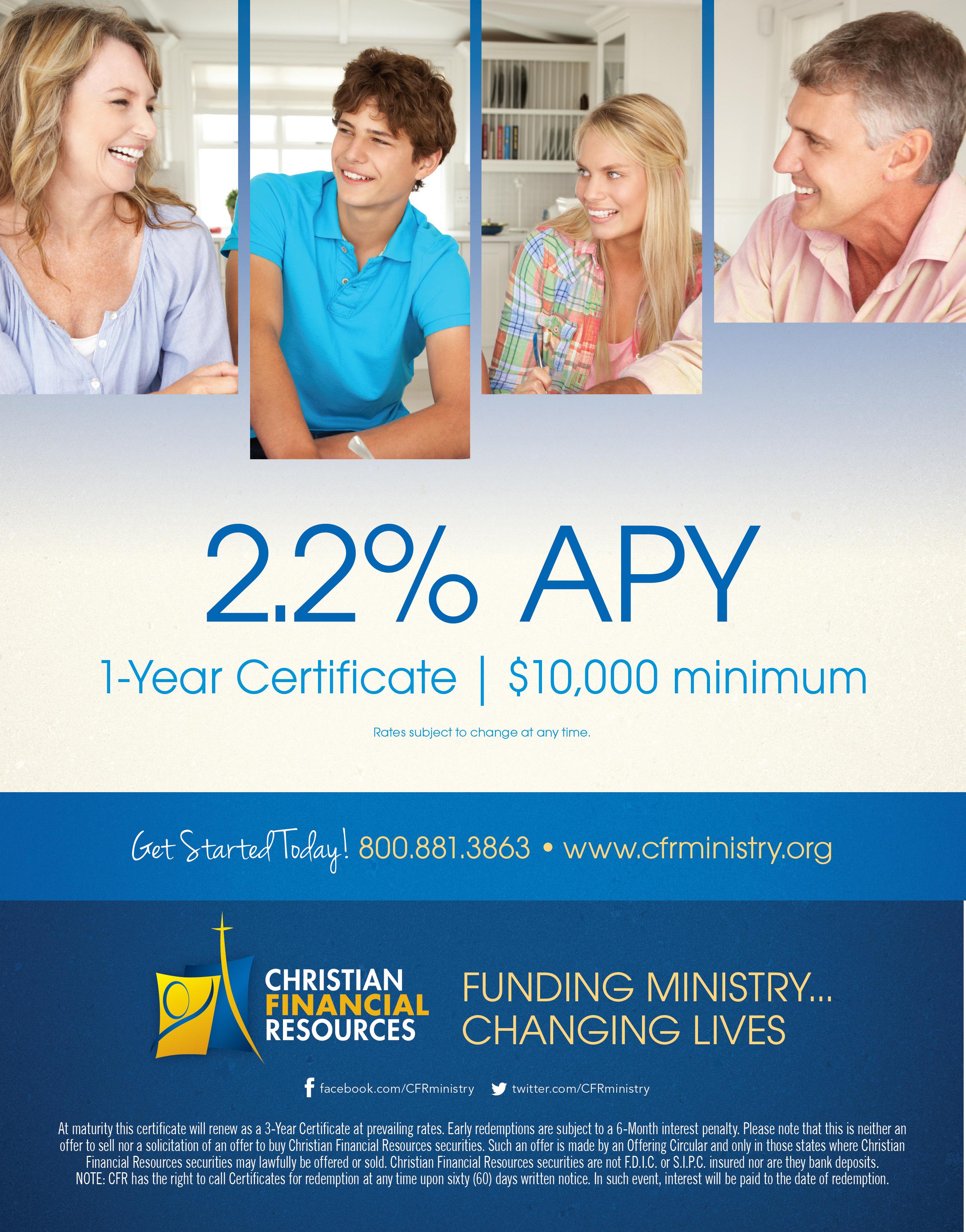


 Jim Nieman, Managing Editor
Rosemary Mitchell, Editorial Assistant
Teresa Callahan, Marketing and Advertising Manager
Jim Nieman, Managing Editor
Rosemary Mitchell, Editorial Assistant
Teresa Callahan, Marketing and Advertising Manager
 Scott A. Ryan, Design Consultant
Scott A. Ryan, Design Consultant




 By Bethany Anderson
By Gayla Congdon
By Kevin Dooley
By Bethany Anderson
By Gayla Congdon
By Kevin Dooley
 Horey
Horey

























 BY KEVIN DOOLEY
BY KEVIN DOOLEY


















 BY DANIEL SCHANTZ
BY DANIEL SCHANTZ
































 Rick Rusaw and Brian Mavis
Rick Rusaw and Brian Mavis





























